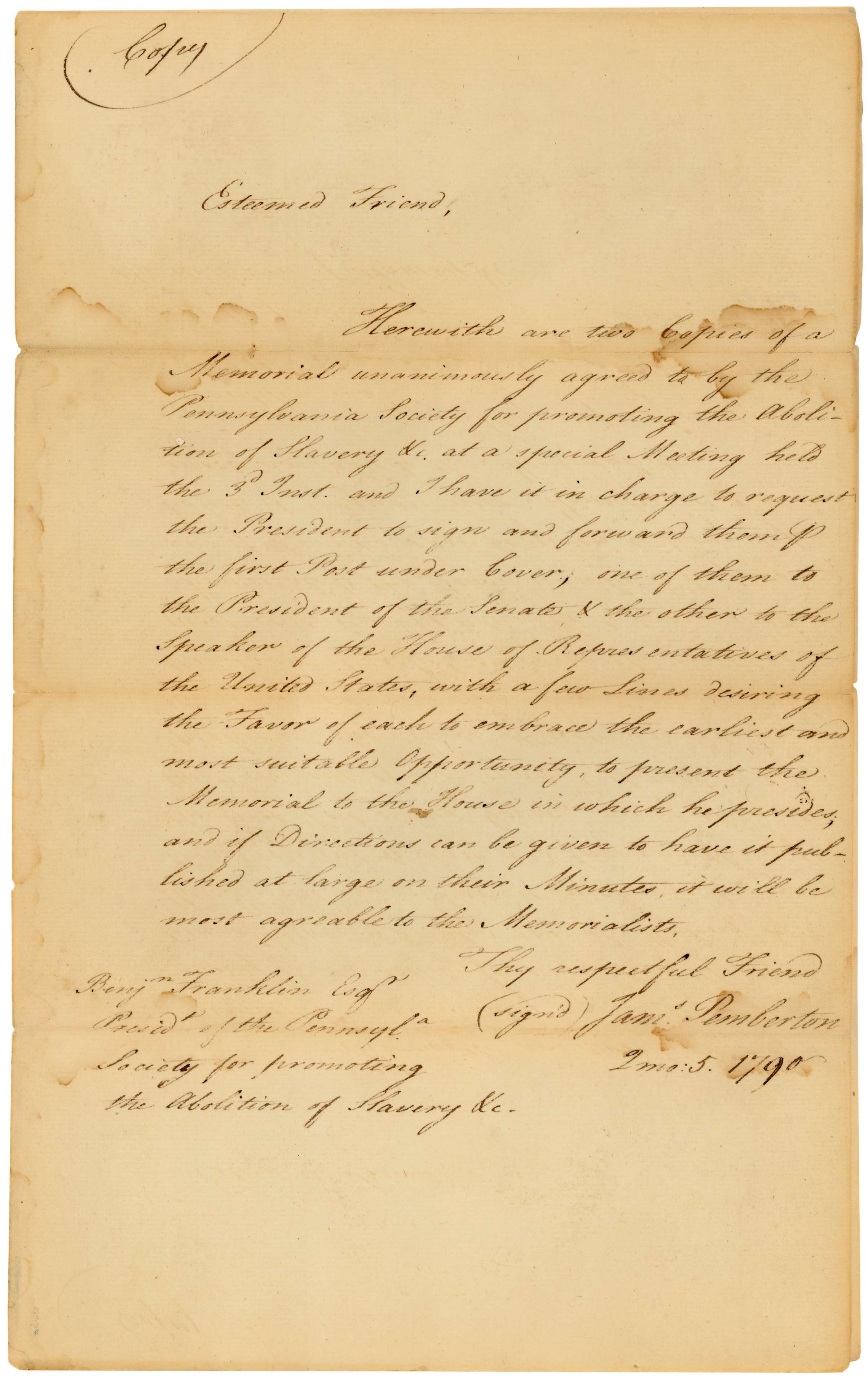Benjamin Franklin: Politician and Diplomat
Seeing the Big Picture
All documents and text associated with this activity are printed below, followed by a worksheet for student responses.Introduction
Benjamin Franklin is one of the most influential Americans of any generation. He was a scientist, inventor, entrepreneur, politician, and brilliant diplomat. Franklin was the only man who shaped all the founding documents of America.Examine each document and match it with the correct description of Franklin's contributions to the creation of the United States.
Name:
Class:
Class:
Worksheet
Benjamin Franklin: Politician and Diplomat
Seeing the Big Picture
Examine the documents and text included in this activity. Consider how each document or piece of text relates to each other and create matched pairs. Write the text or document number next to its match below. Write your conclusion response in the space provided.1
2
3
4
5
6
7
8
9
1
Activity Element
Benjamin Franklin was apponted by the Congress to serve on the committee to design a seal, emblem, or coat of arms to represent the new sovereign nation of the United States.
To learn more about the Great Seal go to - http://www.ourdocuments.gov/doc.php?doc=5
To learn more about the Great Seal go to - http://www.ourdocuments.gov/doc.php?doc=5
2
Activity Element
Benjamin Franklin was a representative to the Second Continental Congress from Pennsylvania and was a signer of the Declaration of Independence. To learn more go to -
http://www.ourdocuments.gov/doc.php?flash=true&doc=2
http://www.ourdocuments.gov/doc.php?flash=true&doc=2
3
Activity Element
Benjamin Franklin, along with John Adams and John Jay, was one of the negotiators to end the war with Great Britain. To learn more about the Treaty of Paris that ended the Revolutionary War, go to http://www.ourdocuments.gov/doc.php?doc=6
4
Activity Element
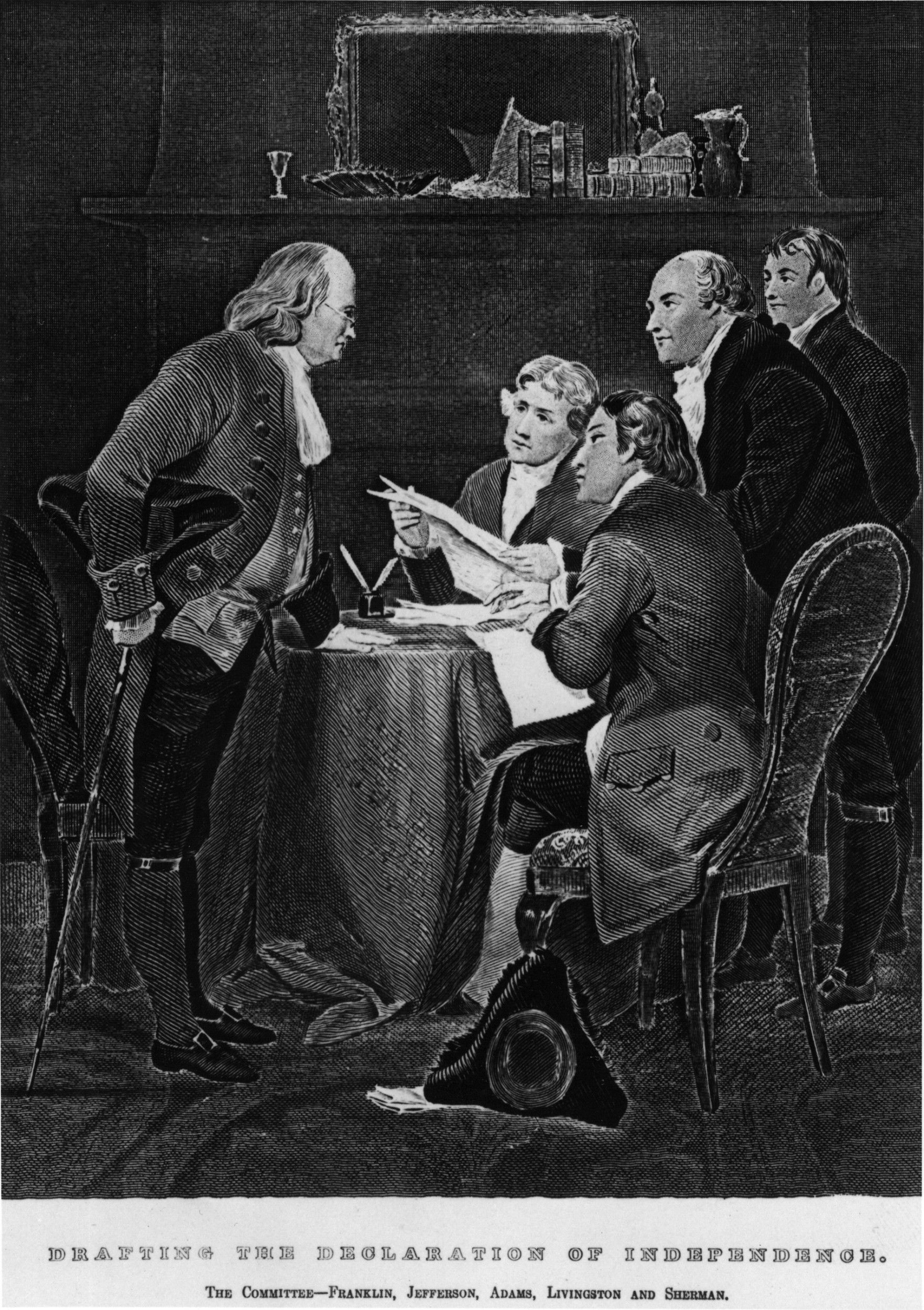
5
Activity Element
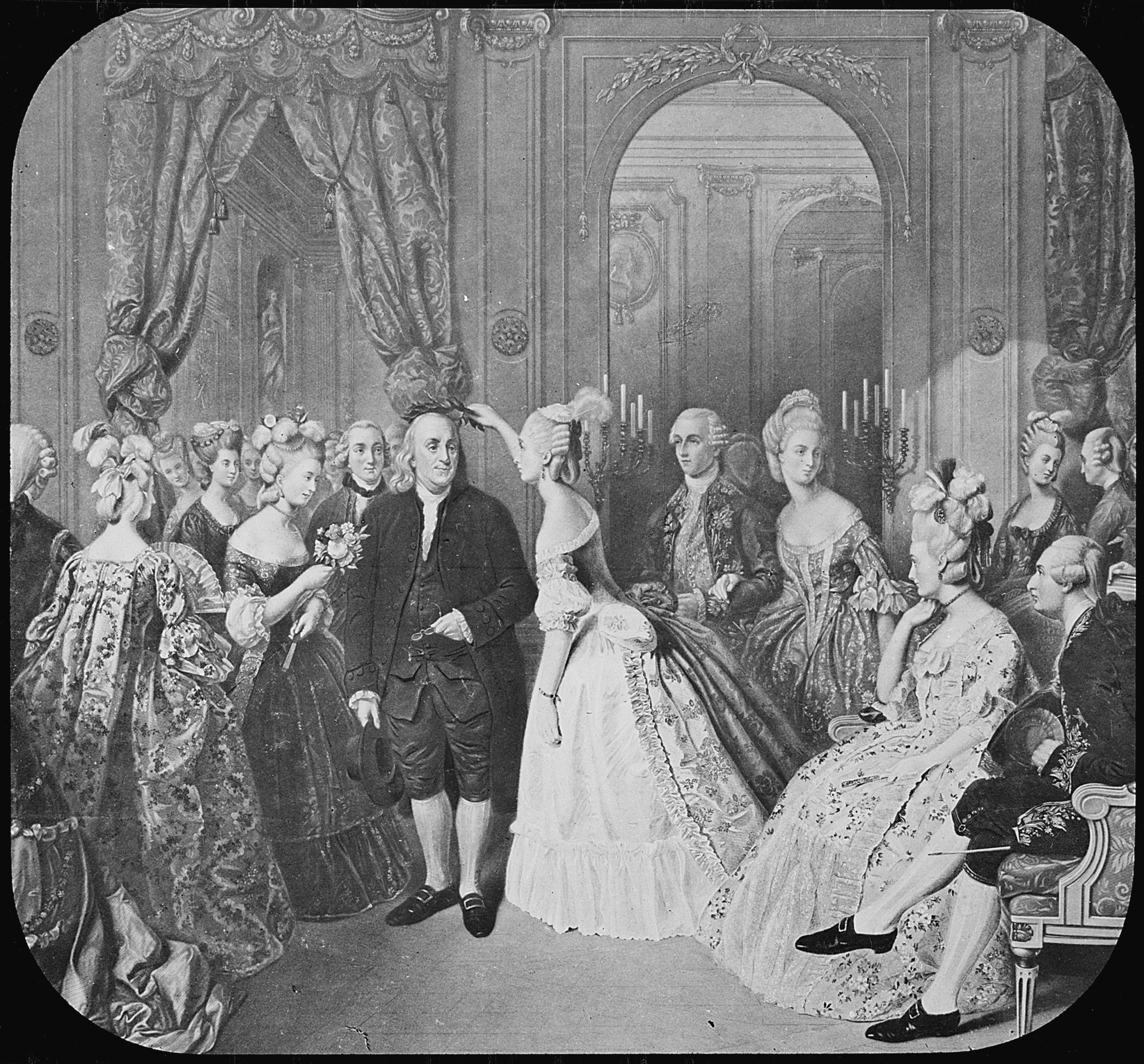
6
Activity Element
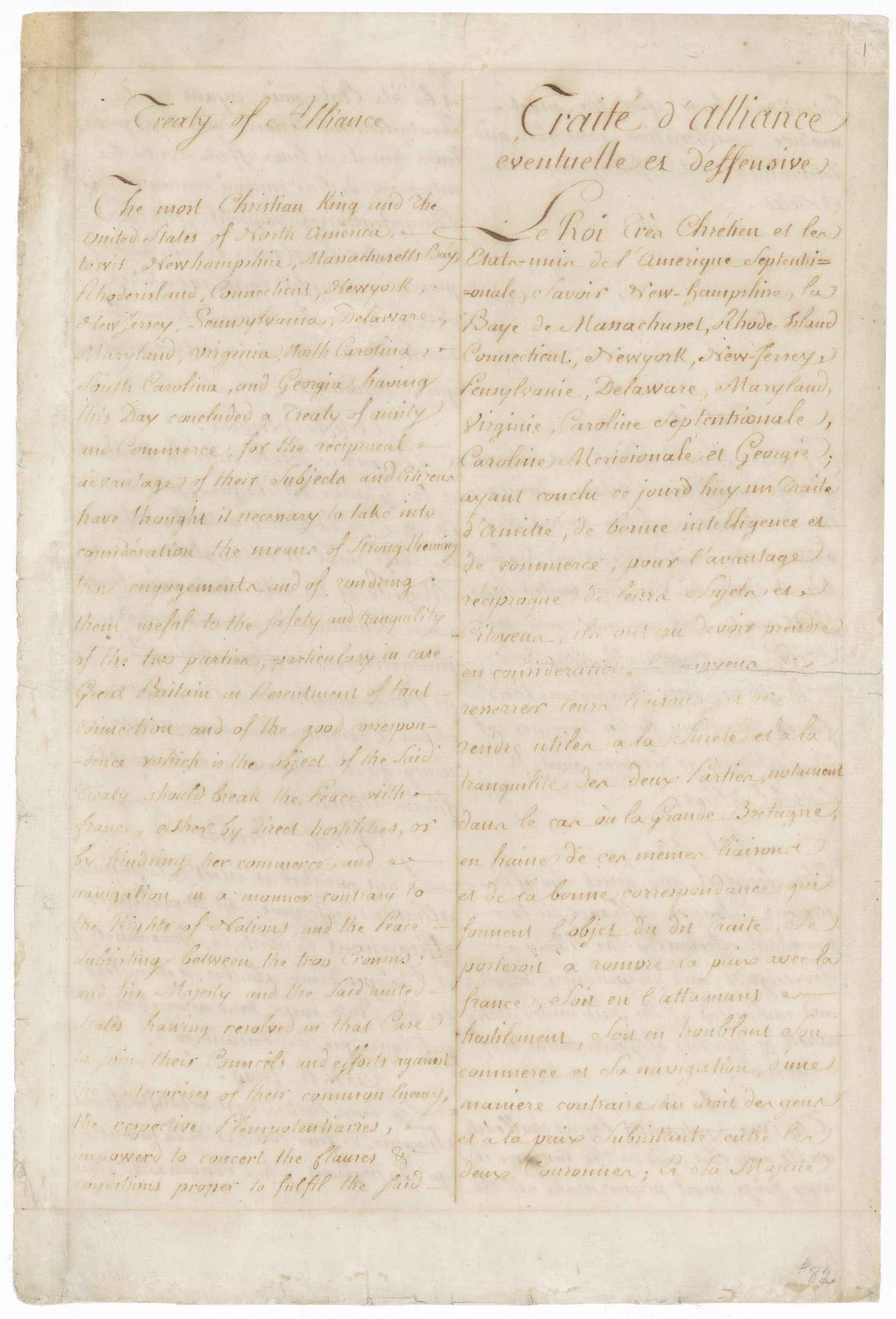
7
Activity Element
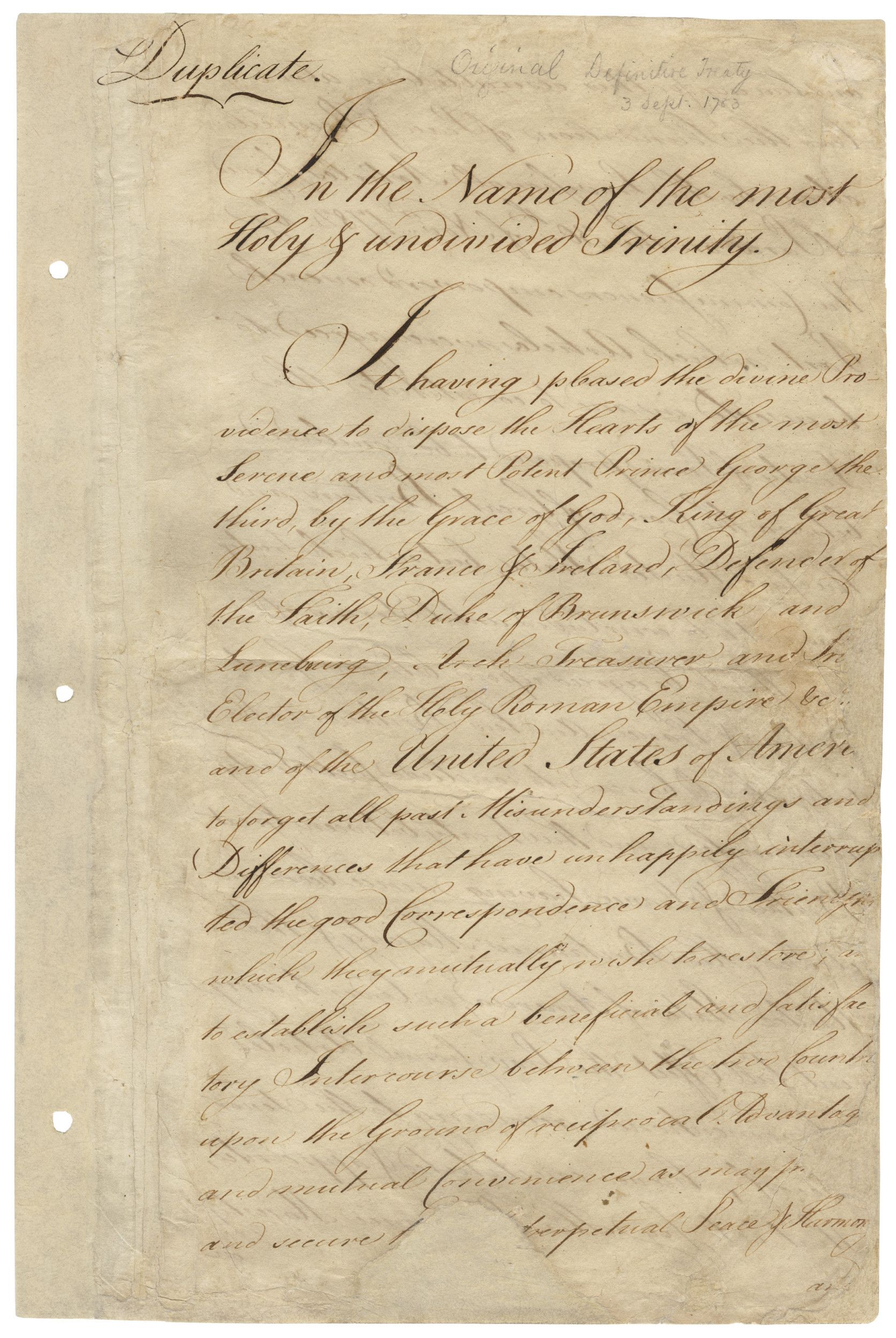
8
Activity Element
Benjamin Franklin remained active in poltics until the end of his life. In 1790, the year he died, Franklin wrote a letter to Vice President John Adams transmitting a petition from the Society for the Abolition of Slavery requesting the immediate abolition of slave trade.
9
Activity Element

10
Activity Element
Benjamin Franklin was a member of the Committee of Five that wrote the first draft of the Declaration of Independence. Jefferson's draft of the Declaration of Independence read: We hold these truths to be sacred & undeniable... Franklin edited Jefferson's draft to read: We hold these truths to be self-evident... To learn more go to
http://www.archives.gov/exhibits/charters/declaration_history.html
http://www.archives.gov/exhibits/charters/declaration_history.html
11
Activity Element
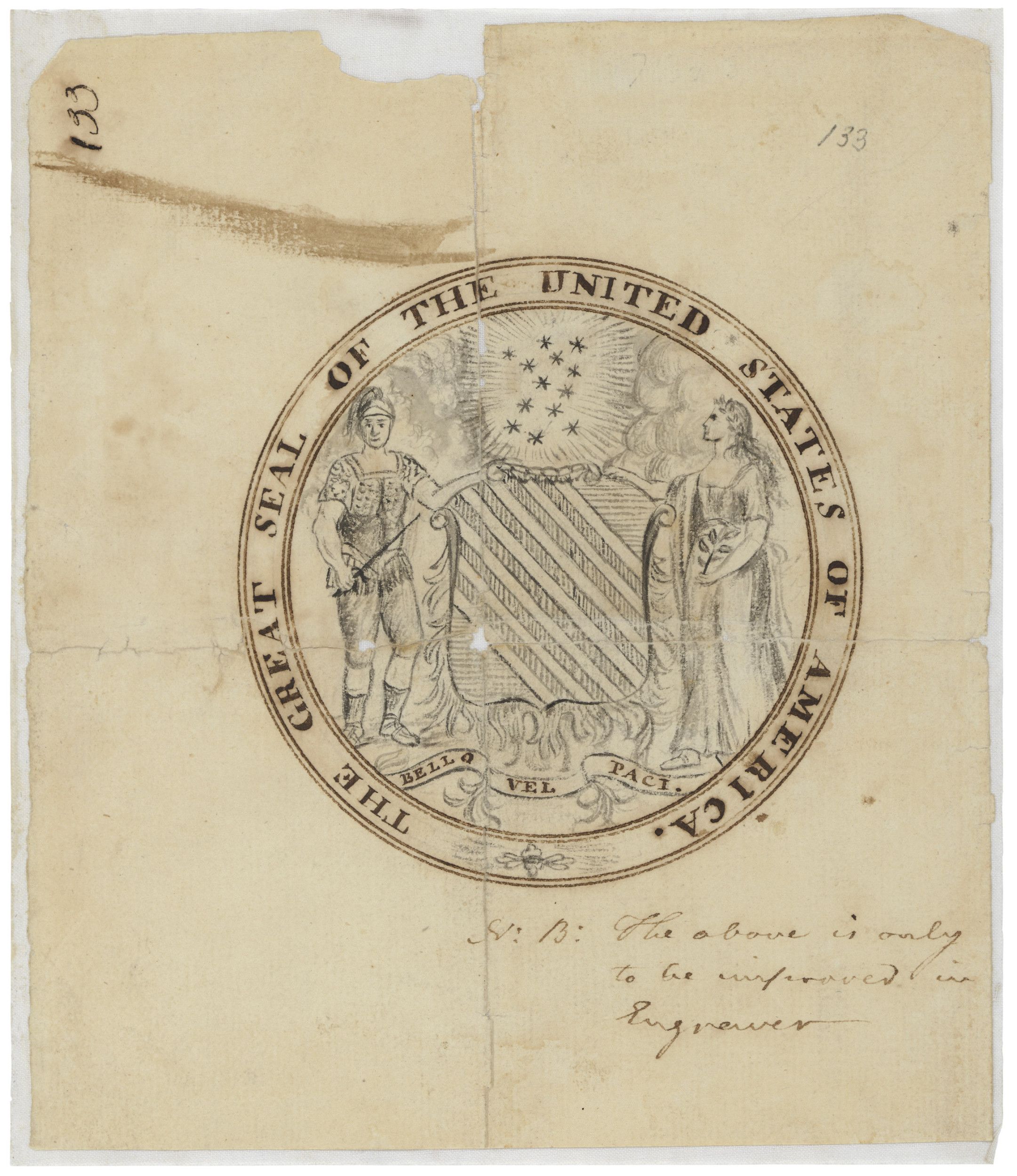
12
Activity Element
Messages in secret code traveled across the Atlantic between the peace commissioners and Congress throughout the Revolutionary War. Ciphers like this were used to decode the messages. Each delegate had his own cipher to decode messages.
13
Activity Element
Benjamin Franklin arrived in Paris, France in December, 1776 as the first ambassador from the United States to a foreign nation. Franklin charmed the aristocracy of France with his incredible intellect and humble style of clothing.
14
Activity Element
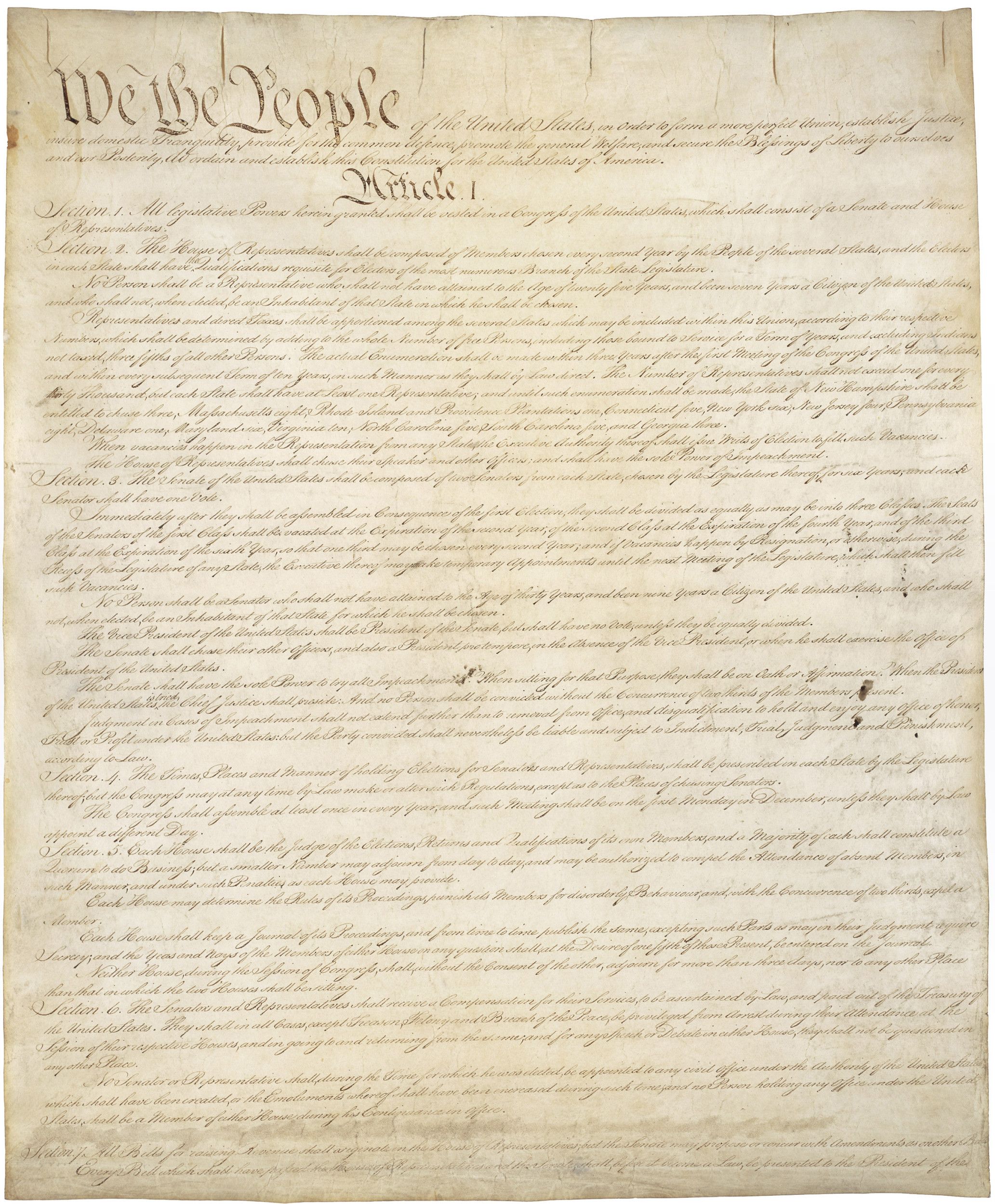
15
Activity Element
Franklin lived in France for nine years. His primary goal was to obtain French aid for the United States and he was instumental in creating the first military alliance with a foreign nation in 1778, To learn more about the Treaty of Alliance with France go to -
http://www.ourdocuments.gov/doc.php?flash=true&doc=4Benjamin
http://www.ourdocuments.gov/doc.php?flash=true&doc=4Benjamin
16
Activity Element
Benjamin Franklin was the oldest member at the Constitutional Convention that met in Philadelphia in the summer of 1787. On September 17, 1787 when the convention met for the last time, Franklin declared: "I think it (the Constitution) will astonish our enemies, who are waiting with confidence to hear that our councils are confounded like those of the builders of Babel; and that our States are on the point of separation, only to meet hereafter for the purpose of cutting one another's throats."
17
Activity Element
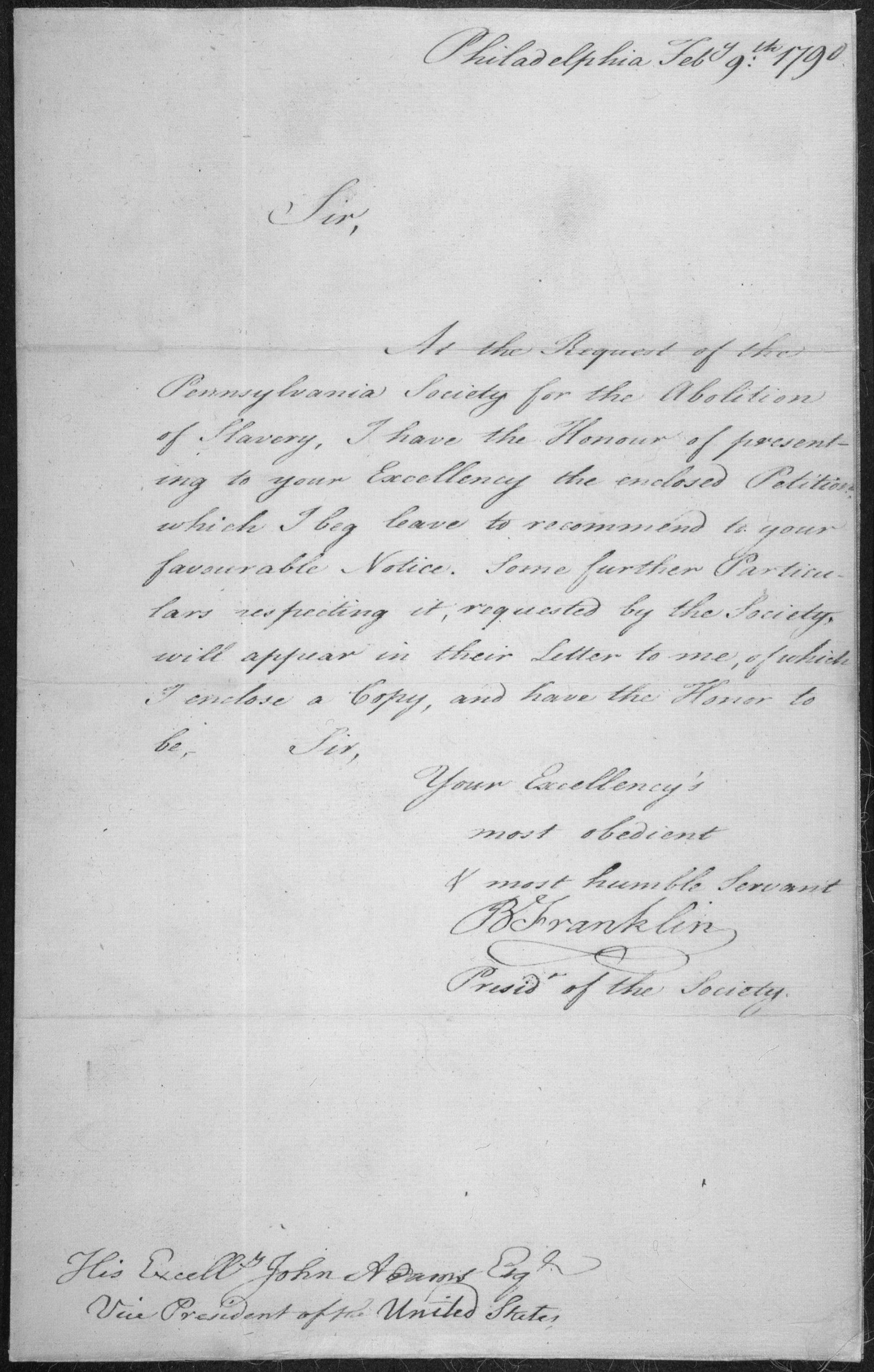
18
Activity Element
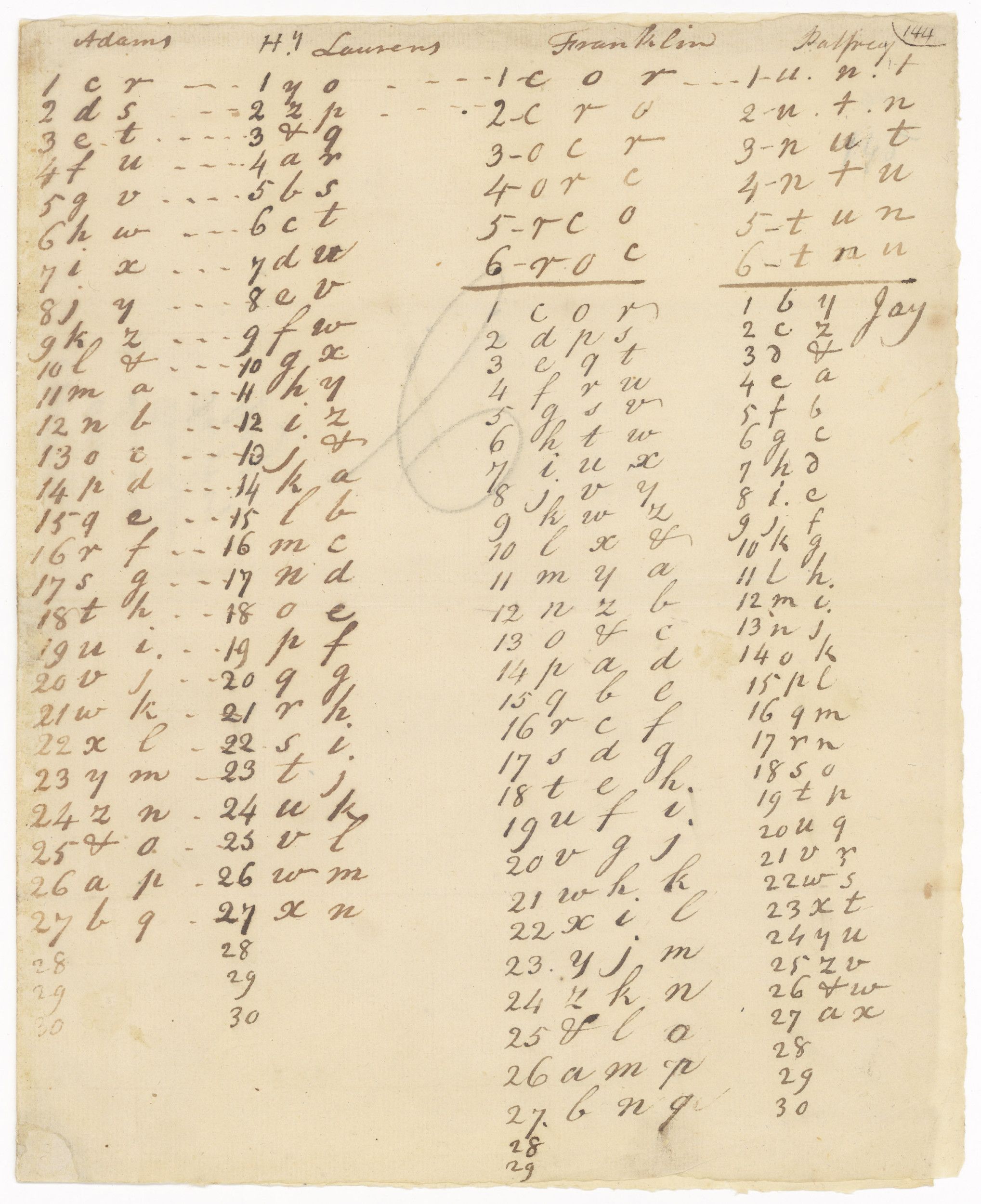
Culminating Document
Benjamin Franklin. Copy of painting by Joseph Duplessis
1778
This is a copy of a painting by Joseph Duplessis.
This primary source comes from the Records of Commissions of the Legislative Branch.
National Archives Identifier: 532834
Full Citation: Photograph 148-CC-11(3); Benjamin Franklin. Copy of painting by Joseph Duplessis; 1778; Photographs of Portraits of Signing and Non-Signing Delegates to the Constitutional Conventions, 1935 - 1939; Records of Commissions of the Legislative Branch, ; National Archives at College Park, College Park, MD. [Online Version, https://www.docsteach.org/documents/document/benjamin-franklin-duplessis, April 25, 2024]Benjamin Franklin. Copy of painting by Joseph Duplessis
Page 1
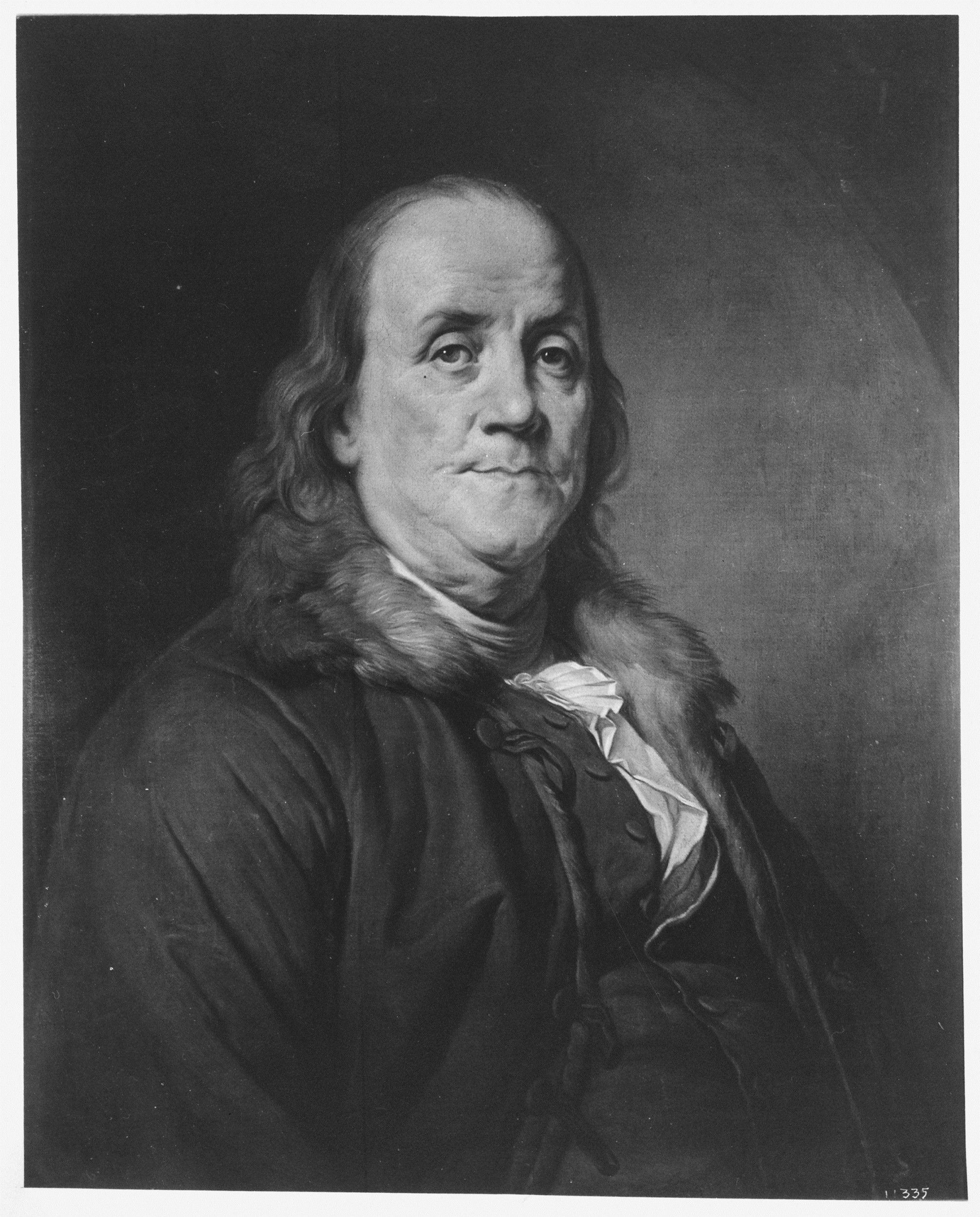
Conclusion
Benjamin Franklin: Politician and Diplomat
Seeing the Big Picture
The final document is the copy of Benjamin Franklin painting by Joseph Duplessis. This image can be found on the U.S. one hundred dollar bill.- Why do you think Franklin is portrayed on the one hundred dollar bill?
- Given all of Franklin's involvement in the establishment of the United States, what do you think his most important contribution was?
- Review the documents to which Franklin contributed. Which do you think were the three most important documents? Explain your choices.
Your Response
Document
Drafting the Declaration of Independence. The Committee - Franklin, Jefferson, Adams, Livingston and Sherman. Copy of engraving after Alonzo Chappel.
1776 (artwork 1857)
This is a copy of 1857 engraving by Alonzo Chappel. It shows the Committee of Five – Benjamin Franklin, Thomas Jefferson, John Adams, Robert Livingston, and Roger Sherman – drafting the Declaration of Independence during the Second Continental Congress in Philadelphia.
This primary source comes from the Records of the Bureau of Public Roads.
National Archives Identifier: 513332
Full Citation: Photograph 30-N-31(170); Drafting the Declaration of Independence. The Committee - Franklin, Jefferson, Adams, Livingston and Sherman. Copy of engraving after Alonzo Chappel.; 1776 (artwork 1857); Historical Photograph Files, 1896 - 1963; Records of the Bureau of Public Roads, ; National Archives at College Park, College Park, MD. [Online Version, https://www.docsteach.org/documents/document/drafting-declaration, April 25, 2024]Drafting the Declaration of Independence. The Committee - Franklin, Jefferson, Adams, Livingston and Sherman. Copy of engraving after Alonzo Chappel.
Page 1
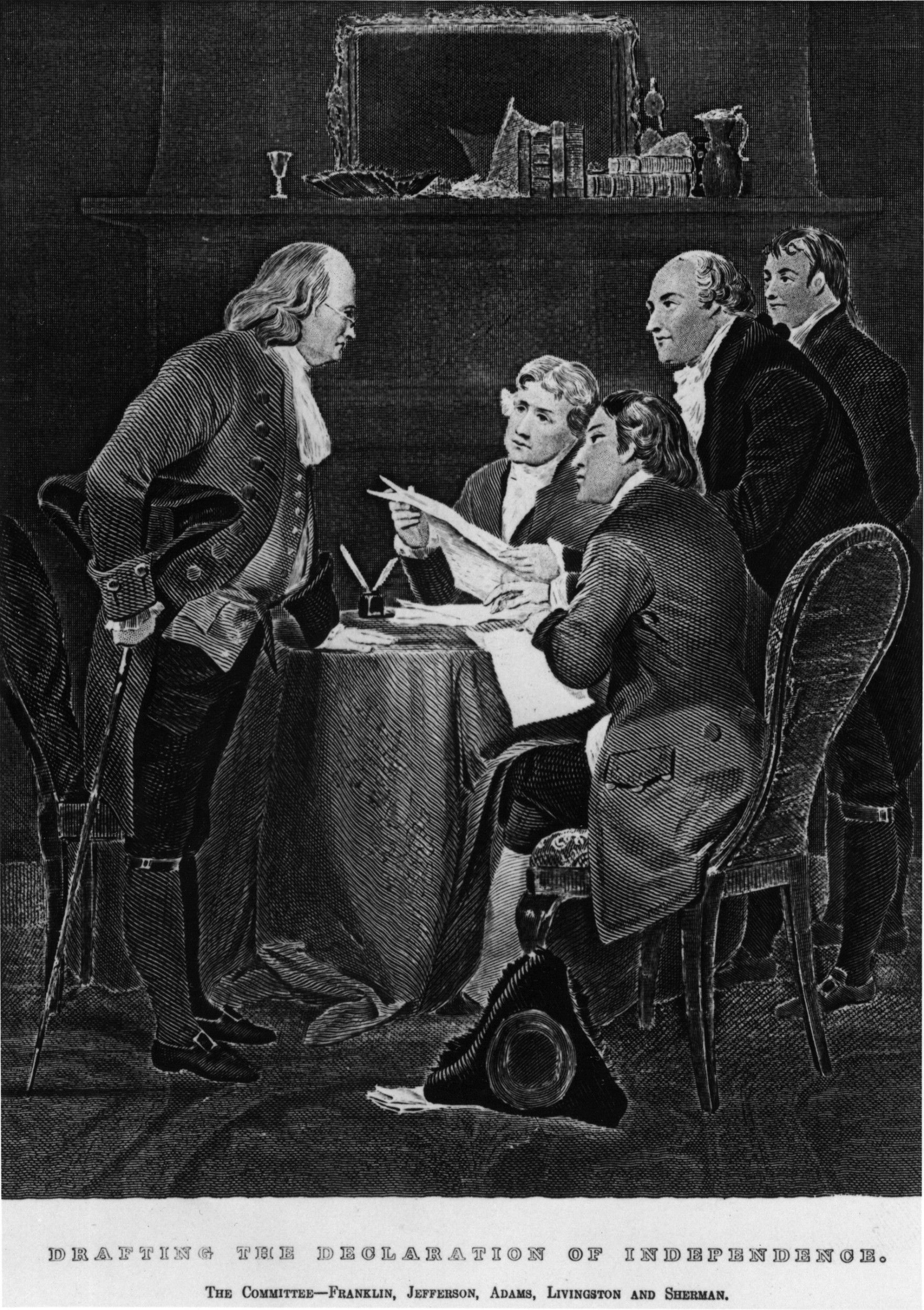
Document
Engrossed Declaration of Independence
7/4/1776 - 8/2/1776
On July 4, 1776, the Second Continental Congress adopted the Declaration of Independence in which the American colonies set forth a list of grievances against the British Crown and declared they were breaking from British rule to form free and independent states.
The Continental Congress had, on June 10, appointed a committee of five to draft a statement of independence for the colonies. The committee included Thomas Jefferson, John Adams, Benjamin Franklin, Robert R. Livingston, and Roger Sherman, with the actual writing delegated to Jefferson.
Jefferson drafted the statement between June 11 and 28, submitted drafts to Adams and Franklin who made some changes, and then presented the draft to the Continental Congress following the July 2nd adoption of the independence section of the Lee Resolution. The congressional revision process took all of July 3rd and most of July 4th. Finally, in the afternoon of July 4th, the Declaration was adopted.
On July 19, Congress resolved that the Declaration passed on the 4th be fairly "engrossed" on parchment with a new title, "the unanimous declaration of the thirteen united states of America," and signed by every member of Congress. (Engrossing is the process of copying an official document in a large hand. The engrosser of the Declaration was probably Timothy Matlock, an assistant to Charles Thomson, secretary to the Congress.)
Although it bears the date "July 4, 1776," the engrossed Declaration was signed on August 2, by members of the Continental Congress who were present that day and later by other members of Congress. John Hancock, the President of the Congress, signed the engrossed copy with a bold signature. The other delegates, following custom, signed beginning at the right with the signatures arranged by states from northernmost New Hampshire to southernmost Georgia. Although all delegates were not present on August 2nd, 56 delegates eventually signed the document. Late signers were Elbridge Gerry, Oliver Wolcott, Lewis Morris, Thomas McKean, and Matthew Thornton, who was unable to place his signature with the other New Hampshire delegates due to a lack of space. Some delegates, including Robert R. Livingston of New York, a member of the drafting committee, never signed the Declaration.
The King of England considered members of the Second Continental Congress to be rebels and traitors. Affixing one's name to this document meant pledging your life, fortune and your sacred honor to the cause of freedom. While none of the signers of the Declaration of Independence was actually put to death for this act, many suffered consequences during the course of the Revolution. Fifteen of the signers had their homes destroyed; others were punished indirectly, through their wives and children. By the end of the Revolutionary War, more than one-half of the signers suffered physical harm, imprisonment, property destruction, or other penalties for their acts.
This document was featured in “On the Other Side” in the October 2004 National Council for the Social Studies (NCSS) publication Social Education.
The Continental Congress had, on June 10, appointed a committee of five to draft a statement of independence for the colonies. The committee included Thomas Jefferson, John Adams, Benjamin Franklin, Robert R. Livingston, and Roger Sherman, with the actual writing delegated to Jefferson.
Jefferson drafted the statement between June 11 and 28, submitted drafts to Adams and Franklin who made some changes, and then presented the draft to the Continental Congress following the July 2nd adoption of the independence section of the Lee Resolution. The congressional revision process took all of July 3rd and most of July 4th. Finally, in the afternoon of July 4th, the Declaration was adopted.
On July 19, Congress resolved that the Declaration passed on the 4th be fairly "engrossed" on parchment with a new title, "the unanimous declaration of the thirteen united states of America," and signed by every member of Congress. (Engrossing is the process of copying an official document in a large hand. The engrosser of the Declaration was probably Timothy Matlock, an assistant to Charles Thomson, secretary to the Congress.)
Although it bears the date "July 4, 1776," the engrossed Declaration was signed on August 2, by members of the Continental Congress who were present that day and later by other members of Congress. John Hancock, the President of the Congress, signed the engrossed copy with a bold signature. The other delegates, following custom, signed beginning at the right with the signatures arranged by states from northernmost New Hampshire to southernmost Georgia. Although all delegates were not present on August 2nd, 56 delegates eventually signed the document. Late signers were Elbridge Gerry, Oliver Wolcott, Lewis Morris, Thomas McKean, and Matthew Thornton, who was unable to place his signature with the other New Hampshire delegates due to a lack of space. Some delegates, including Robert R. Livingston of New York, a member of the drafting committee, never signed the Declaration.
The King of England considered members of the Second Continental Congress to be rebels and traitors. Affixing one's name to this document meant pledging your life, fortune and your sacred honor to the cause of freedom. While none of the signers of the Declaration of Independence was actually put to death for this act, many suffered consequences during the course of the Revolution. Fifteen of the signers had their homes destroyed; others were punished indirectly, through their wives and children. By the end of the Revolutionary War, more than one-half of the signers suffered physical harm, imprisonment, property destruction, or other penalties for their acts.
This document was featured in “On the Other Side” in the October 2004 National Council for the Social Studies (NCSS) publication Social Education.
Transcript
IN CONGRESS, July 4, 1776.The unanimous Declaration of the thirteen united States of America,
When in the Course of human events, it becomes necessary for one people to dissolve the political bands which have connected them with another, and to assume among the powers of the earth, the separate and equal station to which the Laws of Nature and of Nature's God entitle them, a decent respect to the opinions of mankind requires that they should declare the causes which impel them to the separation.
We hold these truths to be self-evident, that all men are created equal, that they are endowed by their Creator with certain unalienable Rights, that among these are Life, Liberty and the pursuit of Happiness.--That to secure these rights, Governments are instituted among Men, deriving their just powers from the consent of the governed, --That whenever any Form of Government becomes destructive of these ends, it is the Right of the People to alter or to abolish it, and to institute new Government, laying its foundation on such principles and organizing its powers in such form, as to them shall seem most likely to effect their Safety and Happiness. Prudence, indeed, will dictate that Governments long established should not be changed for light and transient causes; and accordingly all experience hath shewn, that mankind are more disposed to suffer, while evils are sufferable, than to right themselves by abolishing the forms to which they are accustomed. But when a long train of abuses and usurpations, pursuing invariably the same Object evinces a design to reduce them under absolute Despotism, it is their right, it is their duty, to throw off such Government, and to provide new Guards for their future security.--Such has been the patient sufferance of these Colonies; and such is now the necessity which constrains them to alter their former Systems of Government. The history of the present King of Great Britain is a history of repeated injuries and usurpations, all having in direct object the establishment of an absolute Tyranny over these States. To prove this, let Facts be submitted to a candid world.
He has refused his Assent to Laws, the most wholesome and necessary for the public good.
He has forbidden his Governors to pass Laws of immediate and pressing importance, unless suspended in their operation till his Assent should be obtained; and when so suspended, he has utterly neglected to attend to them.
He has refused to pass other Laws for the accommodation of large districts of people, unless those people would relinquish the right of Representation in the Legislature, a right inestimable to them and formidable to tyrants only.
He has called together legislative bodies at places unusual, uncomfortable, and distant from the depository of their public Records, for the sole purpose of fatiguing them into compliance with his measures.
He has dissolved Representative Houses repeatedly, for opposing with manly firmness his invasions on the rights of the people.
He has refused for a long time, after such dissolutions, to cause others to be elected; whereby the Legislative powers, incapable of Annihilation, have returned to the People at large for their exercise; the State remaining in the mean time exposed to all the dangers of invasion from without, and convulsions within.
He has endeavoured to prevent the population of these States; for that purpose obstructing the Laws for Naturalization of Foreigners; refusing to pass others to encourage their migrations hither, and raising the conditions of new Appropriations of Lands.
He has obstructed the Administration of Justice, by refusing his Assent to Laws for establishing Judiciary powers.
He has made Judges dependent on his Will alone, for the tenure of their offices, and the amount and payment of their salaries.
He has erected a multitude of New Offices, and sent hither swarms of Officers to harrass our people, and eat out their substance.
He has kept among us, in times of peace, Standing Armies without the Consent of our legislatures.
He has affected to render the Military independent of and superior to the Civil power.
He has combined with others to subject us to a jurisdiction foreign to our constitution, and unacknowledged by our laws; giving his Assent to their Acts of pretended Legislation:
For Quartering large bodies of armed troops among us:
For protecting them, by a mock Trial, from punishment for any Murders which they should commit on the Inhabitants of these States:
For cutting off our Trade with all parts of the world:
For imposing Taxes on us without our Consent:
For depriving us in many cases, of the benefits of Trial by Jury:
For transporting us beyond Seas to be tried for pretended offences
For abolishing the free System of English Laws in a neighbouring Province, establishing therein an Arbitrary government, and enlarging its Boundaries so as to render it at once an example and fit instrument for introducing the same absolute rule into these Colonies:
For taking away our Charters, abolishing our most valuable Laws, and altering fundamentally the Forms of our Governments:
For suspending our own Legislatures, and declaring themselves invested with power to legislate for us in all cases whatsoever.
He has abdicated Government here, by declaring us out of his Protection and waging War against us.
He has plundered our seas, ravaged our Coasts, burnt our towns, and destroyed the lives of our people.
He is at this time transporting large Armies of foreign Mercenaries to compleat the works of death, desolation and tyranny, already begun with circumstances of Cruelty & perfidy scarcely paralleled in the most barbarous ages, and totally unworthy the Head of a civilized nation.
He has constrained our fellow Citizens taken Captive on the high Seas to bear Arms against their Country, to become the executioners of their friends and Brethren, or to fall themselves by their Hands.
He has excited domestic insurrections amongst us, and has endeavoured to bring on the inhabitants of our frontiers, the merciless Indian Savages, whose known rule of warfare, is an undistinguished destruction of all ages, sexes and conditions.
In every stage of these Oppressions We have Petitioned for Redress in the most humble terms: Our repeated Petitions have been answered only by repeated injury. A Prince whose character is thus marked by every act which may define a Tyrant, is unfit to be the ruler of a free people.
Nor have We been wanting in attentions to our Brittish brethren. We have warned them from time to time of attempts by their legislature to extend an unwarrantable jurisdiction over us. We have reminded them of the circumstances of our emigration and settlement here. We have appealed to their native justice and magnanimity, and we have conjured them by the ties of our common kindred to disavow these usurpations, which, would inevitably interrupt our connections and correspondence. They too have been deaf to the voice of justice and of consanguinity. We must, therefore, acquiesce in the necessity, which denounces our Separation, and hold them, as we hold the rest of mankind, Enemies in War, in Peace Friends.
We, therefore, the Representatives of the united States of America, in General Congress, Assembled, appealing to the Supreme Judge of the world for the rectitude of our intentions, do, in the Name, and by Authority of the good People of these Colonies, solemnly publish and declare, That these United Colonies are, and of Right ought to be Free and Independent States; that they are Absolved from all Allegiance to the British Crown, and that all political connection between them and the State of Great Britain, is and ought to be totally dissolved; and that as Free and Independent States, they have full Power to levy War, conclude Peace, contract Alliances, establish Commerce, and to do all other Acts and Things which Independent States may of right do. And for the support of this Declaration, with a firm reliance on the protection of divine Providence, we mutually pledge to each other our Lives, our Fortunes and our sacred Honor.
The 56 signatures on the Declaration appear in the positions indicated:
Column 1
Georgia:
Button Gwinnett
Lyman Hall
George Walton
Column 2
North Carolina:
William Hooper
Joseph Hewes
John Penn
South Carolina:
Edward Rutledge
Thomas Heyward, Jr.
Thomas Lynch, Jr.
Arthur Middleton
Column 3
Massachusetts:
John Hancock
Maryland:
Samuel Chase
William Paca
Thomas Stone
Charles Carroll of Carrollton
Virginia:
George Wythe
Richard Henry Lee
Thomas Jefferson
Benjamin Harrison
Thomas Nelson, Jr.
Francis Lightfoot Lee
Carter Braxton
Column 4
Pennsylvania:
Robert Morris
Benjamin Rush
Benjamin Franklin
John Morton
George Clymer
James Smith
George Taylor
James Wilson
George Ross
Delaware:
Caesar Rodney
George Read
Thomas McKean
Column 5
New York:
William Floyd
Philip Livingston
Francis Lewis
Lewis Morris
New Jersey:
Richard Stockton
John Witherspoon
Francis Hopkinson
John Hart
Abraham Clark
Column 6
New Hampshire:
Josiah Bartlett
William Whipple
Massachusetts:
Samuel Adams
John Adams
Robert Treat Paine
Elbridge Gerry
Rhode Island:
Stephen Hopkins
William Ellery
Connecticut:
Roger Sherman
Samuel Huntington
William Williams
Oliver Wolcott
New Hampshire:
Matthew Thornton
This primary source comes from the Records of the Continental and Confederation Congresses and the Constitutional Convention.
National Archives Identifier: 1419123
Full Citation: Engrossed Declaration of Independence; 7/4/1776 - 8/2/1776; Miscellaneous Papers of the Continental Congress, 1774 - 1789; Records of the Continental and Confederation Congresses and the Constitutional Convention, ; National Archives Building, Washington, DC. [Online Version, https://www.docsteach.org/documents/document/the-declaration-of-independence, April 25, 2024]Engrossed Declaration of Independence
Page 1
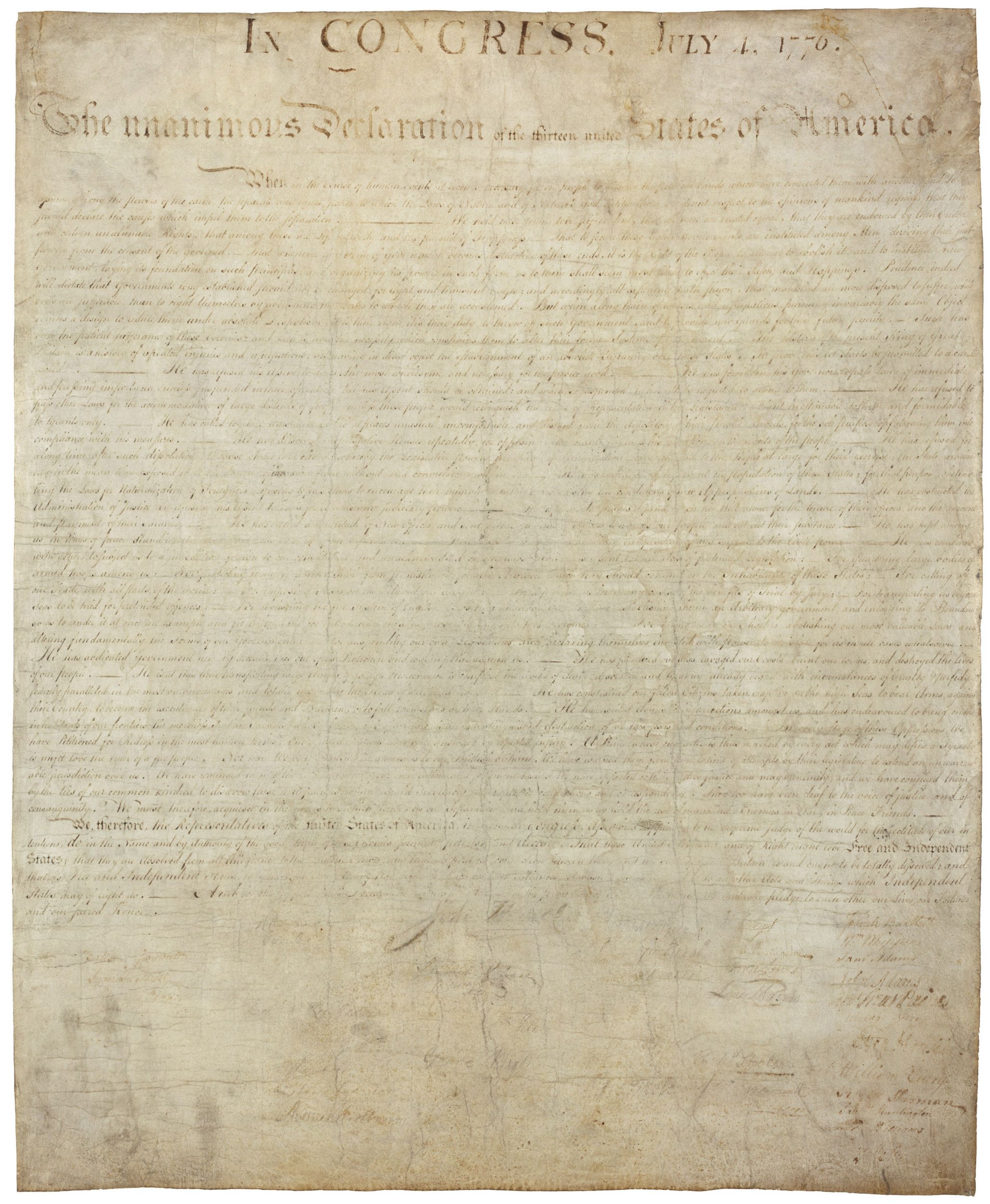
Engrossed Declaration of Independence
Page 2
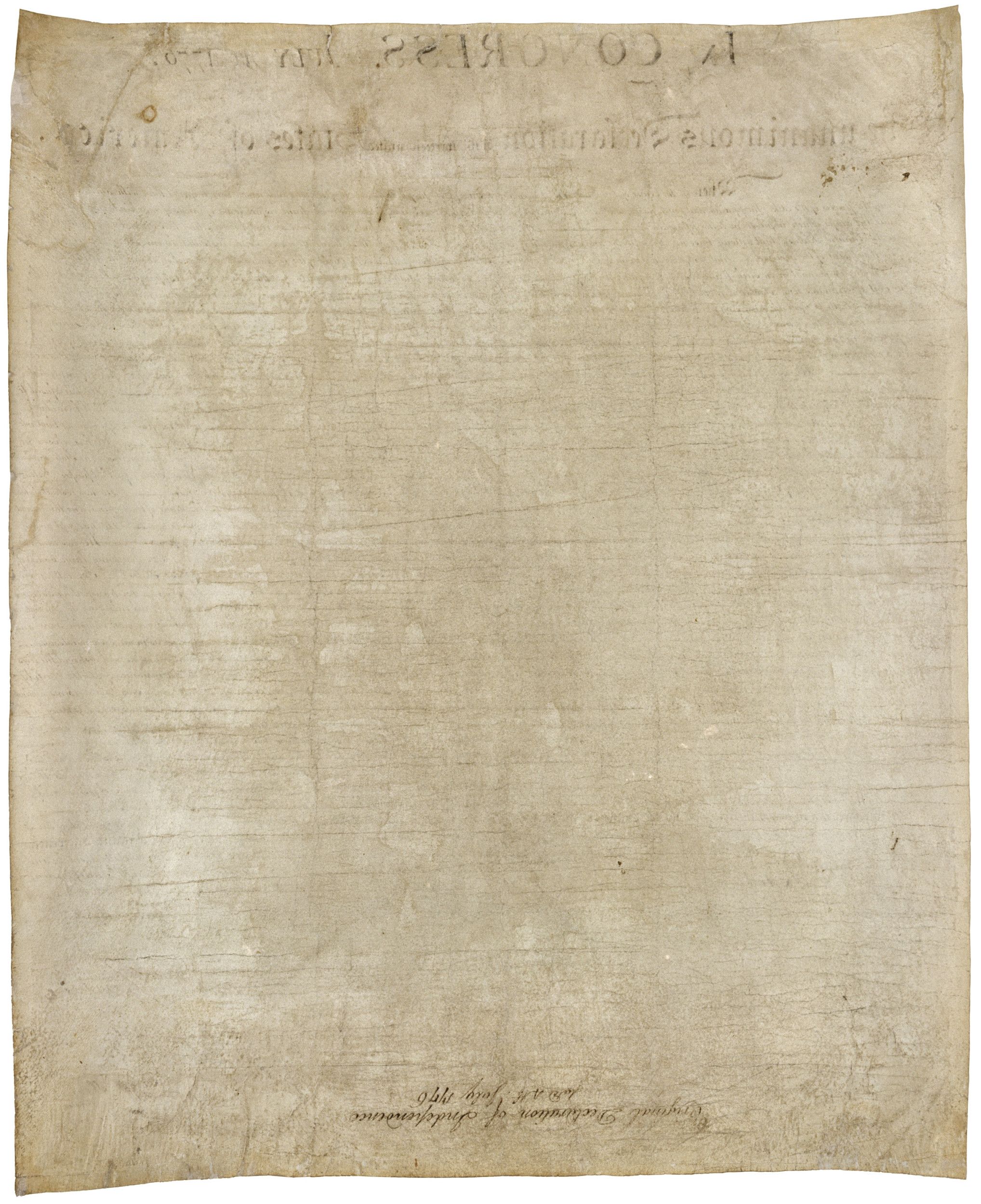
Document
Second Design for the Great Seal Obverse by Francis Hopkinson
1780
On July 4, 1776, the Continental Congress passed a resolution directing that Benjamin Franklin, John Adams, and Thomas Jefferson form a committee to design a seal, emblem, or coat of arms to represent the new sovereign nation of free people. Francis Hopkinson submitted the design shown here in 1780. Although his scheme was not accepted, several of its components were incorporated into Charles Thomson's approved design of 1782. Hopkinson introduced the olive branch as a symbol of peace. He also suggested the red, white, and blue colors for the shield.
This primary source comes from the Records of the Continental and Confederation Congresses and the Constitutional Convention.
National Archives Identifier: 595252
Full Citation: Second Design for the Great Seal Obverse by Francis Hopkinson; 1780; Records of the Continental and Confederation Congresses and the Constitutional Convention, . [Online Version, https://www.docsteach.org/documents/document/second-design-for-the-great-seal-obverse-by-francis-hopkinson, April 25, 2024]Second Design for the Great Seal Obverse by Francis Hopkinson
Page 1
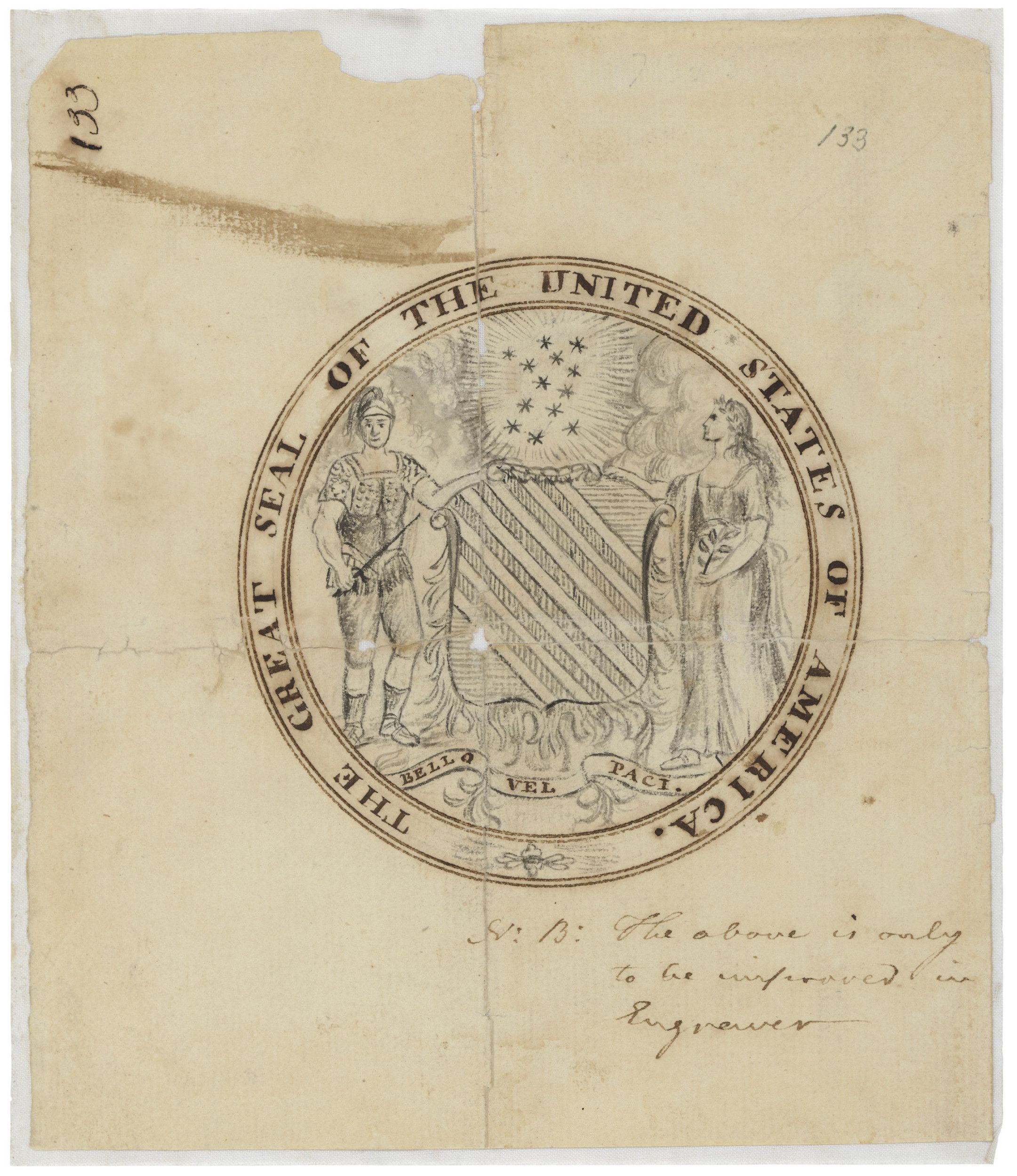
Document
Benjamin Franklin at the Court of France
1778 (artwork 1911)
This is a copy of an engraving by W.O Cellar based on a painting by Anton Hohenstein.
This primary source comes from the Records of the Commission of Fine Arts.
National Archives Identifier: 518217
Full Citation: Photograph 66-G-15B-5; Benjamin Franklin at the Court of France; 1778 (artwork 1911); General Photographic File of the Commission of Fine Arts, ca. 1910 - 1950; Records of the Commission of Fine Arts, ; National Archives at College Park, College Park, MD. [Online Version, https://www.docsteach.org/documents/document/benjamin-franklin-court-france, April 25, 2024]Benjamin Franklin at the Court of France
Page 1
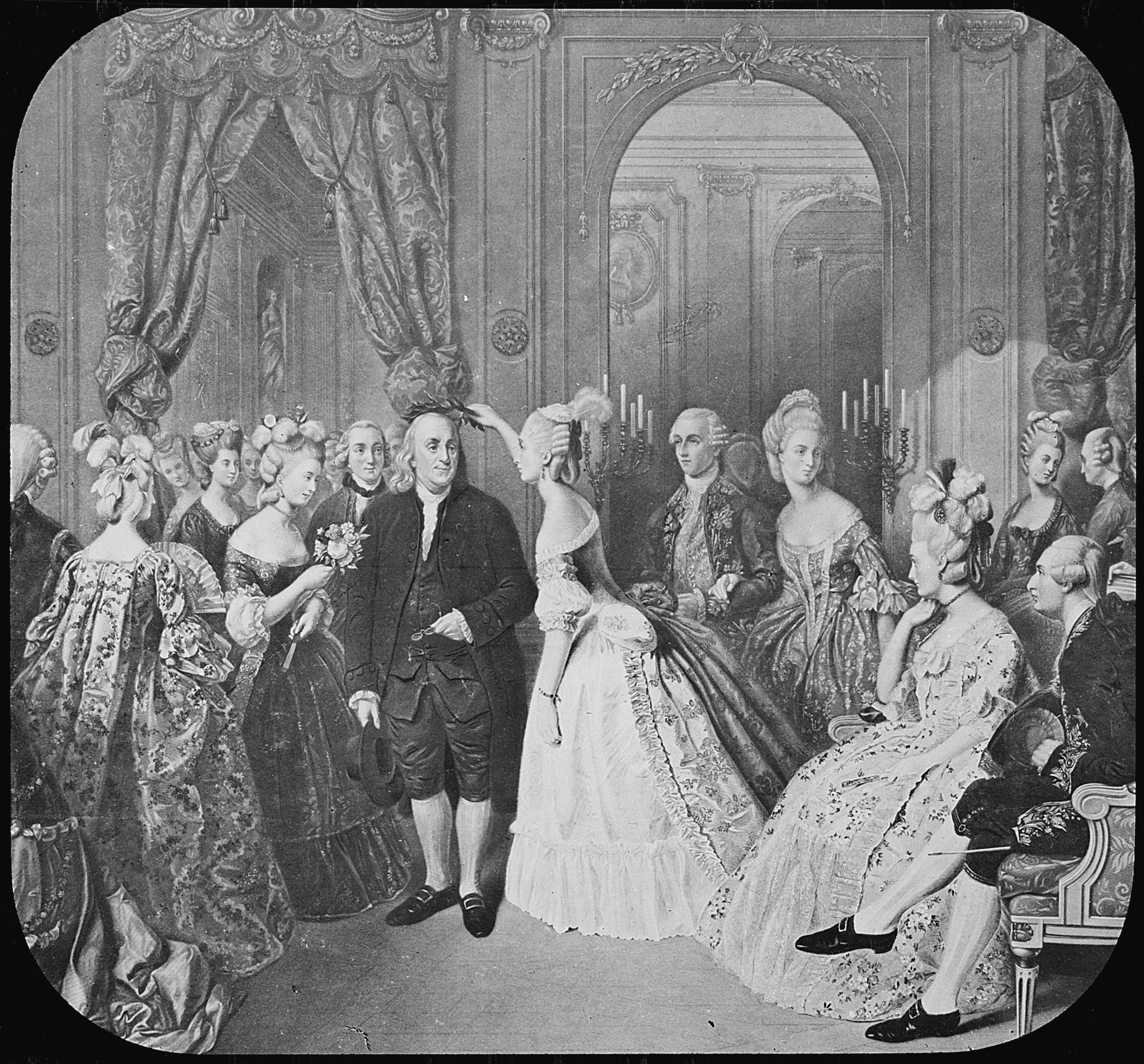
Document
Treaty of Alliance with France
2/6/1778
The American Colonies and France signed this military treaty on February 6, 1778. It formalized France's financial and military support of the revolutionary government in America.
Believing that they would benefit militarily by allying themselves with a powerful nation, the Colonies formed this alliance with France against Great Britain during the Revolutionary War. According to this first military treaty of the new nation, the United States agreed to provide a defensive alliance to aid France should England attack.
The two sides also agreed that neither France nor the United States would make peace with England until the independence of the United States was recognized. As part of the alliance between "the most Christian King and the United States of North America," neither party could conclude a peace "with Great Britain without the formal consent of the other."
France also recognized the independence of the United States, as dependent upon a military victory. The treaty stipulated that "The essential and direct End of the present defensive alliance is to maintain effectually the liberty, Sovereignty, and independance absolute and unlimited of the said united States, as well in Matters of Gouvernement as of commerce."
The United States and France agreed "not to lay down their arms, until the Independence of the united states shall have been formally or tacitly assured by the Treaty or Treaties that shall terminate the War."
American diplomats Benjamin Franklin, Silas Deane, and Arthur Lee negotiated in France on behalf of the American Colonies. The treaty is written in both English and French.
Believing that they would benefit militarily by allying themselves with a powerful nation, the Colonies formed this alliance with France against Great Britain during the Revolutionary War. According to this first military treaty of the new nation, the United States agreed to provide a defensive alliance to aid France should England attack.
The two sides also agreed that neither France nor the United States would make peace with England until the independence of the United States was recognized. As part of the alliance between "the most Christian King and the United States of North America," neither party could conclude a peace "with Great Britain without the formal consent of the other."
France also recognized the independence of the United States, as dependent upon a military victory. The treaty stipulated that "The essential and direct End of the present defensive alliance is to maintain effectually the liberty, Sovereignty, and independance absolute and unlimited of the said united States, as well in Matters of Gouvernement as of commerce."
The United States and France agreed "not to lay down their arms, until the Independence of the united states shall have been formally or tacitly assured by the Treaty or Treaties that shall terminate the War."
American diplomats Benjamin Franklin, Silas Deane, and Arthur Lee negotiated in France on behalf of the American Colonies. The treaty is written in both English and French.
Transcript
Treaty of AllianceThe most Christian King and the United States of North America, to wit, New Hampshire, Massachusetts Bay, Rhodes island, Connecticut, New York, New Jersey, Pennsylvania, Delaware, Maryland, Virginia, North Carolina, South Carolina, and Georgia, having this Day concluded a Treaty of amity and Commerce, for the reciprocal advantage of their Subjects and Citizens have thought it necessary to take into consideration the means of strengthening those engagements and of rondring them useful to the safety and tranquility of the two parties, particularly in case Great Britain in Resentment of that connection and of the good correspondence which is the object of the said Treaty, should break the Peace with france, either by direct hostilities, or by hindring her commerce and navigation, in a manner contrary to the Rights of Nations, and the Peace subsisting between the two Crowns; and his Majesty and the said united States having resolved in that Case to join their Councils and efforts against the Enterprises of their common Enemy, the respective Plenipotentiaries, impower'd to concert the Clauses & conditions proper to fulfil the said
Intentions, have, after the most mature Deliberation, concluded and determined on the following Articles.
ART. 1.
If War should break out betwan france and Great Britain, during the continuance of the present War betwan the United States and England, his Majesty and the said united States, shall make it a common cause, and aid each other mutually with their good Offices, their Counsels, and their forces, according to the exigence of Conjunctures as becomes good & faithful Allies.
ART. 2.
The essential and direct End of the present defensive alliance is to maintain effectually the liberty, Sovereignty, and independance absolute and unlimited of the said united States, as well in Matters of Gouvernement as of commerce.
ART. 3.
The two contracting Parties shall each on its own Part, and in the manner it may judge most proper, make all the
efforts in its Power, against their common Ennemy, in order to attain the end proposed.
ART. 4.
The contracting Parties agree that in case either of them should form any particular Enterprise in which the concurrence of the other may be desired, the Party whose concurrence is desired shall readily, and with good faith, join to act in concert for that Purpose, as far as circumstances and its own particular Situation will permit; and in that case, they shall regulate by a particular Convention the quantity and kind of Succour to be furnished, and the Time and manner of its being brought into action, as well as the advantages which are to be its Compensation.
ART. 5.
If the united States should think fit to attempt the Reduction of the British Power remaining in the Northern Parts of America, or the Islands of Bermudas, those Countries or Islands in case of Success, shall be confederated with or dependent upon the said united States.
ART. 6.
The Most Christian King renounces for ever the possession of the Islands of Bermudas as well as of any part of the continent of North america which before the treaty of Paris in 1763.
or in virtue of that Treaty, were acknowledged to belong to the Crown of Great Britain, or to the united States heretofore called British Colonies, or which are at this Time or have lately been under the Power of The King and Crown of Great Britain.
ART. 7.
If his Most Christian Majesty shall think proper to attack any of the Islands situated in the Gulph of Mexico, or near that Gulph, which are at present under the Power of Great Britain, all the said Isles, in case of success, shall appertain to the Crown of france.
ART. 8.
Neither of the two Parties shall conclude either Truce or Peace with Great Britain, without the formal consent of the other first obtain'd; and they mutually engage not to lay down their arms, until the Independence of the united states shall have been formally or tacitly assured by the Treaty or Treaties that shall terminate the War.
ART. 9.
The contracting Parties declare, that being resolved to fulfil each on its
Part the clauses and conditions of the present Treaty of alliance, according to its own power and circumstances, there shall be no after claim of compensation on one side or the other whatever may be the event of the War.
ART. 10.
The Most Christian King and the United states, agree to invite or admit other Powers who may have received injuries from England to make common cause with them, and to accede to the present alliance, under such conditions as shall be freely agreed to and settled between all the Parties.
ART. 11.
The two Parties guarantee mutually from the present time and forever, against all other powers, to wit, the united states to his most Christian Majesty the present Possessions of the Crown of france in America as well as those which it may acquire by the future Treaty of peace: and his most Christian Majesty guarantees on his part to the united states, their liberty, Sovereignty, and Independence absolute, and unlimited, as well in Matters of Government as commerce and also their Possessions, and the additions or
conquests that their Confederation may obtain during the war, from any of the Dominions now or heretofore possessed by Great Britain in North America, conformable to the 5th & 6th articles above written, the whole as their Possessions shall be fixed and assured to the said States at the moment of the cessation of their present War with England.
ART. 12.
In order to fix more precisely the sense and application of the preceding article, the Contracting Parties declare, that in case of rupture between france and England, the reciprocal Guarantee declared in the said article shall have its full force and effect the moment such War shall break out and if such rupture shall not take place, the mutual obligations of the said guarantee shall not commence, until the moment of the cessation of the present War between the united states and England shall have ascertained the Possessions.
ART. 13.
The present Treaty shall be ratified on both sides and the Ratifications shall be exchanged in the space of six months,
sooner if possible.
In faith where of the respective Plenipotentiaries, to wit on the part of the most Christian King Conrad Alexander Gerard royal syndic of the City of Strasbourgh & Secretary of his majestys Council of State and on the part of the United States Benjamin Franklin Deputy to the General Congress from the State of Pensylvania and President of the Convention of the same state, Silas Deane heretofore Deputy from the State of Connecticut & Arthur Lee Councellor at Law have signed the above Articles both in the French and English Languages declaring Nevertheless that the present Treaty was originally composed and concluded in the French Language, and they have hereunto affixed their Seals
Done at Paris, this sixth Day of February, one thousand seven hundred and seventy eight.
C. A. GERARD
B FRANKLIN
SILAS DEANE
ARTHUR LEE
This primary source comes from the General Records of the United States Government.
National Archives Identifier: 2524341
Full Citation: Treaty of Alliance with France; 2/6/1778; Perfected Treaties, 1778 - 1945; General Records of the United States Government, ; National Archives Building, Washington, DC. [Online Version, https://www.docsteach.org/documents/document/treaty-alliance-france, April 25, 2024]Treaty of Alliance with France
Page 1
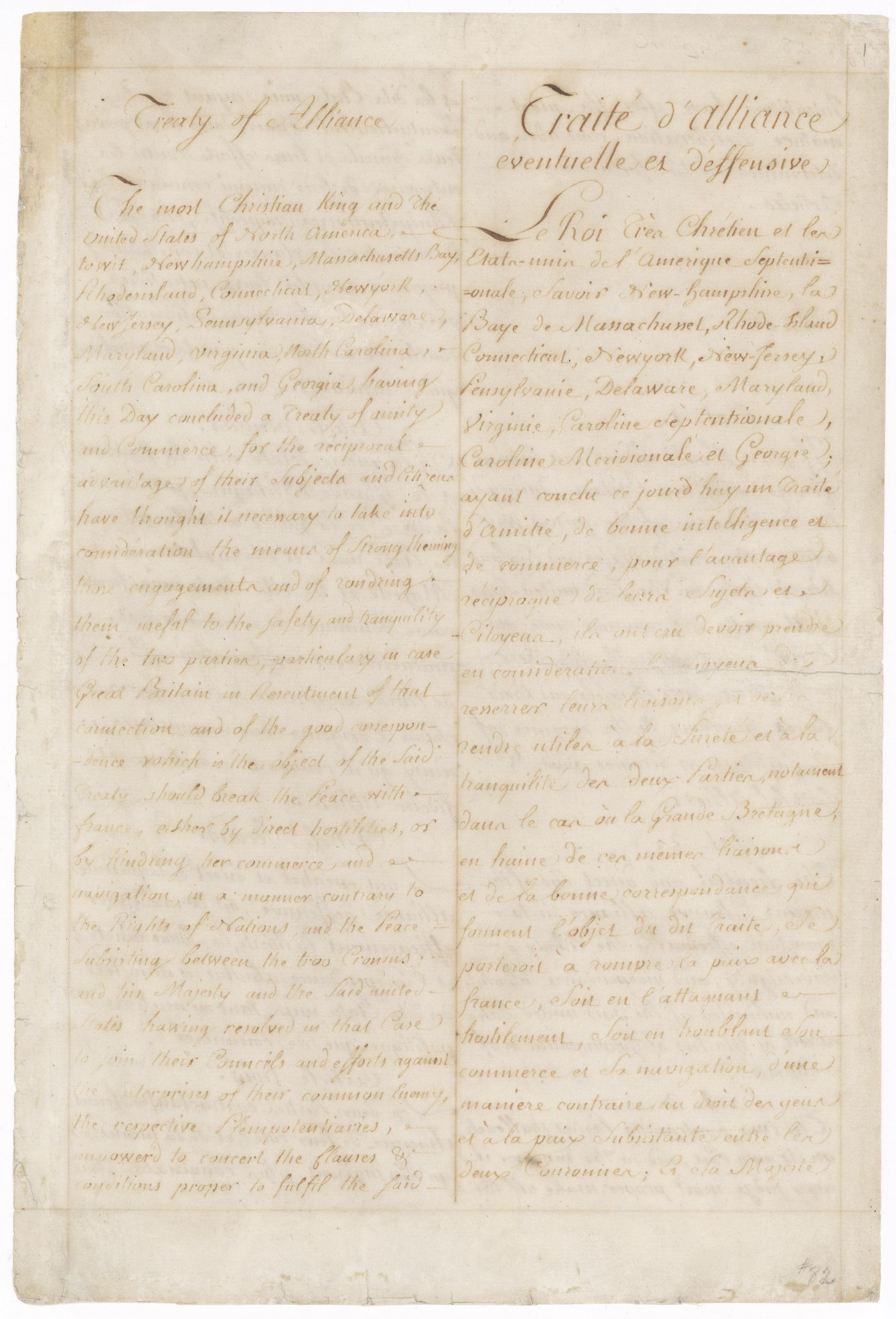
Treaty of Alliance with France
Page 2
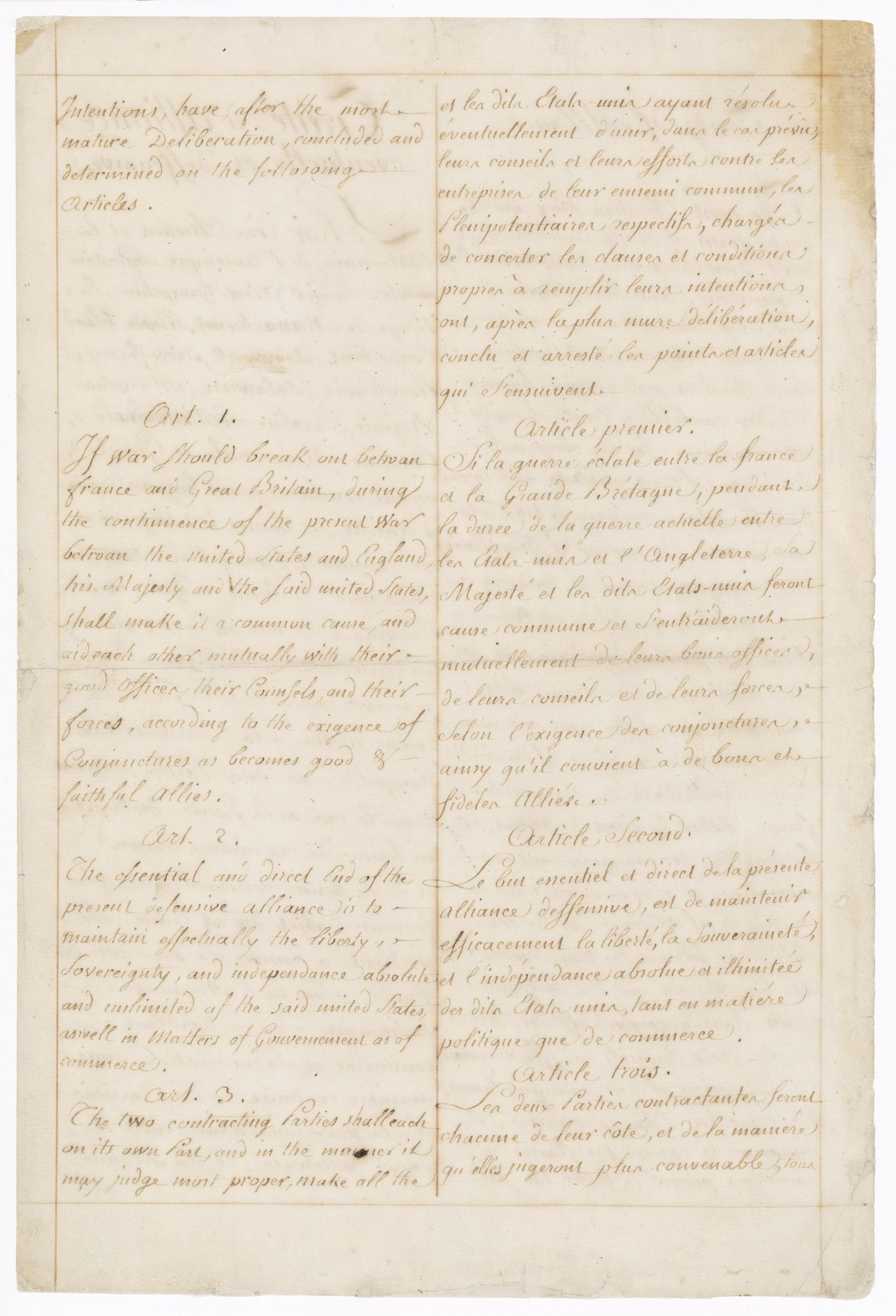
Treaty of Alliance with France
Page 3
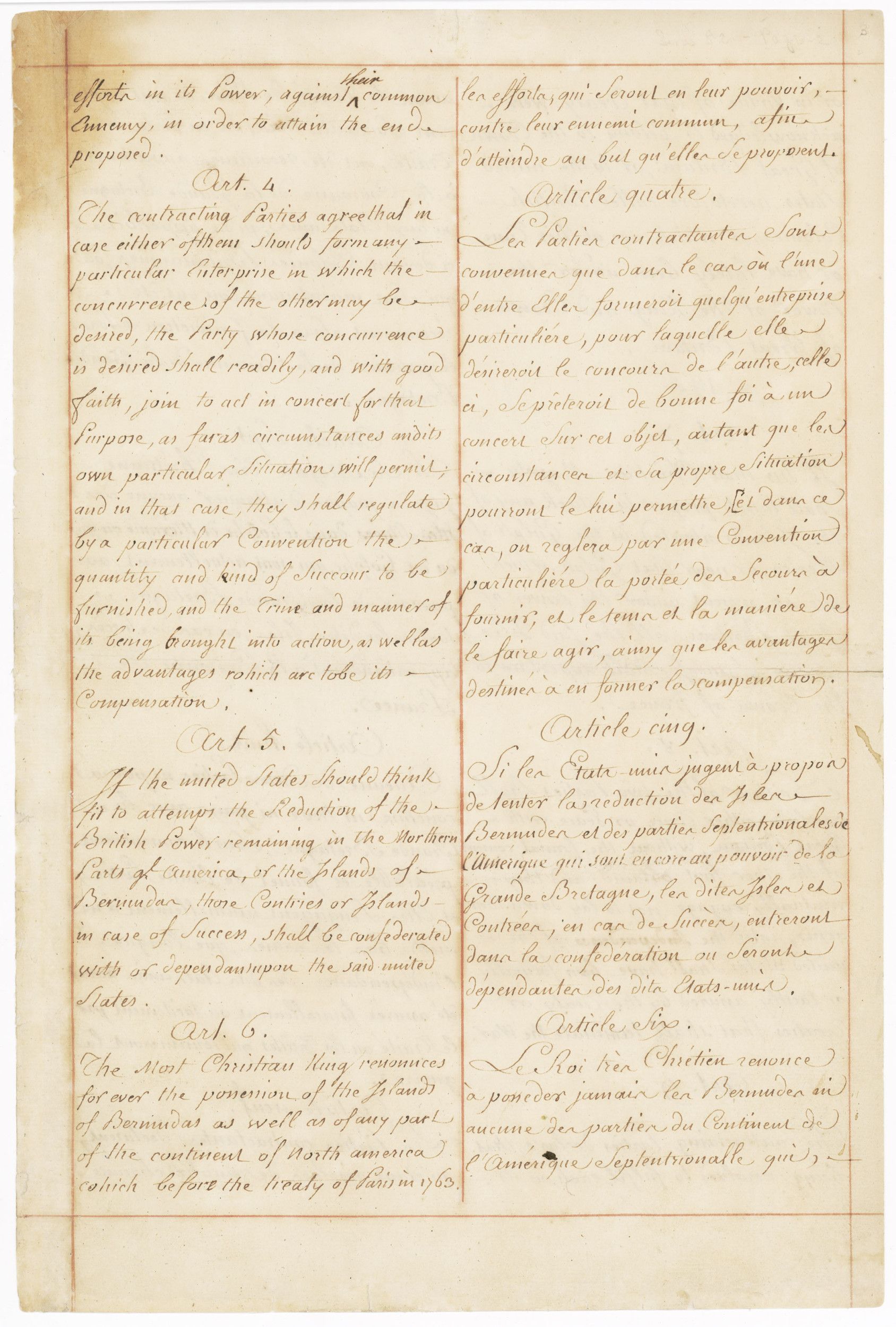
Treaty of Alliance with France
Page 4

Treaty of Alliance with France
Page 5
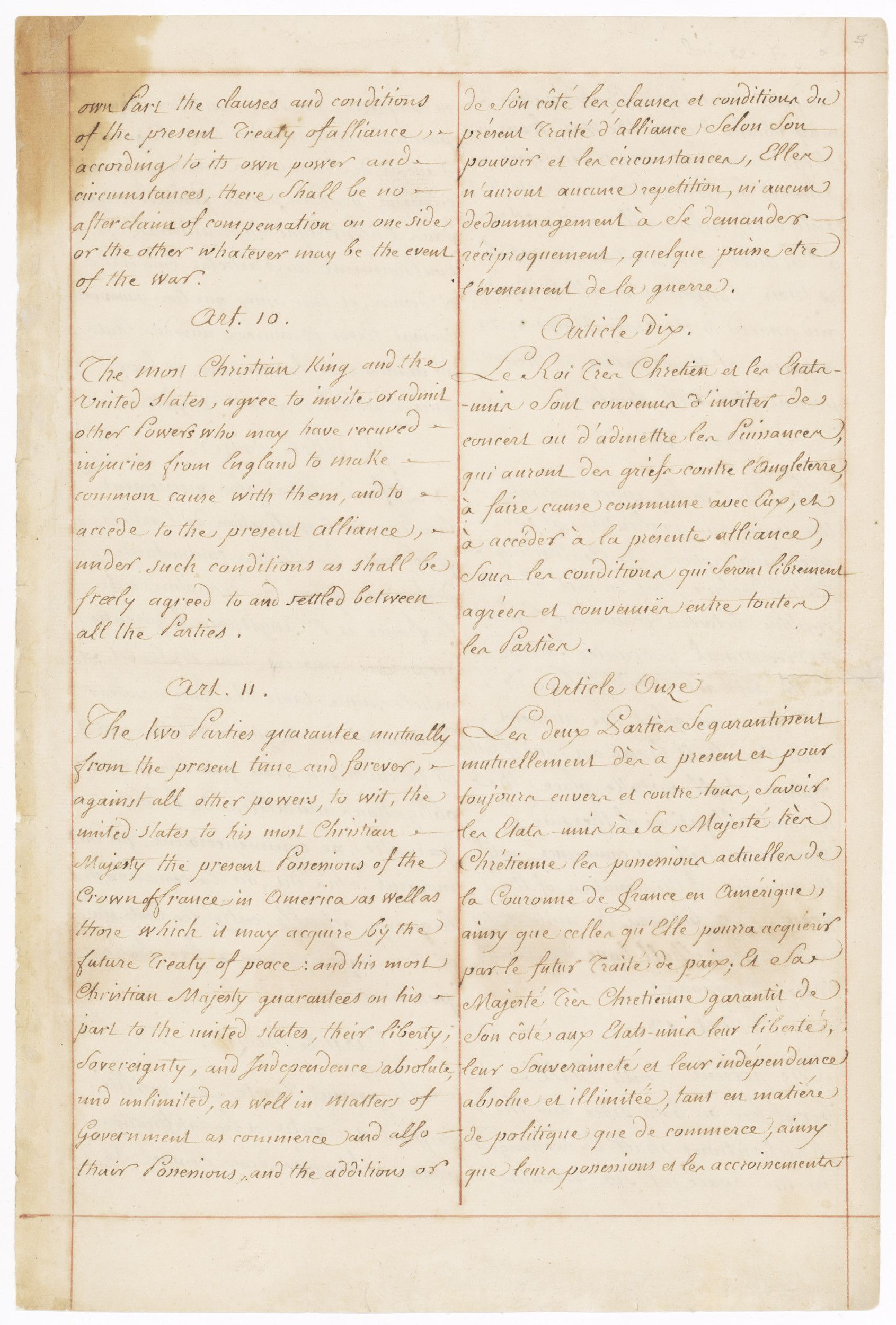
Treaty of Alliance with France
Page 6

Treaty of Alliance with France
Page 7
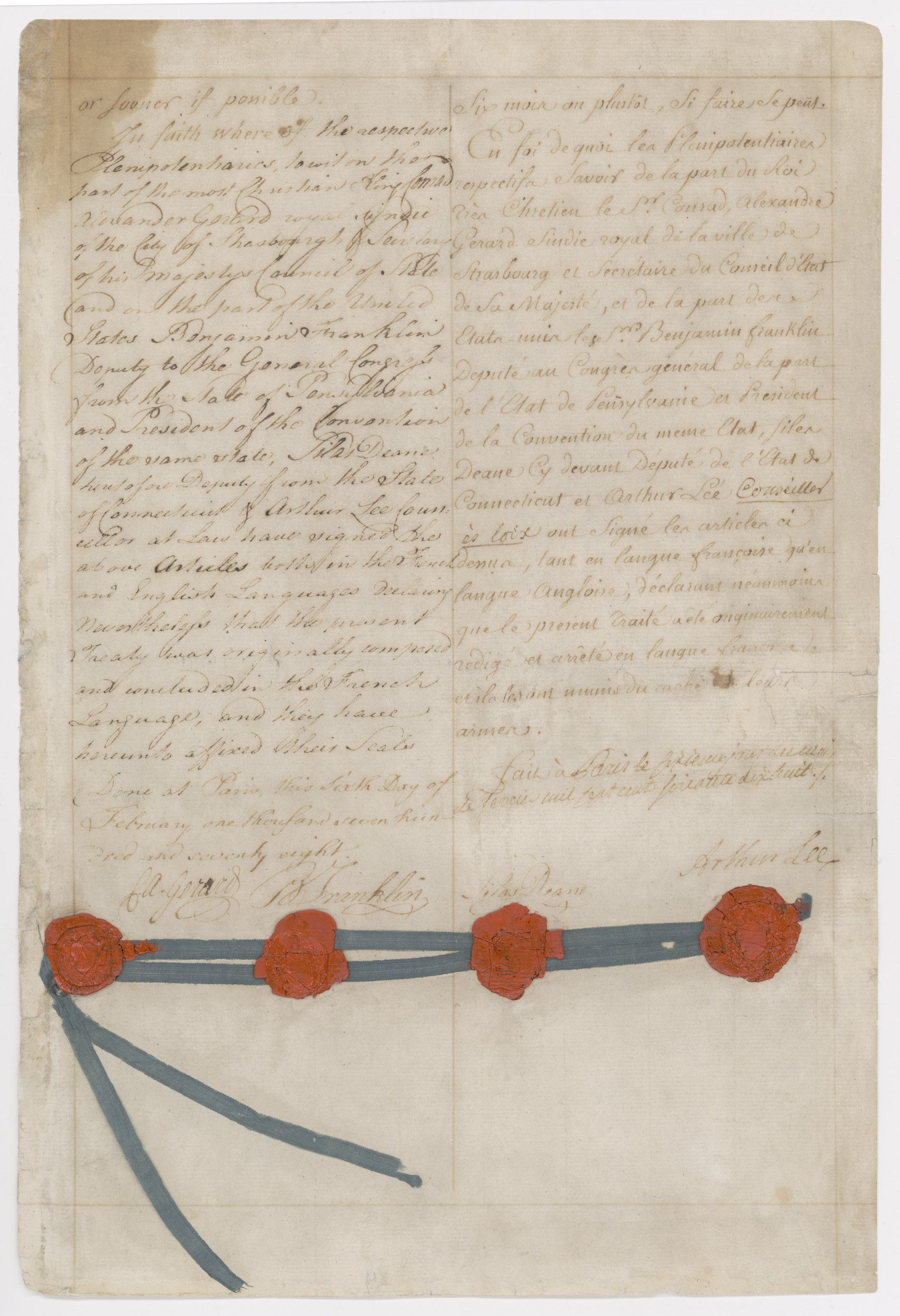
Treaty of Alliance with France
Page 8

Treaty of Alliance with France
Page 9
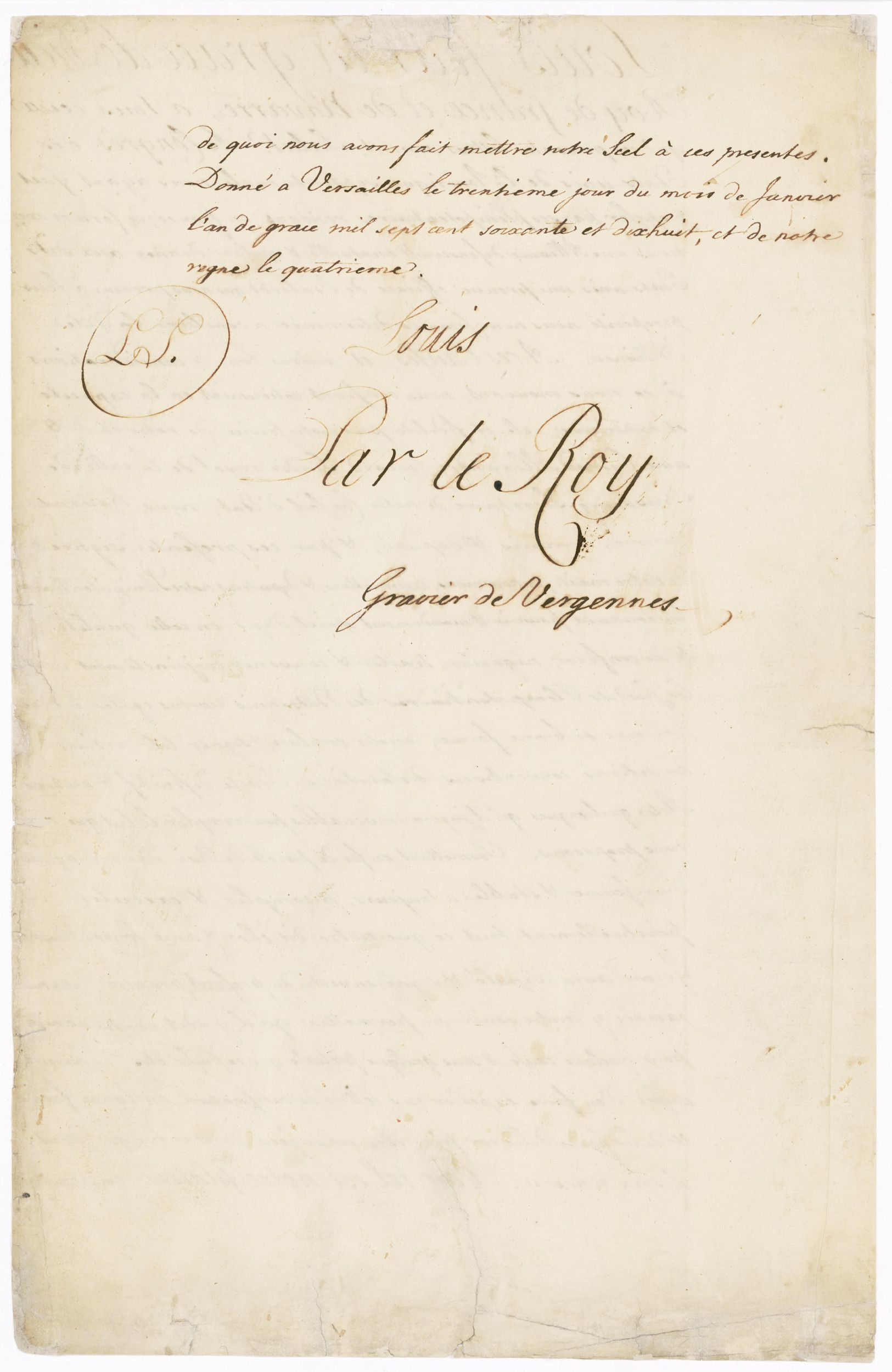
Treaty of Alliance with France
Page 10
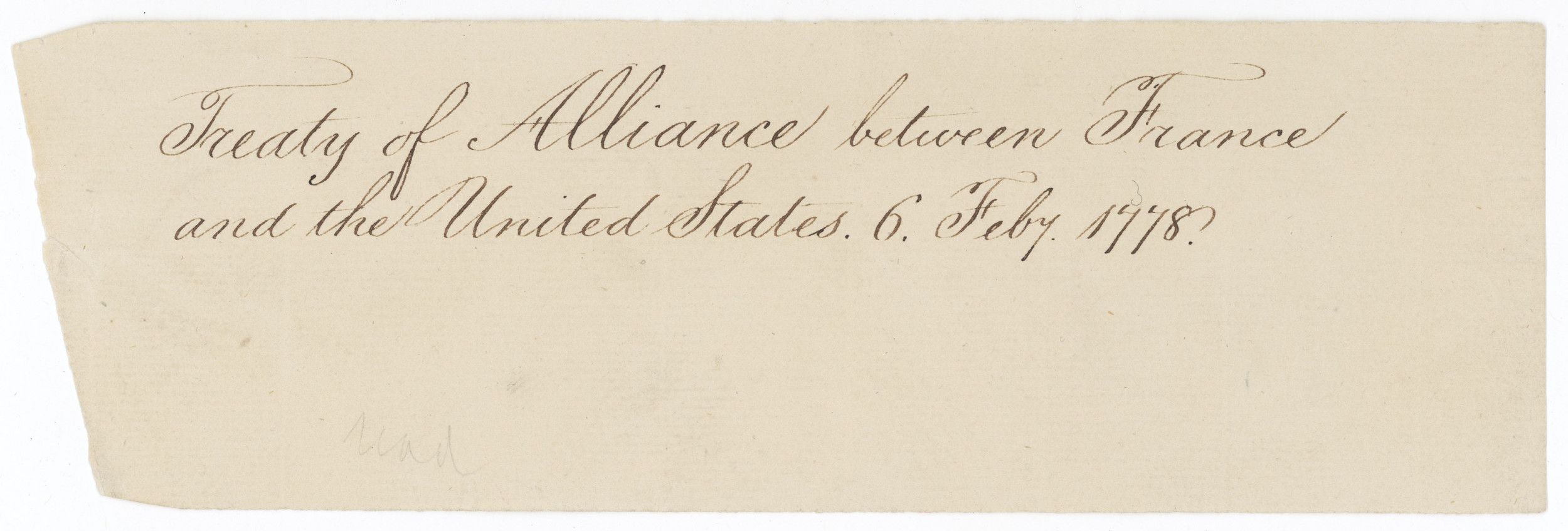
Document
Ciphers Belonging to the Various American Peace Commissioners
ca. 1781
Messages in secret code traveled across the Atlantic between the peace commissioners and Congress throughout the Revolutionary War. Ciphers like this were used to decode the messages. American peace commissioner Henry Laurens was imprisoned when he was caught en route to Paris with instructions, and the Americans learned the hard way that “treasonous” correspondence could land them in the Tower of London.
Transcript
144Adams H!l Laurens Franklin Palfrey
1 c r - . 1 y o - - - - 1- c o r - - - 1- u. n. l
2 d s . - - 2 z p - - - - 2- c r o 2- n. t. n
3 e. t. - - - - 3 t q 3- o c r 3- n u t
4 f u - - - . 4 a r 4- o r c 4- n t u
5 g v . . . . 5 b s 5 - r c o 5- t u n
6 h w - - - 6 c t 6 - r o c 6 - t n u
7 i x . . . 7 d u
8 j y . . . . 8 e v
9 k z . . . 9 f w 1 c o r 1 b y Jay
10 l v . . . . 10 g x 2 d p s 2 c z
11 m a . . . 11 h y 3 e q t 3 d t
12 n b . . . 12 i z 4 f r u 4 e a
13 o x . . . 13 j t 5 g s v 5 f b
14 p d .... 14 k a 6 h t w 6 g c
15 q e ... 15 l b 7 i u x 7 h d
16 r f . . 16 m c 8 j v y 8 i c
17 s g . . . 17 n d 9 k w z 9 j f
18 t h . . 18 o e 10 l x v 10 k g
19 u i . . . 19 p f 11 m y a 11 l h.
20 v j . . . 20 q g 12 n z b 12 m i.
21 w k . . 21 v h 13 o v c 13 n j
22 x l . 22 s i 14 p a d 14 o k
23 y m - 23 t j 15 q b l 15 p l
24 z n - 24 u k 16 v c f 16 q m
25 v a - 25 v l 17 s d g 17 r n
26 a p - 26 w m 18 t e h 18 s o
27 b q - 27 x n 19 u f i 19 t r
28 28 20 v g j 20 u q
29 29 21 w h k 21 v r
30 30 22 x i l 22 w s
23 y j m 23 x t
24 ? k n 24 y u
25 V l o 25 z v
26 a m p 26 t w
27 b n q 27 a x
28 28
29 29
30
Cyphers
Adams
H Laurens
Franklin
Palfrey
Jay.
146
This primary source comes from the Records of the Continental and Confederation Congresses and the Constitutional Convention.
National Archives Identifier: 2450021
Full Citation: Ciphers Belonging to the Various American Peace Commissioners ; ca. 1781; Miscellaneous Papers; Papers of the Continental Congress, 1774 - 1789; Records of the Continental and Confederation Congresses and the Constitutional Convention, . [Online Version, https://www.docsteach.org/documents/document/ciphers-belonging-to-the-various-american-peace-commissioners, April 25, 2024]Ciphers Belonging to the Various American Peace Commissioners
Page 1
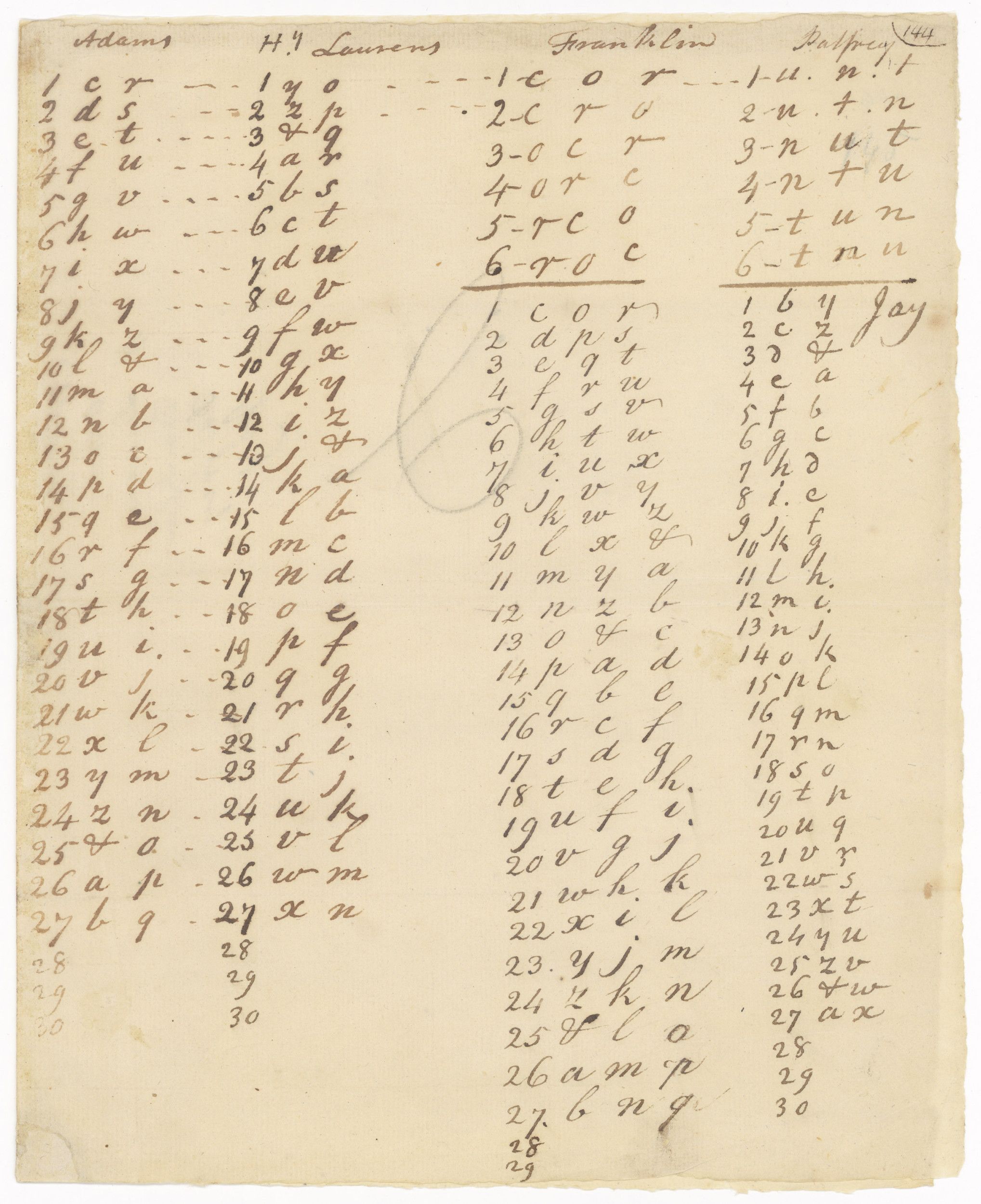
Ciphers Belonging to the Various American Peace Commissioners
Page 2
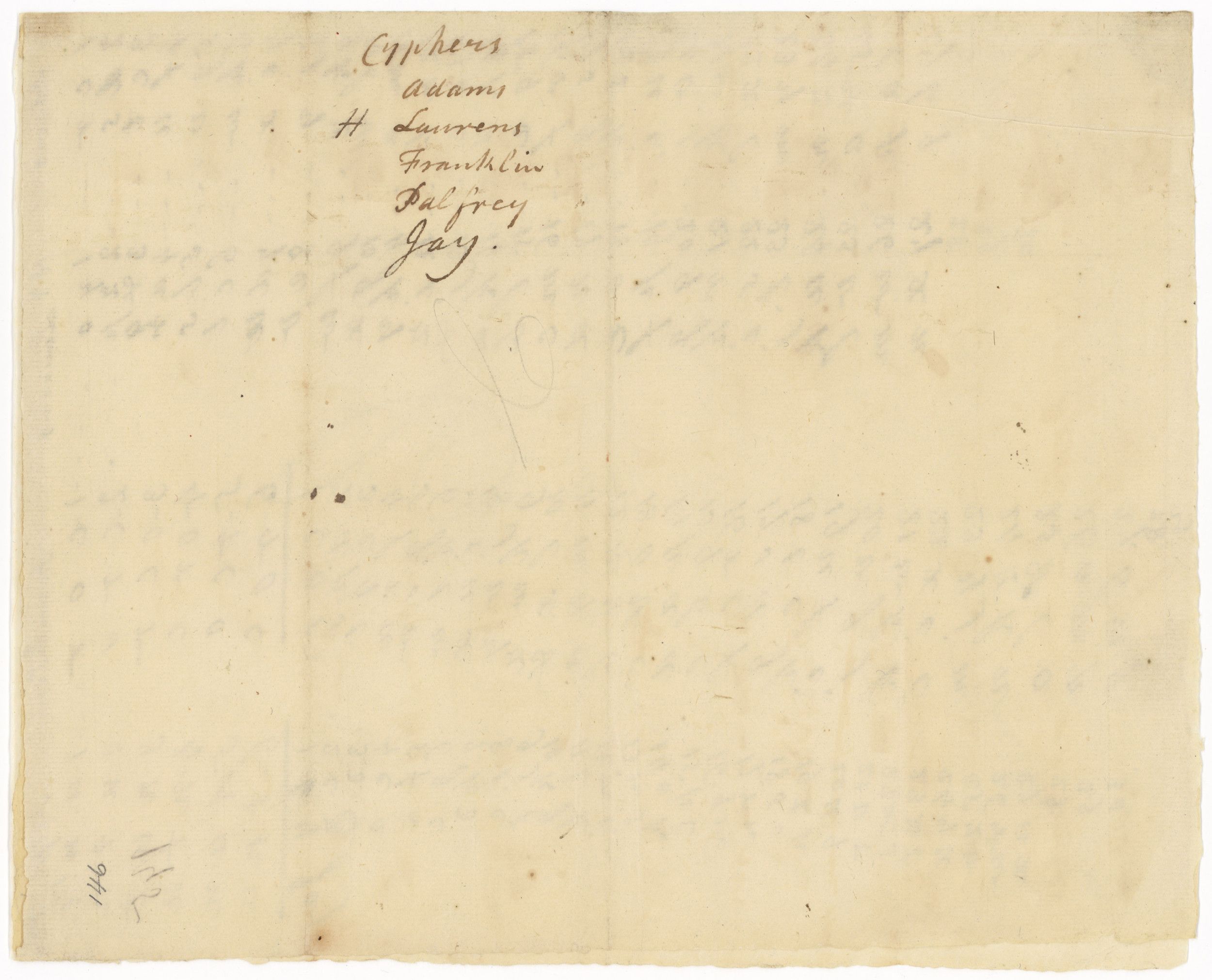
Document
Treaty of Paris
9/3/1783
This treaty, signed on September 3, 1783, between the American colonies and Great Britain, ended the American Revolution and formally recognized the United States as an independent nation.
The American War for Independence (1775-83) was actually a world conflict, involving not only the United States and Great Britain but also France, Spain, and the Netherlands. The peace process brought a vaguely formed, newly born United States into the arena of international diplomacy, playing against the largest, most sophisticated, and most established powers on earth.
The three American negotiators (in Great Britain) – John Adams, Benjamin Franklin, and John Jay – proved themselves to be masters of the game, outmaneuvering their counterparts and clinging fiercely to the points of national interest that guaranteed a future for the United States. Two crucial provisions of the treaty were British recognition of U.S. independence and the delineation of boundaries that would allow for American western expansion.
The treaty is named for the city in which it was negotiated and signed. The last page bears the signatures of David Hartley, who represented Great Britain, and the three American negotiators, who signed their names in alphabetical order.
For this treaty, the United States and British representatives signed at least three originals, two of which are in the holdings of the National Archives. On one of the signed originals the signatures and wax seals are arranged horizontally; on the other they are arranged vertically. In addition, handwritten certified copies were made for the use of Congress. Some online transcriptions of the treaty omit Delaware from the list of former colonies, but the original text does list Delaware.
This document was featured in “Rough Journal Page Documenting Ratification and Final Page of the Treaty of Paris, 1783” in the September 2008 National Council for the Social Studies (NCSS) publication Social Education.
The American War for Independence (1775-83) was actually a world conflict, involving not only the United States and Great Britain but also France, Spain, and the Netherlands. The peace process brought a vaguely formed, newly born United States into the arena of international diplomacy, playing against the largest, most sophisticated, and most established powers on earth.
The three American negotiators (in Great Britain) – John Adams, Benjamin Franklin, and John Jay – proved themselves to be masters of the game, outmaneuvering their counterparts and clinging fiercely to the points of national interest that guaranteed a future for the United States. Two crucial provisions of the treaty were British recognition of U.S. independence and the delineation of boundaries that would allow for American western expansion.
The treaty is named for the city in which it was negotiated and signed. The last page bears the signatures of David Hartley, who represented Great Britain, and the three American negotiators, who signed their names in alphabetical order.
For this treaty, the United States and British representatives signed at least three originals, two of which are in the holdings of the National Archives. On one of the signed originals the signatures and wax seals are arranged horizontally; on the other they are arranged vertically. In addition, handwritten certified copies were made for the use of Congress. Some online transcriptions of the treaty omit Delaware from the list of former colonies, but the original text does list Delaware.
This document was featured in “Rough Journal Page Documenting Ratification and Final Page of the Treaty of Paris, 1783” in the September 2008 National Council for the Social Studies (NCSS) publication Social Education.
Transcript
Duplicate. Original Definitive Treaty3 Sept. 1783
In the Name of the most Holy & undivided Trinity.
It having pleased the Divine Providence to dispose the Hearts of the most Serene and most Potent Prince George the Third, by the Grace of God, King of Great Britain, France, and Ireland, Defender of the Faith, Duke of Brunswick and Lunebourg, Arch- Treasurer and Prince Elector of the Holy Roman Empire etc.. and of the United States of America, to forget all past Misunderstandings and Differences that have unhappily interrupted the good Correspondence and Friendship which they mutually wish to restore; and to establish such a beneficial and satisfactory Intercourse between the two countries upon the ground of reciprocal Advantages and mutual Convenience as may promote and secure to both perpetual Peace and Harmony;
and having for this desirable End already laid the Foundation of Peace & Reconciliation by the Provisional Articles signed at Paris on the 30th of November 1782, by the Commissioners empowered on each Part, which Articles were agreed to be inserted in and constitute the Treaty of Peace proposed to be concluded between the Crown of Great Britain and the said United States, but which Treaty was not to be concluded until Terms of Peace should be agreed upon between Great Britain & France, and his Britannic Majesty should be ready to conclude such Treaty accordingly: and the treaty between Great Britain & France having since been concluded, his Britannic Majesty & the United States of America, in Order to carry into full Effect the Provisional Articles above mentioned, according to the Tenor thereof, have constituted & appointed, that is to say his Britannic Majesty
on his Part, David Hartley, Esqr., Member of the Parliament of Great Britain, and the said United States on their Part, - stop point - John Adams, Esqr., late a Commissioner of the United States of America at the Court of Versailles, late Delegate in Congress from the State of Massachusetts, and Chief Justice of the said State, and Minister Plenipotentiary of the said United States to their High Mightinesses the States General of the United Netherlands; - stop point - Benjamin Franklin, Esqr., late Delegate in Congress from the State of Pennsylvania, President of the Convention of the said State, and Minister Plenipotentiary from the United States of America at the Court of Versailles; John Jay, Esqr., late President of Congress and Chief Justice of the state of New York, and Minister Plenipotentiary from the said United States at the Court of Madrid; to be Plenipotentiaries for the concluding and signing the Present Definitive Treaty; who after having reciprocally communicated
their respective full Powers have agreed upon and confirmed the following Articles.
Article 1st:
His Brittanic Majesty acknowledges the said United States, viz., New Hampshire, Massachusetts Bay, Rhode Island and Providence Plantations, Connecticut, New York, New Jersey, Pennsylvania, Delaware, Maryland, Virginia, North Carolina, South Carolina and Georgia, to be free sovereign and Independent States; that he treats with them as such, and for himself his Heirs & Successors, relinquishes all claims to the Government, Propriety, and Territorial Rights of the same and every Part thereof.
Article 2d:
And that all Disputes which might arise in future on the subject of the Boundaries of the said United States may
be prevented, it is hereby agreed and declared, that the following are and shall be their Boundaries, viz.; from the Northwest Angle of Nova Scotia, viz., that Angle which is formed by a Line drawn due North from the Source of St. Croix River to the Highlands; along the said Highlands which divide those Rivers that empty themselves into the river St. Lawrence, from those which fall into the Atlantic Ocean, to the northwesternmost Head of Connecticut River; Thence down along the middle of that River to the forty-fifth Degree of North Latitude; From thence by a Line due West on said Latitude until it strikes the River Iroquois or Cataraquy; Thence along the middle of said River into Lake Ontario; through the Middle of said Lake until it strikes the Communication by Water between that Lake & Lake Erie; Thence along
the middle of said Communication into Lake Erie, through the middle of said Lake until it arrives at the Water Communication between that lake & Lake Huron; Thence along the middle of said Water Communication into the Lake Huron, thence through the middle of said Lake to the Water Communication between that Lake and Lake Superior; thence through Lake Superior Northward of the Isles Royal & Phelipeaux to the Long Lake; Thence through the middle of said Long Lake and the Water Communication between it & the Lake of the Woods, to the said Lake of the Woods; Thence through the said Lake to the most Northwestern Point thereof, and from thence on a due West Course to the river Mississippi; Thence by a Line to be drawn along the Middle of the said river Mississippi until it shall intersect the Northernmost
Part of the thirty-first Degree of North Latitude, South, by a Line to be drawn due East from the Determination of the Line last mentioned in the Latitude of thirty-one Degrees of the Equator to the middle of the River Apalachicola or Catahouche; Thence along the middle thereof to its junction with the Flint River; Thence straight to the Head of Saint Mary's River, and thence down along the middle of Saint Mary's River to the Atlantic Ocean. East, by a Line to be drawn along the Middle of the river Saint Croix, from its Mouth in the Bay of Fundy to its Source, and from its Source directly North to the aforesaid Highlands, which divide the Rivers that fall into the Atlantic Ocean from those which fall into the river Saint Lawrence; comprehending all Islands within twenty Leagues of any Part of the Shores of the United States, and lying between Lines to be drawn due East
from the Points where the aforesaid Boundaries between Nova Scotia on the one Part and East Florida on the other shall, respectively, touch the Bay of Fundy and the Atlantic Ocean, excepting such Islands as now are or heretofore have been within the limits of the said Province of Nova Scotia.
Article 3d:
It is agreed that the People of the United States shall continue to enjoy unmolested the Right to take Fish of every kind on the Grand Bank and on all the other Banks of Newfoundland, also in the Gulf of Saint Lawrence and at all other Places in the Sea, where the Inhabitants of both Countries used at any time heretofore to fish. And also that the Inhabitants of the United States shall have Liberty to take Fish of every Kind on such
Part of the Coast of Newfoundland as British Fishermen shall use, (but not to dry or cure the same on that Island) And also on the Coasts, Bays & Creeks of all other of his Brittanic Majesty's Dominions in America; and that the American Fishermen shall have Liberty to dry and cure Fish in any of the unsettled Bays, Harbors, and Creeks of Nova Scotia, Magdalen Islands, and Labrador, so long as the same shall remain unsettled, but so soon as the same or either of them shall be settled, it shall not be lawful for the said Fishermen to dry or cure Fish at such Settlement without a previous Agreement for that purpose with the Inhabitants, Proprietors, or Possessors of the Ground.
Article 4th:
It is agreed that Creditors on either Side shall meet with no lawful Impediment to the Recovery of the full
Value in Sterling Money of all bona fide Debts heretofore contracted.
Article 5th:
It is agreed that Congress shall earnestly recommend it to the Legislatures of the respective States to provide for the Restitution of all Estates, Rights, and Properties, which have been confiscated belonging to real British Subjects; and also of the Estates, Rights, and Properties of Persons resident in Districts in the Possession on his Majesty's Arms and who have not borne Arms against the said United States. And that Persons of any other Description shall have free Liberty to go to any Part or Parts of any of the thirteen United States and therein to remain twelve Months unmolested in their Endeavors to obtain the Restitution of such of their Estates – Rights & Properties as may
have been confiscated. And that Congress shall also earnestly recommend to the several States a Reconsideration and Revision of all Acts or Laws regarding the Premises, so as to render the said Laws or Acts perfectly consistent not only with Justice and Equity but with that Spirit of Conciliation which on the Return of the Blessings of Peace should universally prevail. And that Congress shall also earnestly recommend to the several States that the Estates, Rights, and Properties of such last mentioned Persons shall be restored to them, they refunding to any Persons who may be now in Possession the Bona fide Price (where any has been given) which such Persons may have paid on purchasing any of the said Lands, Rights, or Properties since the Confiscation.
And it is agreed that all Persons who have any Interest in confiscated
Lands, either by Debts, Marriage Settlements, or otherwise, shall meet with no lawful Impediment in the Prosecution of their just Rights.
Article 6th:
That there shall be no future Confiscations made nor any Prosecutions commenced against any Person or Persons for, or by Reason of the Part, which he or they may have taken in the present War, and that no Person shall on that Account suffer any future Loss or Damage, either in his Person, Liberty, or Property; and that those who may be in Confinement on such Charges at the Time of the Ratification of the Treaty in America shall be immediately set at Liberty, and the Prosecutions so commenced be discontinued.
Article 7th:
There shall be a firm and perpetual Peace between his Britanic Majesty and the said States, and between the Subjects of the one and the Citizens of the other, wherefore all Hostilities both by Sea and Land shall from henceforth cease: All prisoners on both Sides shall be set at Liberty, and his Britanic Majesty shall with all convenient speed, and without causing any Destruction, or carrying away any Negroes or other Property of the American inhabitants, withdraw all his Armies, Garrisons & Fleets from the said United States, and from every Post, Place and Harbour within the same; leaving in all Fortifications, the American Artillery that may be therein: And shall also Order & cause all Archives, Records, Deeds &
Papers belonging to any of the said States, or their Citizens, which in the Course of the War may have fallen into the hands of his Officers, to be forthwith restored and delivered to the proper States and Persons to whom they belong.
Article 8th:
The Navigation of the river Mississippi, from its source to the Ocean, shall forever remain free and open to the Subjects of Great Britain and the Citizens of the United States.
Article 9th:
In case it should so happen that any Place or Territory belonging to great Britain or to the United States should have been conquered by the Arms of either from the other before the Arrival of the said Provisional Articles in America, it is agreed that the same shall be restored
without Difficulty and without requiring any Compensation.
Article 10th:
The solemn Ratifications of the present Treaty expedited in good & due Form shall be exchanged between the contracting Parties in the Space of Six Months or sooner if possible to be computed from the Day of the Signature of the present Treaty. In witness whereof we the undersigned their Ministers Plenipotentiary have in their Name and in Virtue of our Full Powers, signed with our Hands the present Definitive Treaty, and caused the Seals of our Arms to be affixed thereto.
Done at Paris, this third day of September in the year of our Lord, one thousand seven hundred and eighty-three.
D HARTLEY (SEAL)
JOHN ADAMS (SEAL)
B FRANKLIN (SEAL)
JOHN JAY (SEAL)
This primary source comes from the General Records of the United States Government.
National Archives Identifier: 299805
Full Citation: Treaty of Paris; 9/3/1783; Perfected Treaties, 1778 - 1945; General Records of the United States Government, ; National Archives Building, Washington, DC. [Online Version, https://www.docsteach.org/documents/document/treaty-paris, April 25, 2024]Treaty of Paris
Page 1
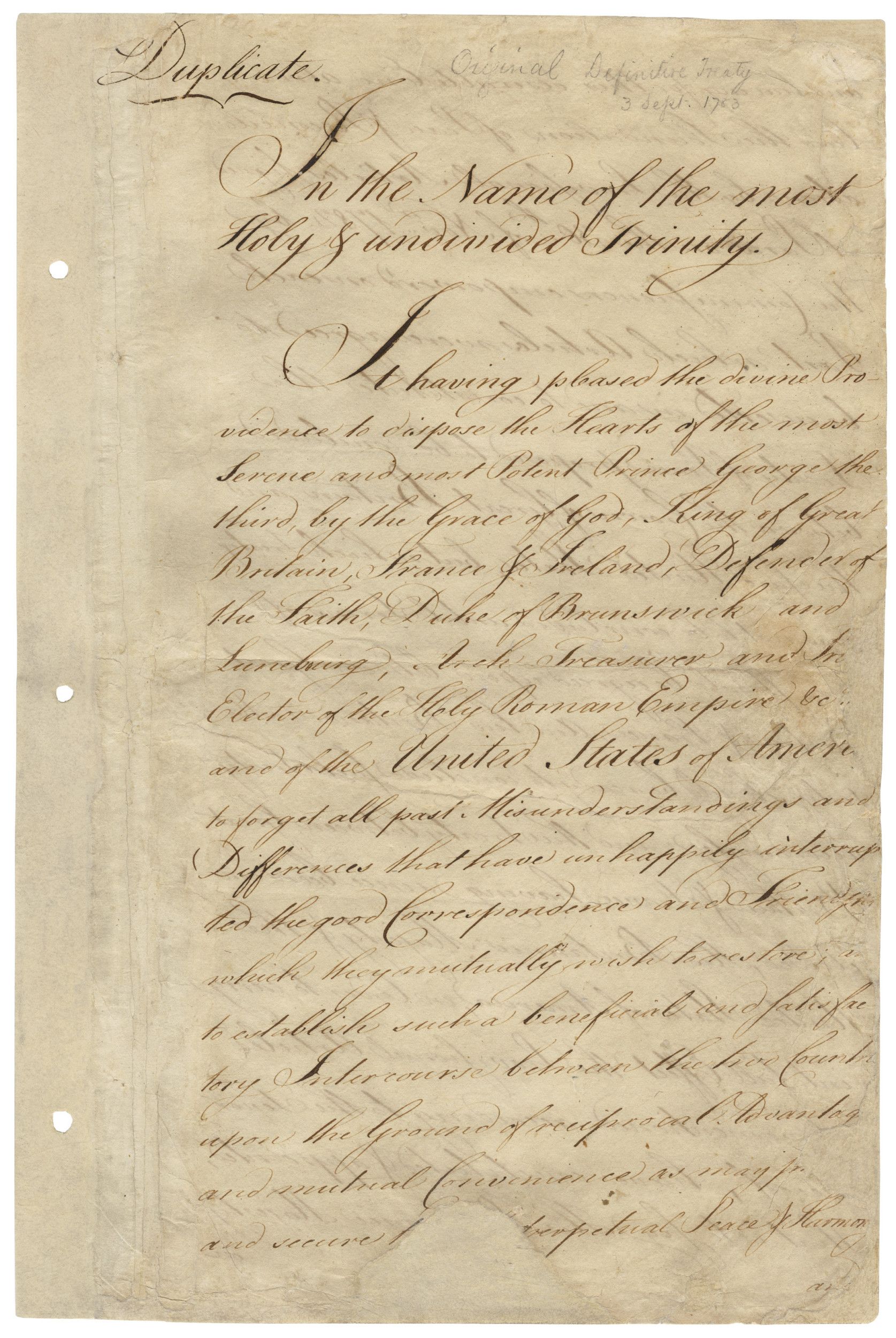
Treaty of Paris
Page 2
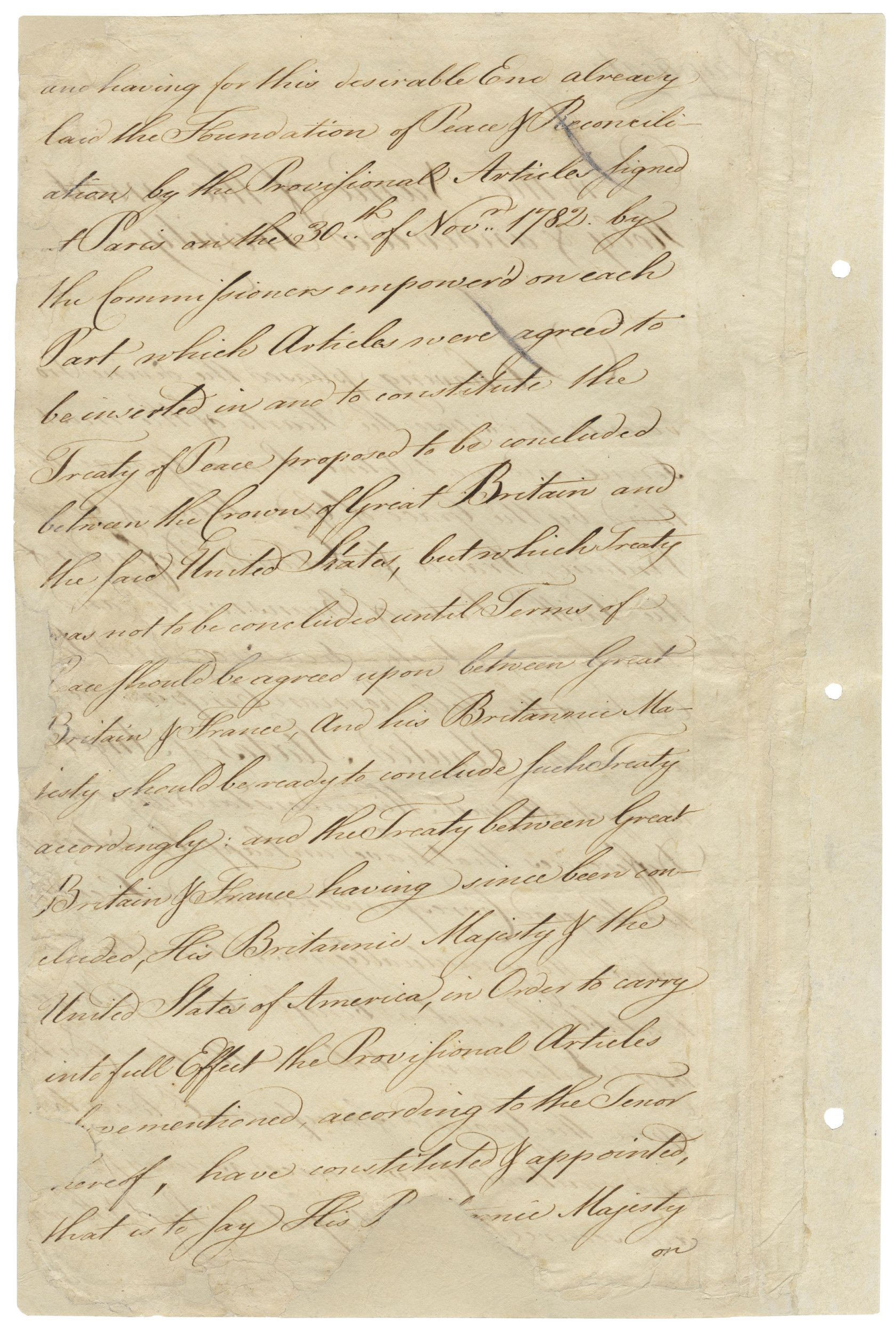
Treaty of Paris
Page 3
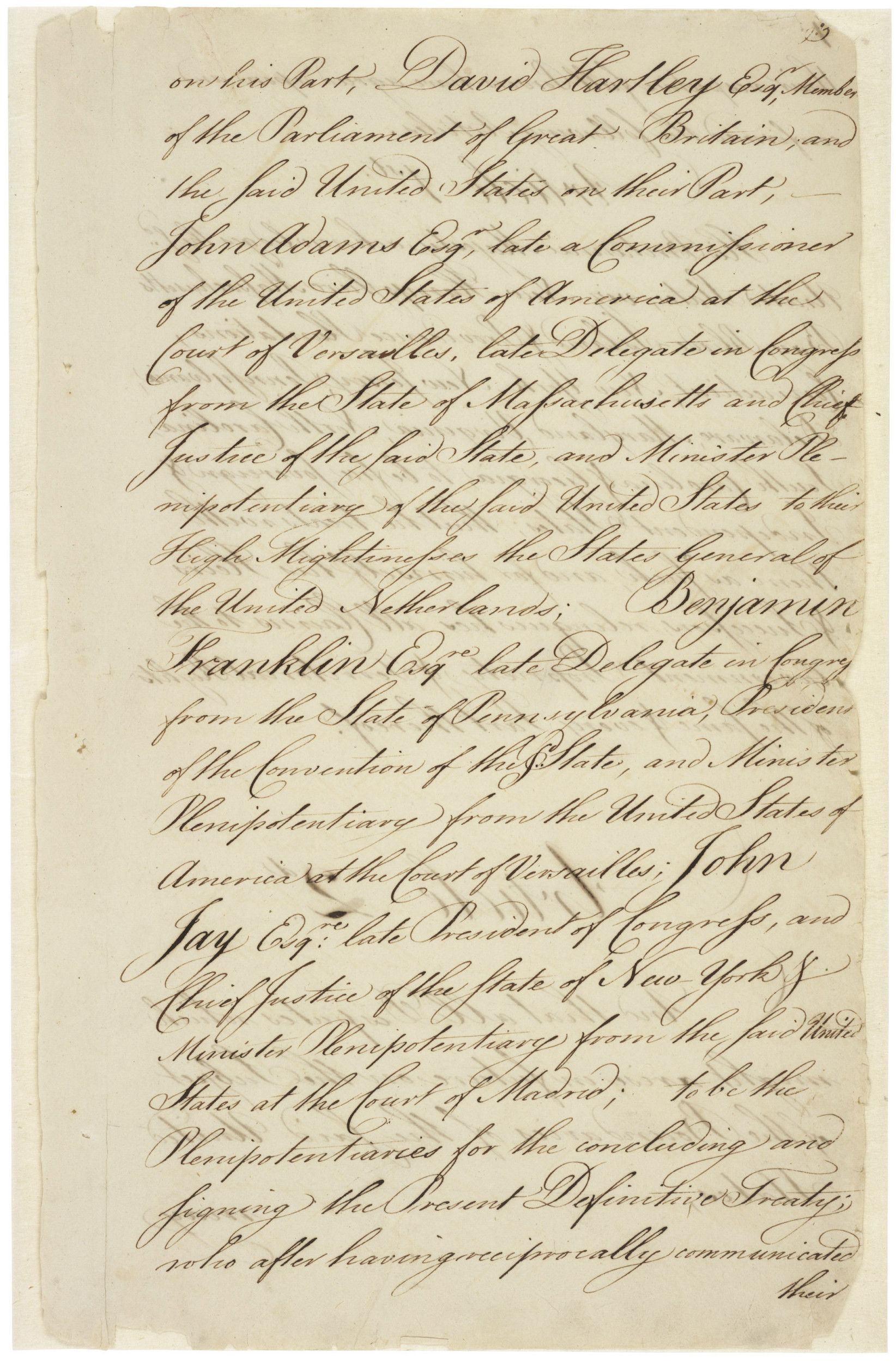
Treaty of Paris
Page 4

Treaty of Paris
Page 5

Treaty of Paris
Page 6
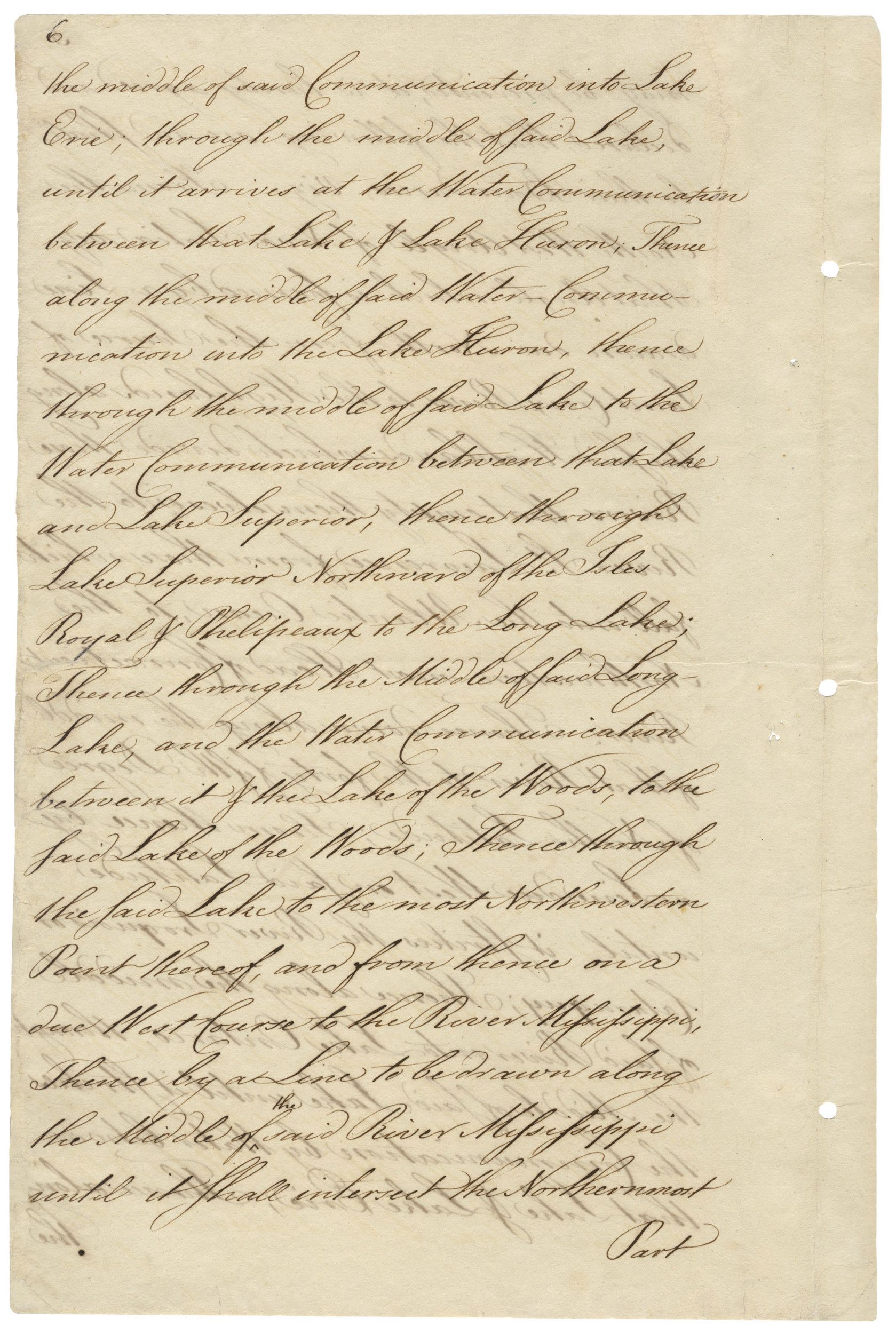
Treaty of Paris
Page 7

Treaty of Paris
Page 8
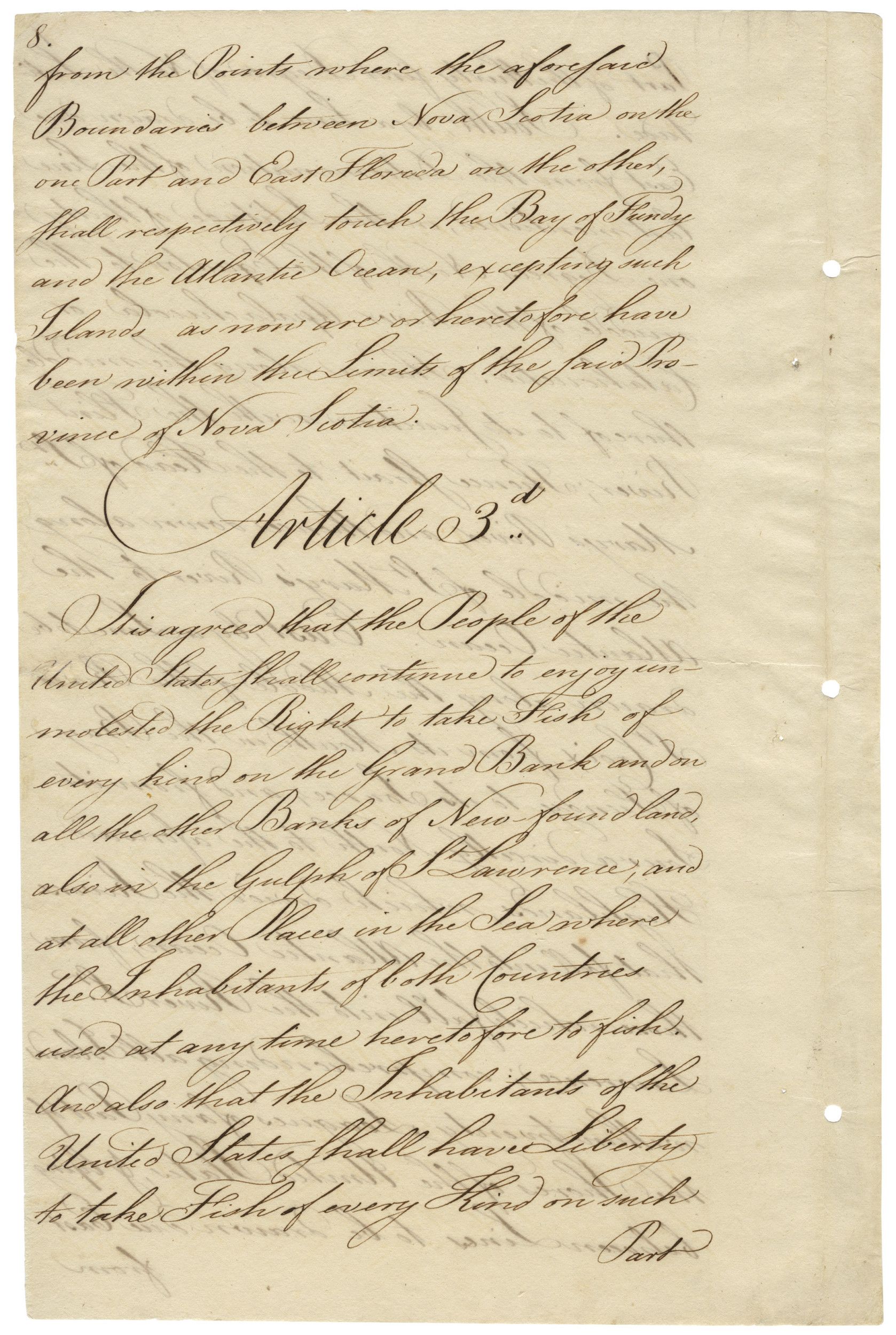
Treaty of Paris
Page 9
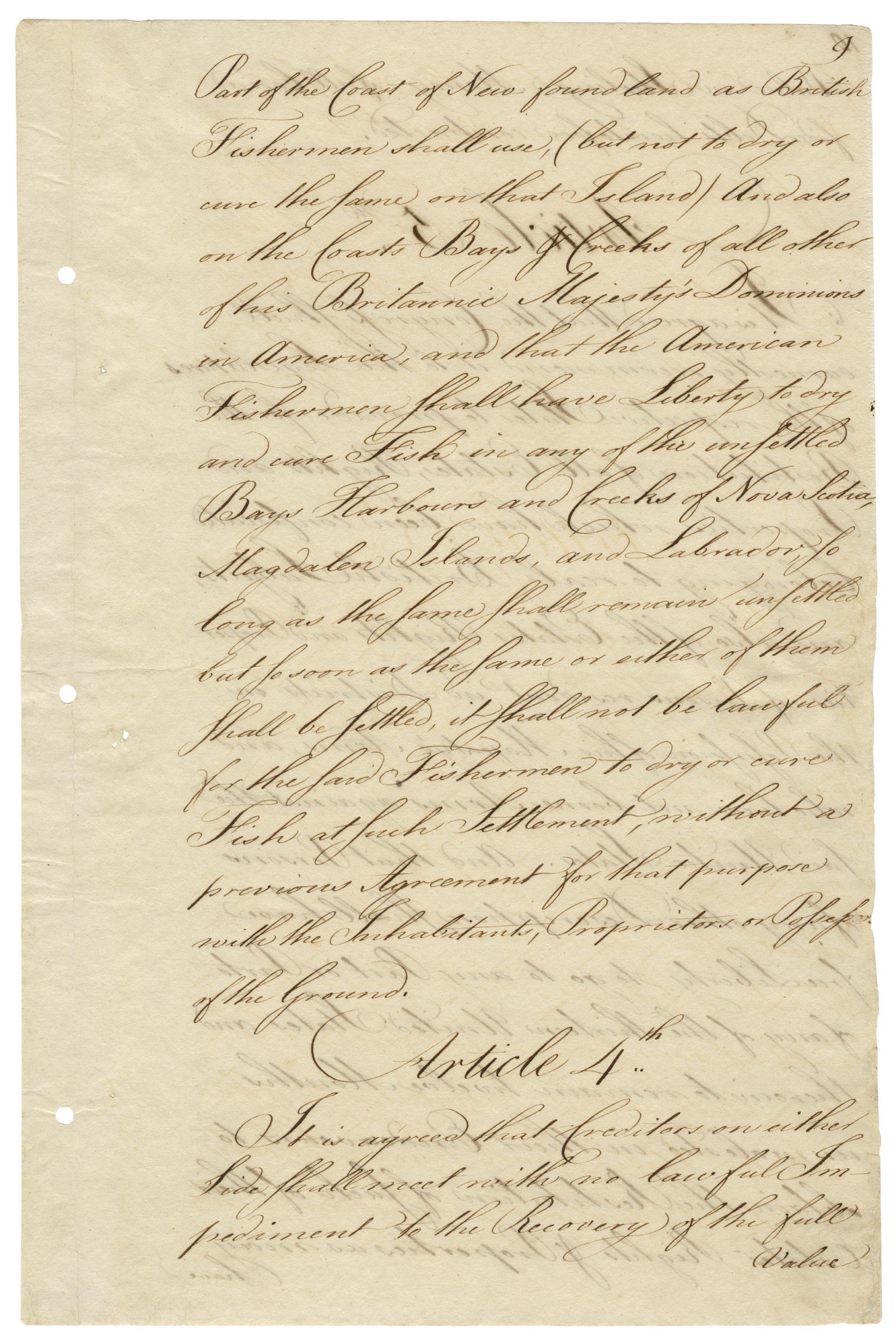
Treaty of Paris
Page 10

Treaty of Paris
Page 11
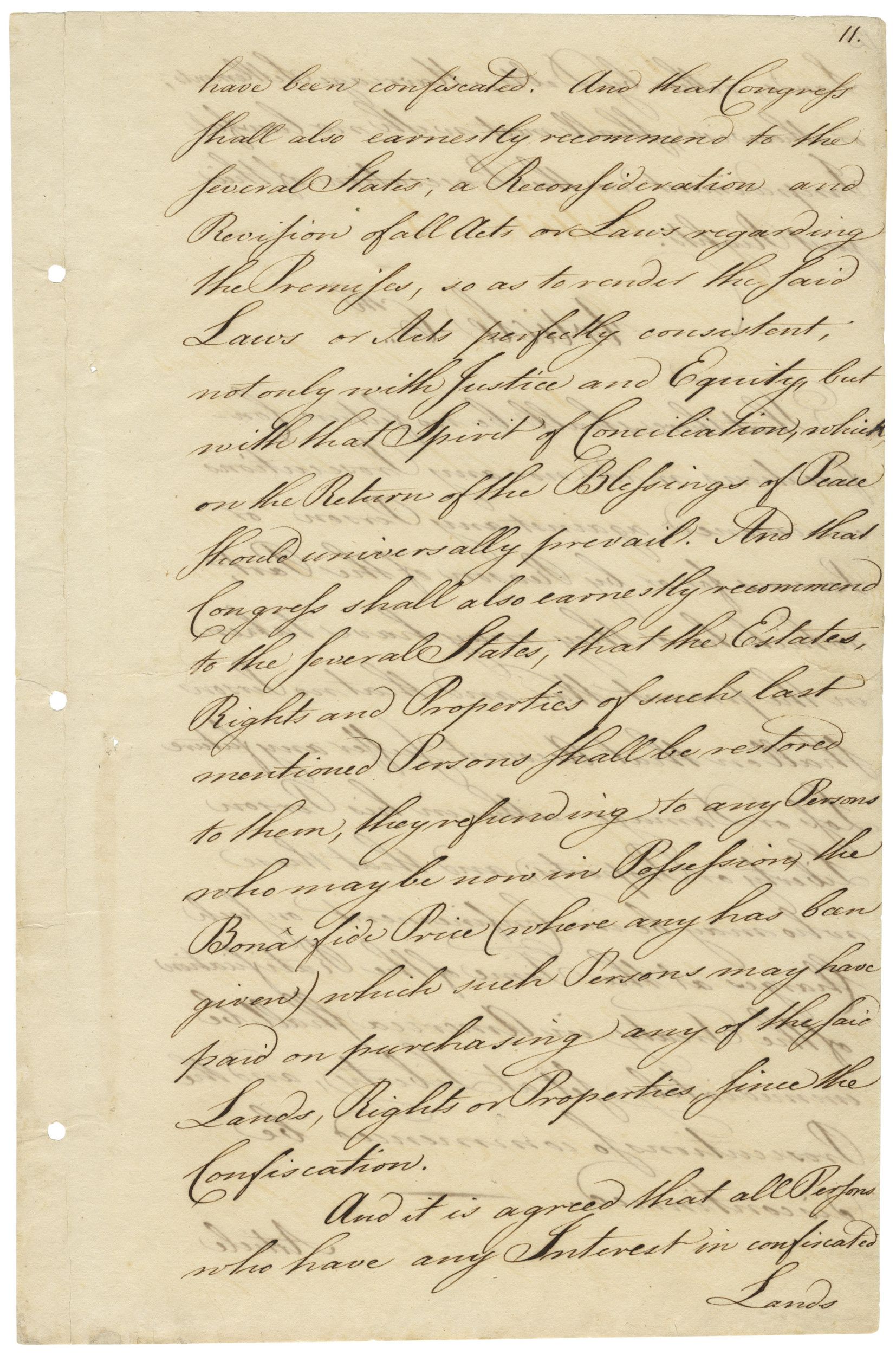
Treaty of Paris
Page 12

Treaty of Paris
Page 13
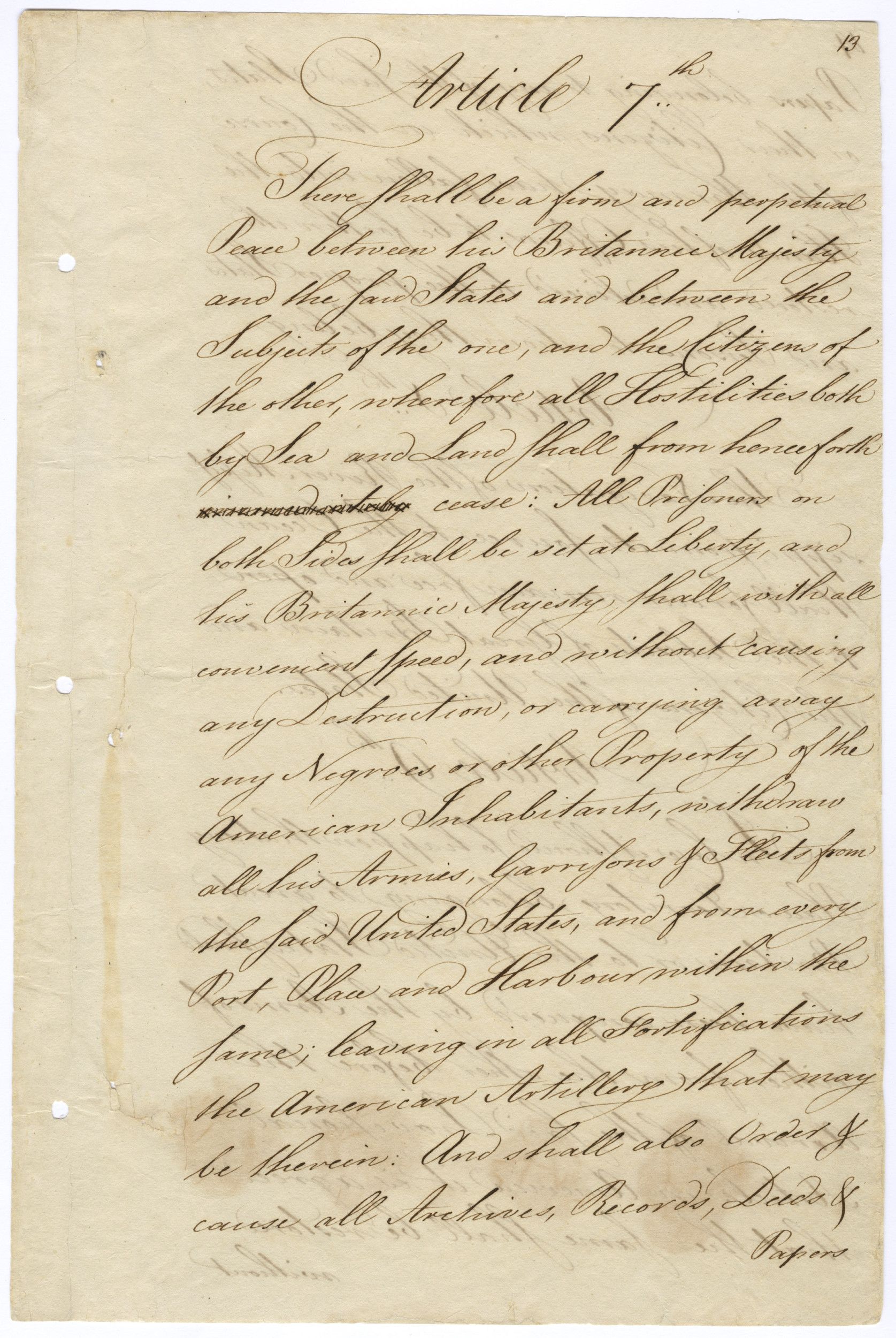
Treaty of Paris
Page 14
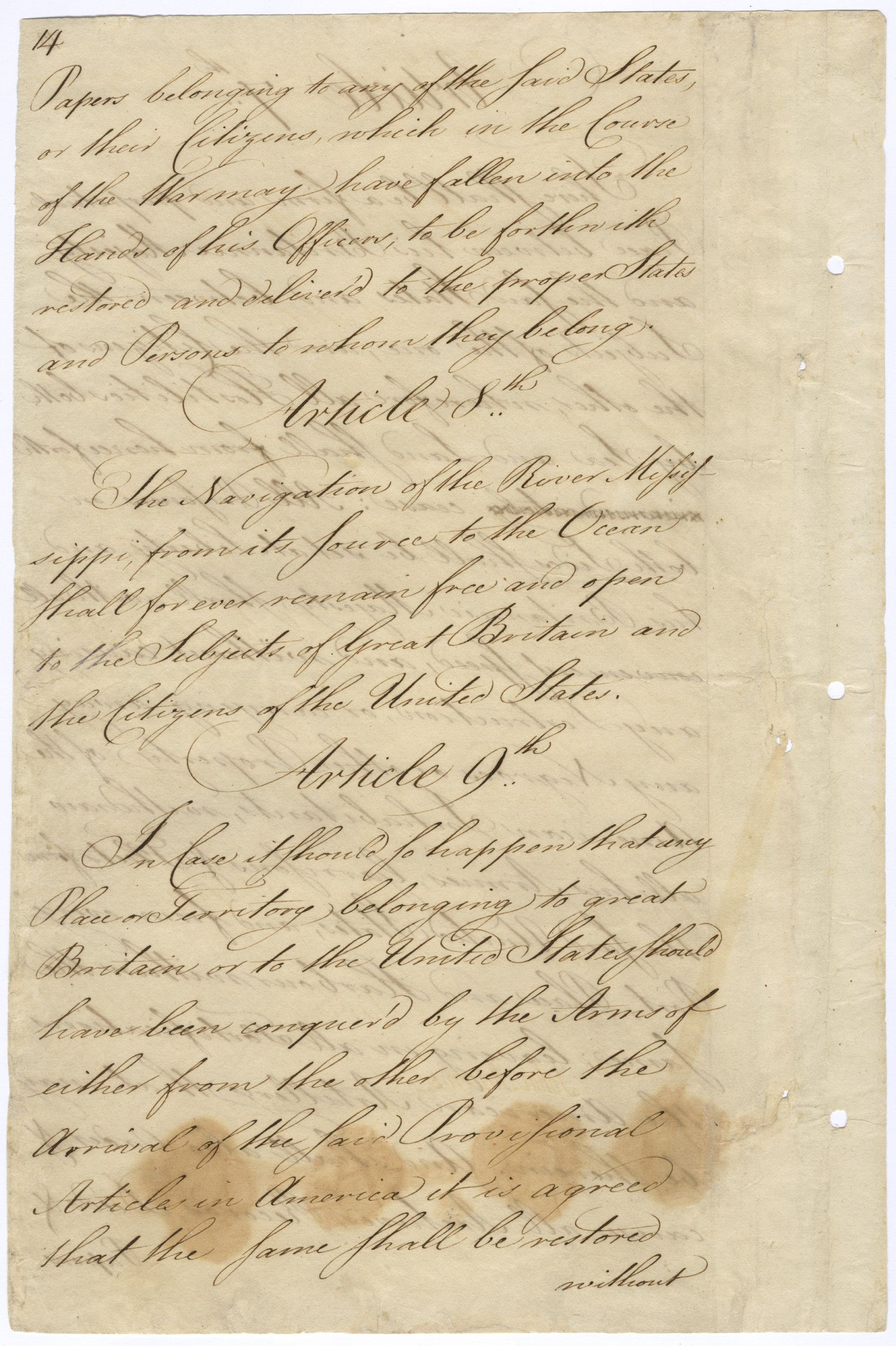
Treaty of Paris
Page 15
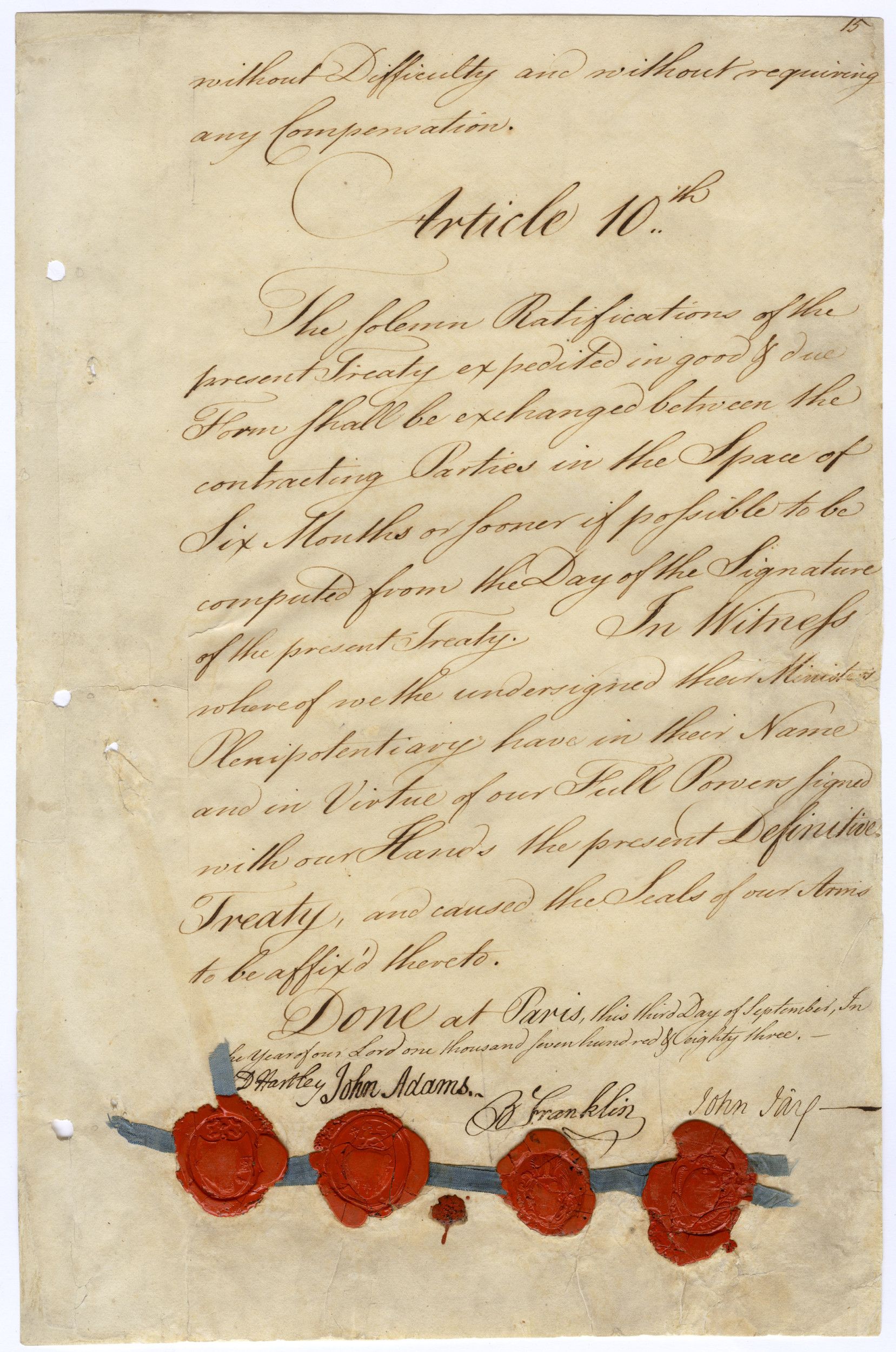
Document
Constitution of the United States
9/17/1787
Drafted in secret by delegates to the Constitutional Convention during the summer of 1787, this four-page document, signed on September 17, 1787, established the government of the United States.
The Federal Convention convened in the State House (Independence Hall) in Philadelphia on May 14, 1787, to revise the Articles of Confederation. Because the delegations from only two states were at first present, the members adjourned from day to day until a quorum of seven states was obtained on May 25. Through discussion and debate it became clear by mid-June that, rather than amend the existing Articles, the Convention would draft an entirely new frame of government.
All through the summer, in closed sessions, the delegates debated, and redrafted the articles of the new Constitution. Among the chief points at issue were how much power to allow the central government, how many representatives in Congress to allow each state, and how these representatives should be elected — directly by the people or by the state legislators. The work of many minds, the Constitution stands as a model of cooperative statesmanship and the art of compromise.
The Federal Convention convened in the State House (Independence Hall) in Philadelphia on May 14, 1787, to revise the Articles of Confederation. Because the delegations from only two states were at first present, the members adjourned from day to day until a quorum of seven states was obtained on May 25. Through discussion and debate it became clear by mid-June that, rather than amend the existing Articles, the Convention would draft an entirely new frame of government.
All through the summer, in closed sessions, the delegates debated, and redrafted the articles of the new Constitution. Among the chief points at issue were how much power to allow the central government, how many representatives in Congress to allow each state, and how these representatives should be elected — directly by the people or by the state legislators. The work of many minds, the Constitution stands as a model of cooperative statesmanship and the art of compromise.
Transcript
We the People of the United States, in Order to form a more perfect Union, establish Justice, insure domestic Tranquility, provide for the common defence, promote the general Welfare, and secure the Blessings of Liberty to ourselves and our Posterity, do ordain and establish this Constitution for the United States of America.Article. I.
Section. 1.
All legislative Powers herein granted shall be vested in a Congress of the United States, which shall consist of a Senate and House of Representatives.
Section. 2.
The House of Representatives shall be composed of Members chosen every second Year by the People of the several States, and the Electors in each State shall have the Qualifications requisite for Electors of the most numerous Branch of the State Legislature.
No Person shall be a Representative who shall not have attained to the Age of twenty five Years, and been seven Years a Citizen of the United States, and who shall not, when elected, be an Inhabitant of that State in which he shall be chosen.
Representatives and direct Taxes shall be apportioned among the several States which may be included within this Union, according to their respective Numbers, which shall be determined by adding to the whole Number of free Persons, including those bound to Service for a Term of Years, and excluding Indians not taxed, three fifths of all other Persons. The actual Enumeration shall be made within three Years after the first Meeting of the Congress of the United States, and within every subsequent Term of ten Years, in such Manner as they shall by Law direct. The Number of Representatives shall not exceed one for every thirty Thousand, but each State shall have at Least one Representative; and until such enumeration shall be made, the State of New Hampshire shall be entitled to chuse three, Massachusetts eight, Rhode-Island and Providence Plantations one, Connecticut five, New-York six, New Jersey four, Pennsylvania eight, Delaware one, Maryland six, Virginia ten, North Carolina five, South Carolina five, and Georgia three.
When vacancies happen in the Representation from any State, the Executive Authority thereof shall issue Writs of Election to fill such Vacancies.
The House of Representatives shall chuse their Speaker and other Officers; and shall have the sole Power of Impeachment.
Section. 3.
The Senate of the United States shall be composed of two Senators from each State, chosen by the Legislature thereof, for six Years; and each Senator shall have one Vote.
Immediately after they shall be assembled in Consequence of the first Election, they shall be divided as equally as may be into three Classes. The Seats of the Senators of the first Class shall be vacated at the Expiration of the second Year, of the second Class at the Expiration of the fourth Year, and of the third Class at the Expiration of the sixth Year, so that one third may be chosen every second Year; and if Vacancies happen by Resignation, or otherwise, during the Recess of the Legislature of any State, the Executive thereof may make temporary Appointments until the next Meeting of the Legislature, which shall then fill such Vacancies.
No Person shall be a Senator who shall not have attained to the Age of thirty Years, and been nine Years a Citizen of the United States, and who shall not, when elected, be an Inhabitant of that State for which he shall be chosen.
The Vice President of the United States shall be President of the Senate, but shall have no Vote, unless they be equally divided.
The Senate shall chuse their other Officers, and also a President pro tempore, in the Absence of the Vice President, or when he shall exercise the Office of President of the United States.
The Senate shall have the sole Power to try all Impeachments. When sitting for that Purpose, they shall be on Oath or Affirmation. When the President of the United States is tried, the Chief Justice shall preside: And no Person shall be convicted without the Concurrence of two thirds of the Members present.
Judgment in Cases of Impeachment shall not extend further than to removal from Office, and disqualification to hold and enjoy any Office of honor, Trust or Profit under the United States: but the Party convicted shall nevertheless be liable and subject to Indictment, Trial, Judgment and Punishment, according to Law.
Section. 4.
The Times, Places and Manner of holding Elections for Senators and Representatives, shall be prescribed in each State by the Legislature thereof; but the Congress may at any time by Law make or alter such Regulations, except as to the Places of chusing Senators.
The Congress shall assemble at least once in every Year, and such Meeting shall be on the first Monday in December, unless they shall by Law appoint a different Day.
Section. 5.
Each House shall be the Judge of the Elections, Returns and Qualifications of its own Members, and a Majority of each shall constitute a Quorum to do Business; but a smaller Number may adjourn from day to day, and may be authorized to compel the Attendance of absent Members, in such Manner, and under such Penalties as each House may provide.
Each House may determine the Rules of its Proceedings, punish its Members for disorderly Behaviour, and, with the Concurrence of two thirds, expel a Member.
Each House shall keep a Journal of its Proceedings, and from time to time publish the same, excepting such Parts as may in their Judgment require Secrecy; and the Yeas and Nays of the Members of either House on any question shall, at the Desire of one fifth of those Present, be entered on the Journal.
Neither House, during the Session of Congress, shall, without the Consent of the other, adjourn for more than three days, nor to any other Place than that in which the two Houses shall be sitting.
Section. 6.
The Senators and Representatives shall receive a Compensation for their Services, to be ascertained by Law, and paid out of the Treasury of the United States. They shall in all Cases, except Treason, Felony and Breach of the Peace, be privileged from Arrest during their Attendance at the Session of their respective Houses, and in going to and returning from the same; and for any Speech or Debate in either House, they shall not be questioned in any other Place.
No Senator or Representative shall, during the Time for which he was elected, be appointed to any civil Office under the Authority of the United States, which shall have been created, or the Emoluments whereof shall have been encreased during such time; and no Person holding any Office under the United States, shall be a Member of either House during his Continuance in Office.
Section. 7.
All Bills for raising Revenue shall originate in the House of Representatives; but the Senate may propose or concur with Amendments as on other Bills.
Every Bill which shall have passed the House of Representatives and the Senate, shall, before it become a Law, be presented to the President of the
United States; If he approve he shall sign it, but if not he shall return it, with his Objections to that House in which it shall have originated, who shall enter the Objections at large on their Journal, and proceed to reconsider it. If after such Reconsideration two thirds of that House shall agree to pass the Bill, it shall be sent, together with the Objections, to the other House, by which it shall likewise be reconsidered, and if approved by two thirds of that House, it shall become a Law. But in all such Cases the Votes of both Houses shall be determined by yeas and Nays, and the Names of the Persons voting for and against the Bill shall be entered on the Journal of each House respectively. If any Bill shall not be returned by the President within ten Days (Sundays excepted) after it shall have been presented to him, the Same shall be a Law, in like Manner as if he had signed it, unless the Congress by their Adjournment prevent its Return, in which Case it shall not be a Law.
Every Order, Resolution, or Vote to which the Concurrence of the Senate and House of Representatives may be necessary (except on a question of Adjournment) shall be presented to the President of the United States; and before the Same shall take Effect, shall be approved by him, or being disapproved by him, shall be repassed by two thirds of the Senate and House of Representatives, according to the Rules and Limitations prescribed in the Case of a Bill.
Section. 8.
The Congress shall have Power To lay and collect Taxes, Duties, Imposts and Excises, to pay the Debts and provide for the common Defence and general Welfare of the United States; but all Duties, Imposts and Excises shall be uniform throughout the United States;
To borrow Money on the credit of the United States;
To regulate Commerce with foreign Nations, and among the several States, and with the Indian Tribes;
To establish an uniform Rule of Naturalization, and uniform Laws on the subject of Bankruptcies throughout the United States;
To coin Money, regulate the Value thereof, and of foreign Coin, and fix the Standard of Weights and Measures;
To provide for the Punishment of counterfeiting the Securities and current Coin of the United States;
To establish Post Offices and post Roads;
To promote the Progress of Science and useful Arts, by securing for limited Times to Authors and Inventors the exclusive Right to their respective Writings and Discoveries;
To constitute Tribunals inferior to the supreme Court;
To define and punish Piracies and Felonies committed on the high Seas, and Offences against the Law of Nations;
To declare War, grant Letters of Marque and Reprisal, and make Rules concerning Captures on Land and Water;
To raise and support Armies, but no Appropriation of Money to that Use shall be for a longer Term than two Years;
To provide and maintain a Navy;
To make Rules for the Government and Regulation of the land and naval Forces;
To provide for calling forth the Militia to execute the Laws of the Union, suppress Insurrections and repel Invasions;
To provide for organizing, arming, and disciplining, the Militia, and for governing such Part of them as may be employed in the Service of the United States, reserving to the States respectively, the Appointment of the Officers, and the Authority of training the Militia according to the discipline prescribed by Congress;
To exercise exclusive Legislation in all Cases whatsoever, over such District (not exceeding ten Miles square) as may, by Cession of particular States, and the Acceptance of Congress, become the Seat of the Government of the United States, and to exercise like Authority over all Places purchased by the Consent of the Legislature of the State in which the Same shall be, for the Erection of Forts, Magazines, Arsenals, dock-Yards, and other needful Buildings;—And
To make all Laws which shall be necessary and proper for carrying into Execution the foregoing Powers, and all other Powers vested by this Constitution in the Government of the United States, or in any Department or Officer thereof.
Section. 9.
The Migration or Importation of such Persons as any of the States now existing shall think proper to admit, shall not be prohibited by the Congress prior to the Year one thousand eight hundred and eight, but a Tax or duty may be imposed on such Importation, not exceeding ten dollars for each Person.
The Privilege of the Writ of Habeas Corpus shall not be suspended, unless when in Cases of Rebellion or Invasion the public Safety may require it.
No Bill of Attainder or ex post facto Law shall be passed.
No Capitation, or other direct, Tax shall be laid, unless in Proportion to the Census or enumeration herein before directed to be taken.
No Tax or Duty shall be laid on Articles exported from any State.
No Preference shall be given by any Regulation of Commerce or Revenue to the Ports of one State over those of another: nor shall Vessels bound to, or from, one State, be obliged to enter, clear, or pay Duties in another.
No Money shall be drawn from the Treasury, but in Consequence of Appropriations made by Law; and a regular Statement and Account of the Receipts and Expenditures of all public Money shall be published from time to time.
No Title of Nobility shall be granted by the United States: And no Person holding any Office of Profit or Trust under them, shall, without the Consent of the Congress, accept of any present, Emolument, Office, or Title, of any kind whatever, from any King, Prince, or foreign State.
Section. 10.
No State shall enter into any Treaty, Alliance, or Confederation; grant Letters of Marque and Reprisal; coin Money; emit Bills of Credit; make any Thing but gold and silver Coin a Tender in Payment of Debts; pass any Bill of Attainder, ex post facto Law, or Law impairing the Obligation of Contracts, or grant any Title of Nobility.
No State shall, without the Consent of the Congress, lay any Imposts or Duties on Imports or Exports, except what may be absolutely necessary for executing it's inspection Laws: and the net Produce of all Duties and Imposts, laid by any State on Imports or Exports, shall be for the Use of the Treasury of the United States; and all such Laws shall be subject to the Revision and Controul of the Congress.
No State shall, without the Consent of Congress, lay any Duty of Tonnage, keep Troops, or Ships of War in time of Peace, enter into any Agreement or Compact with another State, or with a foreign Power, or engage in War, unless actually invaded, or in such imminent Danger as will not admit of delay.
Article. II.
Section. 1.
The executive Power shall be vested in a President of the United States of America. He shall hold his Office during the Term of four Years, and, together with the Vice President, chosen for the same Term, be elected, as follows
Each State shall appoint, in such Manner as the Legislature thereof may direct, a Number of Electors, equal to the whole Number of Senators and Representatives to which the State may be entitled in the Congress: but no Senator or Representative, or Person holding an Office of Trust or Profit under the United States, shall be appointed an Elector.
The Electors shall meet in their respective States, and vote by Ballot for two Persons, of whom one at least shall not be an Inhabitant of
the same State with themselves. And they shall make a List of all the Persons voted for, and of the Number of Votes for each; which List they shall sign and certify, and transmit sealed to the Seat of the Government of the United States, directed to the President of the Senate. The President of the Senate shall, in the Presence of the Senate and House of Representatives, open all the Certificates, and the Votes shall then be counted. The Person having the greatest Number of Votes shall be the President, if such Number be a Majority of the whole Number of Electors appointed; and if there be more than one who have such Majority, and have an equal Number of Votes, then the House of Representatives shall immediately chuse by Ballot one of them for President; and if no Person have a Majority, then from the five highest on the List the said House shall in like Manner chuse the President. But in chusing the President, the Votes shall be taken by States, the Representation from each State having one Vote; A quorum for this Purpose shall consist of a Member or Members from two thirds of the States, and a Majority of all the States shall be necessary to a Choice. In every Case, after the Choice of the President, the Person having the greatest Number of Votes of the Electors shall be the Vice President. But if there should remain two or more who have equal Votes, the Senate shall chuse from them by Ballot the Vice President.
The Congress may determine the Time of chusing the Electors, and the Day on which they shall give their Votes; which Day shall be the same throughout the United States.
No Person except a natural born Citizen, or a Citizen of the United States, at the time of the Adoption of this Constitution, shall be eligible to the Office of President; neither shall any Person be eligible to that Office who shall not have attained to the Age of thirty five Years, and been fourteen Years a Resident within the United States.
In Case of the Removal of the President from Office, or of his Death, Resignation, or Inability to discharge the Powers and Duties of the said Office, the Same shall devolve on the Vice President, and the Congress may by Law provide for the Case of Removal, Death, Resignation or Inability, both of the President and Vice President, declaring what Officer shall then act as President, and such Officer shall act accordingly, until the Disability be removed, or a President shall be elected.
The President shall, at stated Times, receive for his Services, a Compensation, which shall neither be encreased nor diminished during the Period for which he shall have been elected, and he shall not receive within that Period any other Emolument from the United States, or any of them.
Before he enter on the Execution of his Office, he shall take the following Oath or Affirmation:—"I do solemnly swear (or affirm) that I will faithfully execute the Office of President of the United States, and will to the best of my Ability, preserve, protect and defend the Constitution of the United States."
Section. 2.
The President shall be Commander in Chief of the Army and Navy of the United States, and of the Militia of the several States, when called into the actual Service of the United States; he may require the Opinion, in writing, of the principal Officer in each of the executive Departments, upon any Subject relating to the Duties of their respective Offices, and he shall have Power to grant Reprieves and Pardons for Offences against the United States, except in Cases of Impeachment.
He shall have Power, by and with the Advice and Consent of the Senate, to make Treaties, provided two thirds of the Senators present concur; and he shall nominate, and by and with the Advice and Consent of the Senate, shall appoint Ambassadors, other public Ministers and Consuls, Judges of the supreme Court, and all other Officers of the United States, whose Appointments are not herein otherwise provided for, and which shall be established by Law: but the Congress may by Law vest the Appointment of such inferior Officers, as they think proper, in the President alone, in the Courts of Law, or in the Heads of Departments.
The President shall have Power to fill up all Vacancies that may happen during the Recess of the Senate, by granting Commissions which shall expire at the End of their next Session.
Section. 3.
He shall from time to time give to the Congress Information of the State of the Union, and recommend to their Consideration such Measures as he shall judge necessary and expedient; he may, on extraordinary Occasions, convene both Houses, or either of them, and in Case of Disagreement between them, with Respect to the Time of Adjournment, he may adjourn them to such Time as he shall think proper; he shall receive Ambassadors and other public Ministers; he shall take Care that the Laws be faithfully executed, and shall Commission all the Officers of the United States.
Section. 4.
The President, Vice President and all civil Officers of the United States, shall be removed from Office on Impeachment for, and Conviction of, Treason, Bribery, or other high Crimes and Misdemeanors.
Article III.
Section. 1.
The judicial Power of the United States, shall be vested in one supreme Court, and in such inferior Courts as the Congress may from time to time ordain and establish. The Judges, both of the supreme and inferior Courts, shall hold their Offices during good Behaviour, and shall, at stated Times, receive for their Services, a Compensation, which shall not be diminished during their Continuance in Office.
Section. 2.
The judicial Power shall extend to all Cases, in Law and Equity, arising under this Constitution, the Laws of the United States, and Treaties made, or which shall be made, under their Authority;—to all Cases affecting Ambassadors, other public Ministers and Consuls;—to all Cases of admiralty and maritime Jurisdiction;—to Controversies to which the United States shall be a Party;—to Controversies between two or more States;— between a State and Citizens of another State,—between Citizens of different States,—between Citizens of the same State claiming Lands under Grants of different States, and between a State, or the Citizens thereof, and foreign States, Citizens or Subjects.
In all Cases affecting Ambassadors, other public Ministers and Consuls, and those in which a State shall be Party, the supreme Court shall have original Jurisdiction. In all the other Cases before mentioned, the supreme Court shall have appellate Jurisdiction, both as to Law and Fact, with such Exceptions, and under such Regulations as the Congress shall make.
The Trial of all Crimes, except in Cases of Impeachment, shall be by Jury; and such Trial shall be held in the State where the said Crimes shall have been committed; but when not committed within any State, the Trial shall be at such Place or Places as the Congress may by Law have directed.
Section. 3.
Treason against the United States, shall consist only in levying War against them, or in adhering to their Enemies, giving them Aid and Comfort. No Person shall be convicted of Treason unless on the Testimony of two Witnesses to the same overt Act, or on Confession in open Court.
The Congress shall have Power to declare the Punishment of Treason, but no Attainder of Treason shall work Corruption of Blood, or Forfeiture except during the Life of the Person attainted.
Article. IV.
Section. 1.
Full Faith and Credit shall be given in each State to the public Acts, Records, and judicial Proceedings of every other State. And the
Congress may by general Laws prescribe the Manner in which such Acts, Records and Proceedings shall be proved, and the Effect thereof.
Section. 2.
The Citizens of each State shall be entitled to all Privileges and Immunities of Citizens in the several States.
A Person charged in any State with Treason, Felony, or other Crime, who shall flee from Justice, and be found in another State, shall on Demand of the executive Authority of the State from which he fled, be delivered up, to be removed to the State having Jurisdiction of the Crime.
No Person held to Service or Labour in one State, under the Laws thereof, escaping into another, shall, in Consequence of any Law or Regulation therein, be discharged from such Service or Labour, but shall be delivered up on Claim of the Party to whom such Service or Labour may be due.
Section. 3.
New States may be admitted by the Congress into this Union; but no new State shall be formed or erected within the Jurisdiction of any other State; nor any State be formed by the Junction of two or more States, or Parts of States, without the Consent of the Legislatures of the States concerned as well as of the Congress.
The Congress shall have Power to dispose of and make all needful Rules and Regulations respecting the Territory or other Property belonging to the United States; and nothing in this Constitution shall be so construed as to Prejudice any Claims of the United States, or of any particular State.
Section. 4.
The United States shall guarantee to every State in this Union a Republican Form of Government, and shall protect each of them against Invasion; and on Application of the Legislature, or of the Executive (when the Legislature cannot be convened), against domestic Violence.
Article. V.
The Congress, whenever two thirds of both Houses shall deem it necessary, shall propose Amendments to this Constitution, or, on the Application of the Legislatures of two thirds of the several States, shall call a Convention for proposing Amendments, which, in either Case, shall be valid to all Intents and Purposes, as Part of this Constitution, when ratified by the Legislatures of three fourths of the several States, or by Conventions in three fourths thereof, as the one or the other Mode of Ratification may be proposed by the Congress; Provided that no Amendment which may be made prior to the Year One thousand eight hundred and eight shall in any Manner affect the first and fourth Clauses in the Ninth Section of the first Article; and that no State, without its Consent, shall be deprived of its equal Suffrage in the Senate.
Article. VI.
All Debts contracted and Engagements entered into, before the Adoption of this Constitution, shall be as valid against the United States under this Constitution, as under the Confederation.
This Constitution, and the Laws of the United States which shall be made in Pursuance thereof; and all Treaties made, or which shall be made, under the Authority of the United States, shall be the supreme Law of the Land; and the Judges in every State shall be bound thereby, any Thing in the Constitution or Laws of any State to the Contrary notwithstanding.
The Senators and Representatives before mentioned, and the Members of the several State Legislatures, and all executive and judicial Officers, both of the United States and of the several States, shall be bound by Oath or Affirmation, to support this Constitution; but no religious Test shall ever be required as a Qualification to any Office or public Trust under the United States.
Article. VII.
The Ratification of the Conventions of nine States, shall be sufficient for the Establishment of this Constitution between the States so ratifying the Same.
The Word, "the," being interlined between the seventh and eighth Lines of the first Page, The Word "Thirty" being partly written on an Erazure in the fifteenth Line of the first Page, The Words "is tried" being interlined between the thirty second and thirty third Lines of the first Page and the Word "the" being interlined between the forty third and forty fourth Lines of the second Page.
Attest William Jackson Secretary
done in Convention by the Unanimous Consent of the States present the Seventeenth Day of September in the Year of our Lord one thousand seven hundred and Eighty seven and of the Independance of the United States of America the Twelfth In witness whereof We have hereunto subscribed our Names,
G°. Washington
Presidt and deputy from Virginia
Delaware
Geo: Read
Gunning Bedford jun
John Dickinson
Richard Bassett
Jaco: Broom
Maryland
James McHenry
Dan of St Thos. Jenifer
Danl. Carroll
Virginia
John Blair
James Madison Jr.
North Carolina
Wm. Blount
Richd. Dobbs Spaight
Hu Williamson
South Carolina
J. Rutledge
Charles Cotesworth Pinckney
Charles Pinckney
Pierce Butler
Georgia
William Few
Abr Baldwin
New Hampshire
John Langdon
Nicholas Gilman
Massachusetts
Nathaniel Gorham
Rufus King
Connecticut
Wm. Saml. Johnson
Roger Sherman
New York
Alexander Hamilton
New Jersey
Wil: Livingston
David Brearley
Wm. Paterson
Jona: Dayton
Pensylvania
B Franklin
Thomas Mifflin
Robt. Morris
Geo. Clymer
Thos. FitzSimons
Jared Ingersoll
James Wilson
Gouv Morris
This primary source comes from the General Records of the United States Government.
National Archives Identifier: 1667751
Full Citation: Constitution of the United States; 9/17/1787; The Constitution of the United States, 9/17/1787 - 9/17/1787; General Records of the United States Government, ; National Archives Building,Washington, DC. [Online Version, https://www.docsteach.org/documents/document/constitution, April 25, 2024]Constitution of the United States
Page 1
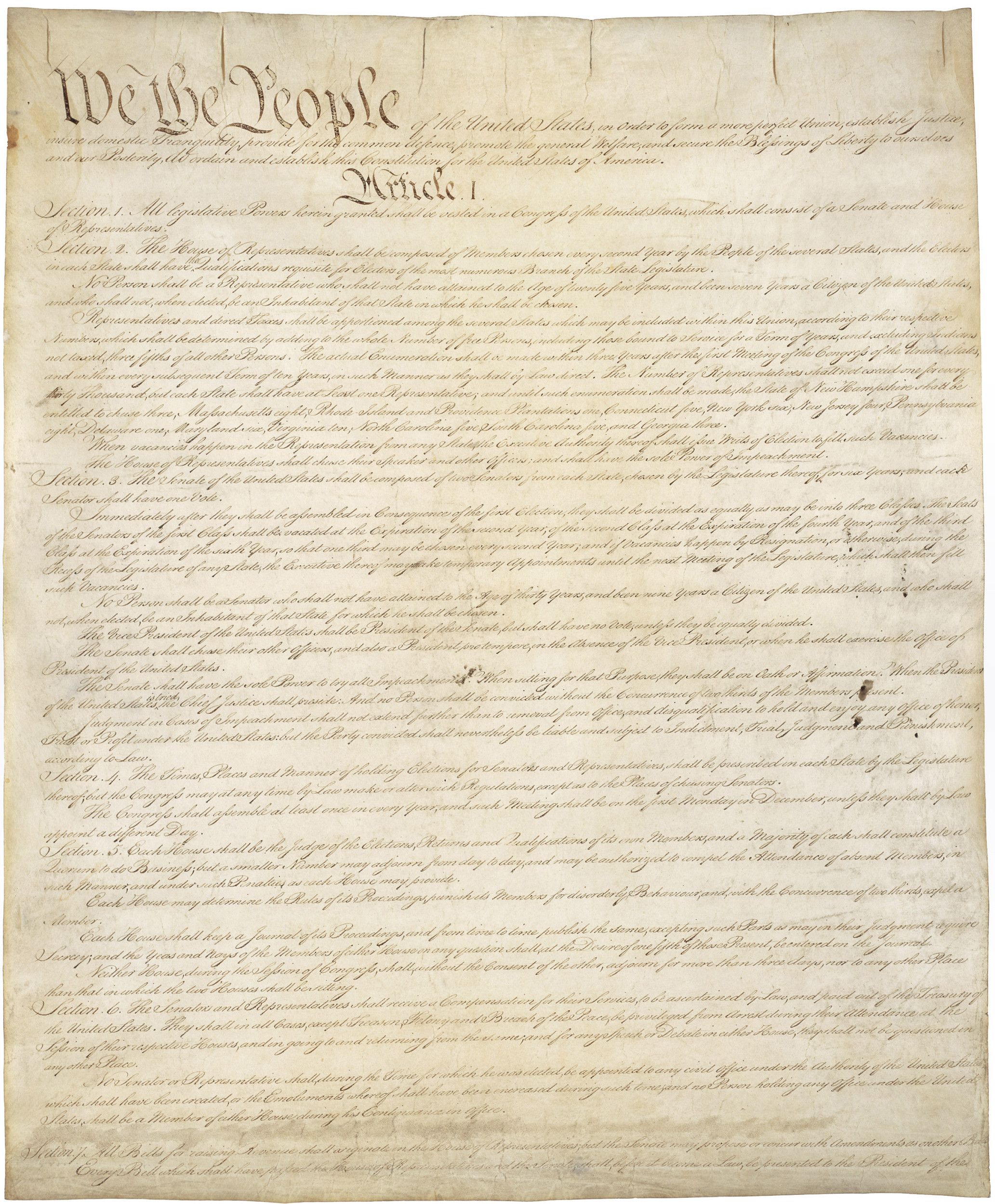
Constitution of the United States
Page 2
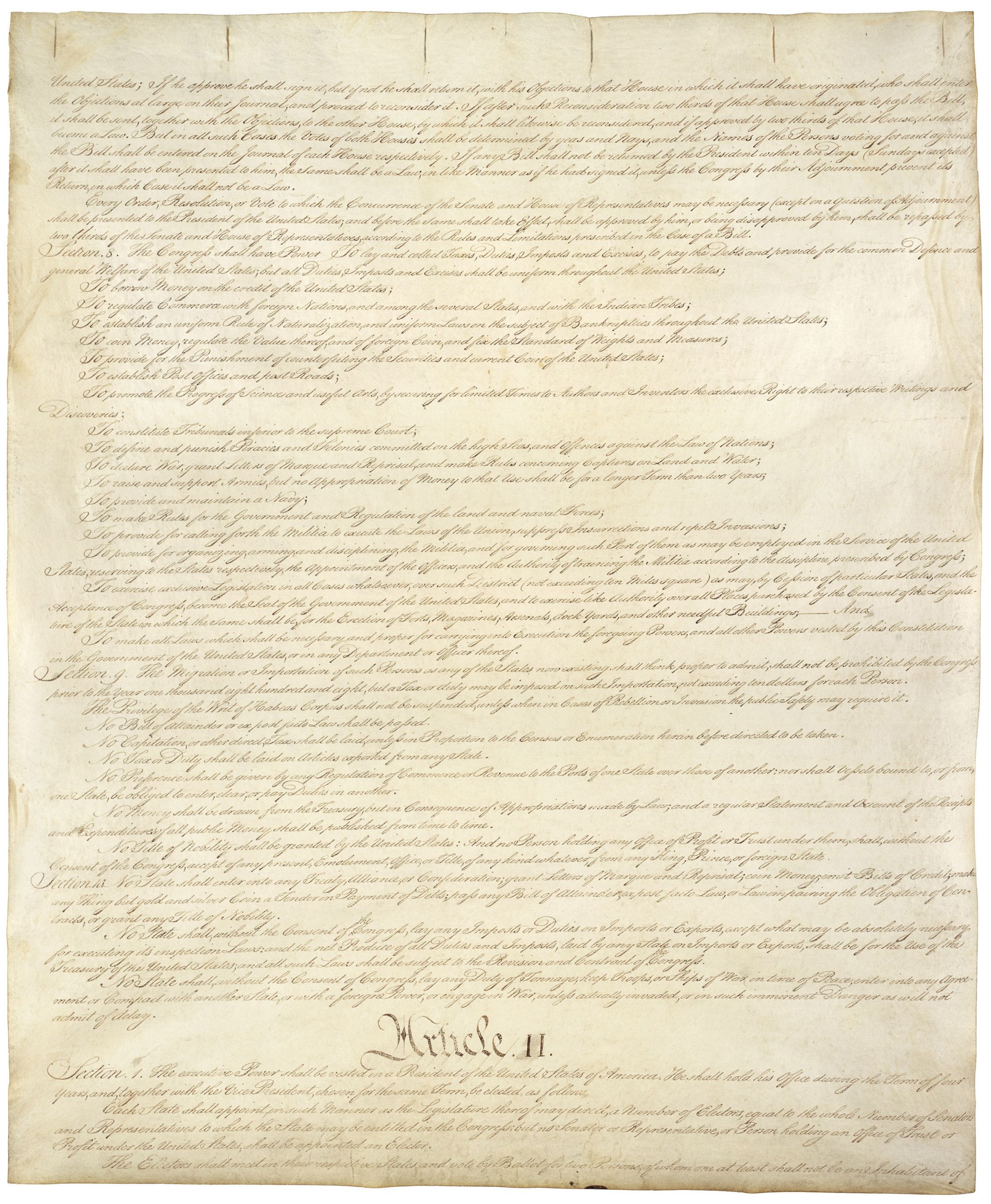
Constitution of the United States
Page 3
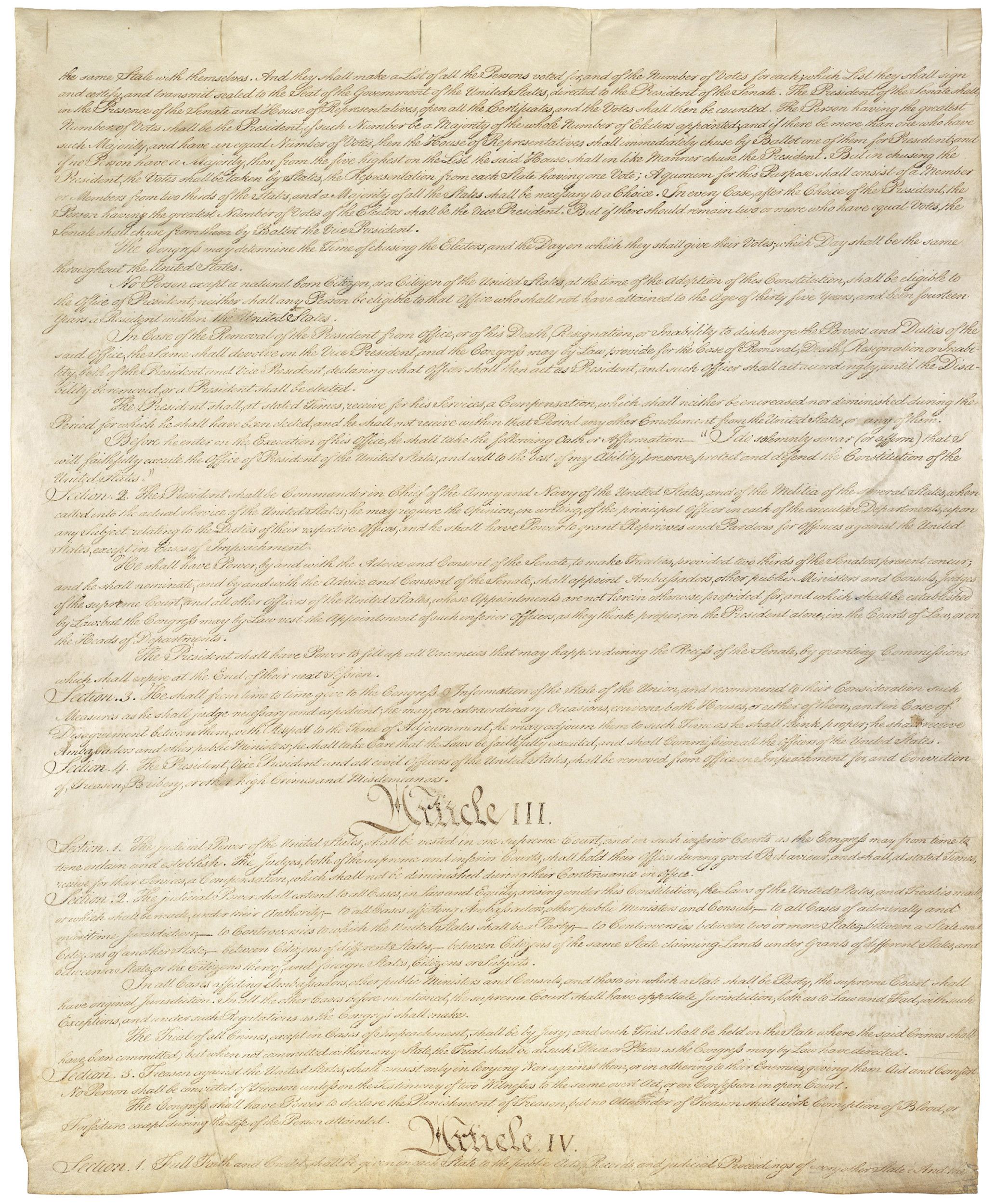
Constitution of the United States
Page 4
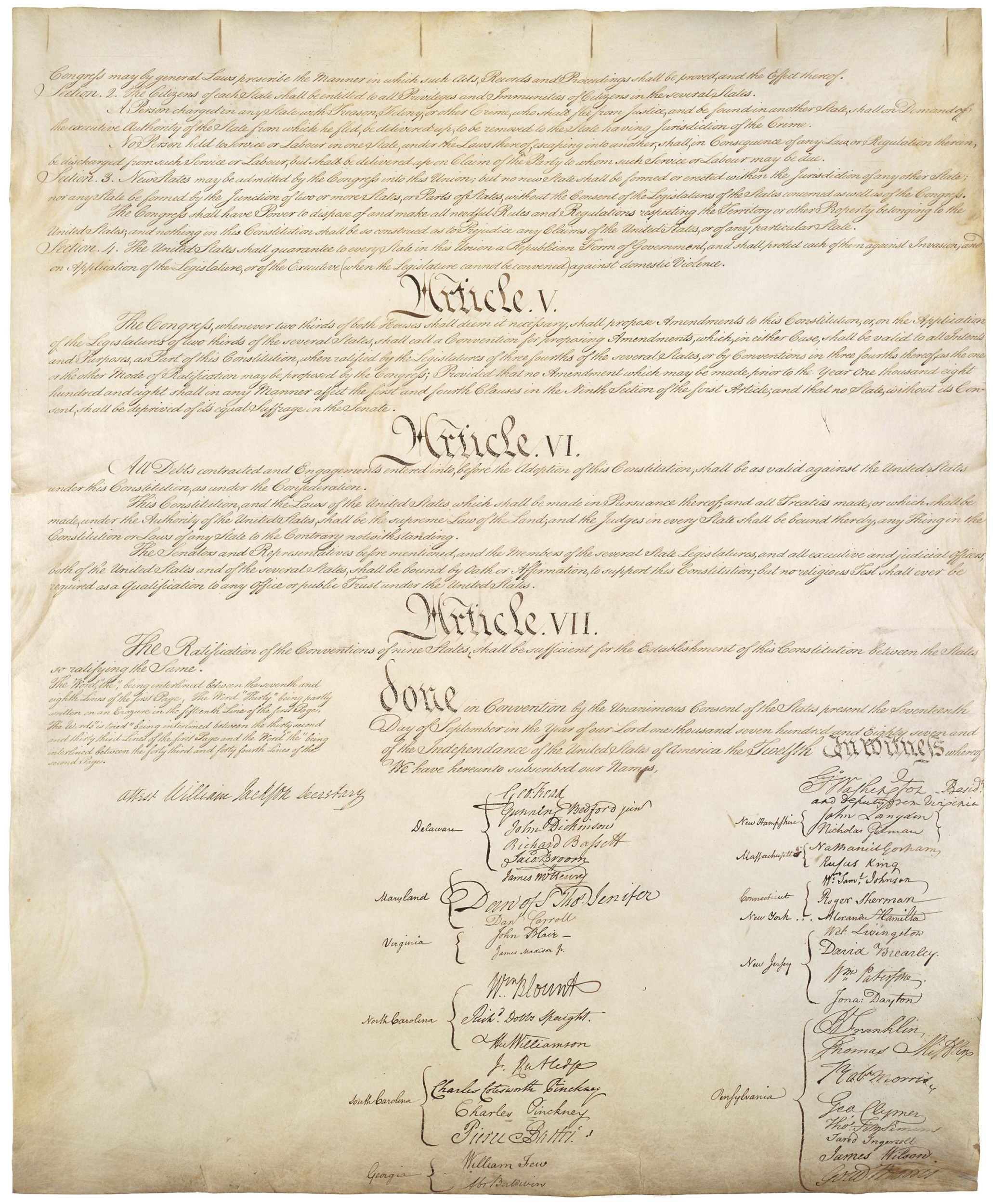
Document
Letter from Benjamin Franklin Transmitting a Letter from James Pemberton and a Petition from the Pennsylvania Society for Promoting the Abolition of Slavery to Vice President John Adams
2/1790
Benjamin Franklin sent this letter to Vice President John Adams, transmitting a letter from James Pemberton and a petition from the Pennsylvania Society for Promoting the Abolition of Slavery.
Franklin had signed the petition as member and president of the Pennsylvania Society, which was one of three organizations who sent anti-slavery petitions to the First U.S. Congress as part of the first unified campaign to abolish enslaving people. The three organizations were the Philadelphia and New York Yearly Meetings of the Society of Friends (Quakers) and the Pennsylvania Society for Promoting the Abolition of Slavery. The Pennsylvania Society was believed to be the most influential of the three organizations.
On February 3, 1790, Franklin signed this petition, which he sent to Congress on February 9, 1790. It called on Congress to "devise means for removing the Inconsistency from the Character of the American People" and to "promote mercy and justice toward this distressed Race." While Franklin's petition was considered the most radical, all three petitions sparked intense debate in the House and the Senate.
After a day of debate, the Senate decided to take no action on the petitions. The House referred them to a select committee for further consideration. The committee reported on March 5, 1790, stating that the Constitution restrained Congress from prohibiting the importation of enslaved people until 1808 and interfering with the emancipation of the enslaved. The House then tabled the petitions, effectively ending the debate on the issue of slavery in the First Congress.
Franklin had signed the petition as member and president of the Pennsylvania Society, which was one of three organizations who sent anti-slavery petitions to the First U.S. Congress as part of the first unified campaign to abolish enslaving people. The three organizations were the Philadelphia and New York Yearly Meetings of the Society of Friends (Quakers) and the Pennsylvania Society for Promoting the Abolition of Slavery. The Pennsylvania Society was believed to be the most influential of the three organizations.
On February 3, 1790, Franklin signed this petition, which he sent to Congress on February 9, 1790. It called on Congress to "devise means for removing the Inconsistency from the Character of the American People" and to "promote mercy and justice toward this distressed Race." While Franklin's petition was considered the most radical, all three petitions sparked intense debate in the House and the Senate.
After a day of debate, the Senate decided to take no action on the petitions. The House referred them to a select committee for further consideration. The committee reported on March 5, 1790, stating that the Constitution restrained Congress from prohibiting the importation of enslaved people until 1808 and interfering with the emancipation of the enslaved. The House then tabled the petitions, effectively ending the debate on the issue of slavery in the First Congress.
Transcript
Philadelphia, Feby 9th 1790Sir,
At the Request of the Pennsylvania Society for the Abolition of Slavery, I have Honour of presenting to your Excellency the enclosed Petition, which I beg leave to recommend to your favourable Notice. Some further Particulars respecting it, request by the Society, will appear in their Letter to me, of which I enclose a Copy, and have the Honour to be, Sir,
Your Excellency’s most obedient & most humble Servant B Franklin Presidt of the Society
His Excellency John Adams Esq Vice President of the United States
Copy [encircled]
Esteemed Friend,
Herewith are two Copies of a Memorial unanimously agreed to by the Pennsylvania Society for promoting the Abolition of Slavery &c. at a special Meeting held the 3rd Inst. and I have it in charge to request the President to sign and forward them by the first Post und Cover, one of them to the President of the Senate, & the other to the Speaker of the House of Representatives of the United States, with a few Lines desiring the Favor of each to embrace the earliest and most suitable Opportunity to present the Memorial to the House in which he presides, and if Directions can be given to have it published at large on their Minutes, it will be most agreeable to the Memorialists.
Thy respectful Friend
Benj Franklin Esq Jams Pemberton
President of the Pennsyla
Society for promoting The Abolition of Slavery &c. 2 mo. 5. 1790
To the Senate and House of Representatives of the United States of America
The memorial of the Pennsylvania Society for promoting the Abolition of Slavery, the relief of free Negroes unlawfully held in bondage, and the Improvement of the Condition of the African Race -
Respectfully Sheweth,
That from a regard for the happiness of Mankind an Association was formed several years since in this State by a number of her Citizens of various religious denominations for promoting the Abolition of Slavery and for the relief of those unlawfully held in bondage. A just and accurate Conception of the true Principles of liberty, as it spread through the land, produced accessions to their numbers, many friends to their Cause, and a legislative Co-operation with their views, which, by the blessing of Divine Providence, have been successfully directed to the relieving from bondage a large number of their fellow Creatures of the African Race - They have also the Satisfaction to observe, that in consequence of that Spirit of Philanthropy and genuine liberty which is generally diffusing its beneficial Influence, similar Institutions are gradually forming at home and abroad.
That mankind are all formed by the same Almighty being, alike objects of his Care and equally designed for the Enjoyment of Happiness the Christian Religion teaches us to believe, and the Political Creed of America fully coincides with the Position. Your Memorialists, particularly engaged in attending to the Distresses arising from Slavery, believe it their indispensable Duty to present this Subject to your notice - They have observed with great Satisfaction that many important and salutary Powers are vested in you for "promoting the Welfare and securing the blessing of liberty to the People of the United States". And as they conceive; that these blessing ought rightfully to be administered, without distinction of Colour, to all descriptions of People, so they indulge themselves in the pleasing expectation, that nothing which can be done for the relief of the unhappy objects of their care, will be either omitted or delayed.
From a persuasion that equal liberty was originally the Portion, and is still the Birthright of all Men, and influenced by the strong ties of Humanity and the Principles of their Institution, your Memorialists conceive themselves bound
[start underline in pencil] bound to use all justifiable endeavours to loosen the bands of Slavery [end underline] and promote a general Enjoyment of the blessings of Freedom. Under these Impressions they earnestly entreat your serious attention to the Subject of Slavery, that you will be pleased to countenance the [start underline in pencil] Restoration of Liberty [end underline] to those unhappy Men, who alone, in this land of Freedom, are degraded into perpetual Bondage, and who, amidst the general Joy of surrounding Freemen, are groaning in Servile Subjection, that you will devise means for removing this [start underline in pencil] Inconsistency from the Character of the American People [end underline] - that you will promote Mercy and Justice towards this distressed Race, and that you will Step to the very verge of the Powers vested in you for discouraging every Species of Traffick in the Persons of our fellow Men.
Philadelphia Febry 3: 1790
[signature]
B. Franklin
Presid[ent] of the Society
This primary source comes from the Records of the U.S. Senate.
National Archives Identifier: 306388
Full Citation: Letter from Benjamin Franklin Transmitting a Letter from James Pemberton and a Petition from the Pennsylvania Society for Promoting the Abolition of Slavery to Vice President John Adams; 2/1790; Petitions and Memorials and Resolutions of State Legislatures Submitted to the 1st Congress; Petitions and Related Documents That Were Presented, Read, or Tabled, 1789 - 1966; Records of the U.S. Senate, ; National Archives Building, Washington, DC. [Online Version, https://www.docsteach.org/documents/document/franklin-adams-slavery-petition, April 25, 2024]Letter from Benjamin Franklin Transmitting a Letter from James Pemberton and a Petition from the Pennsylvania Society for Promoting the Abolition of Slavery to Vice President John Adams
Page 1
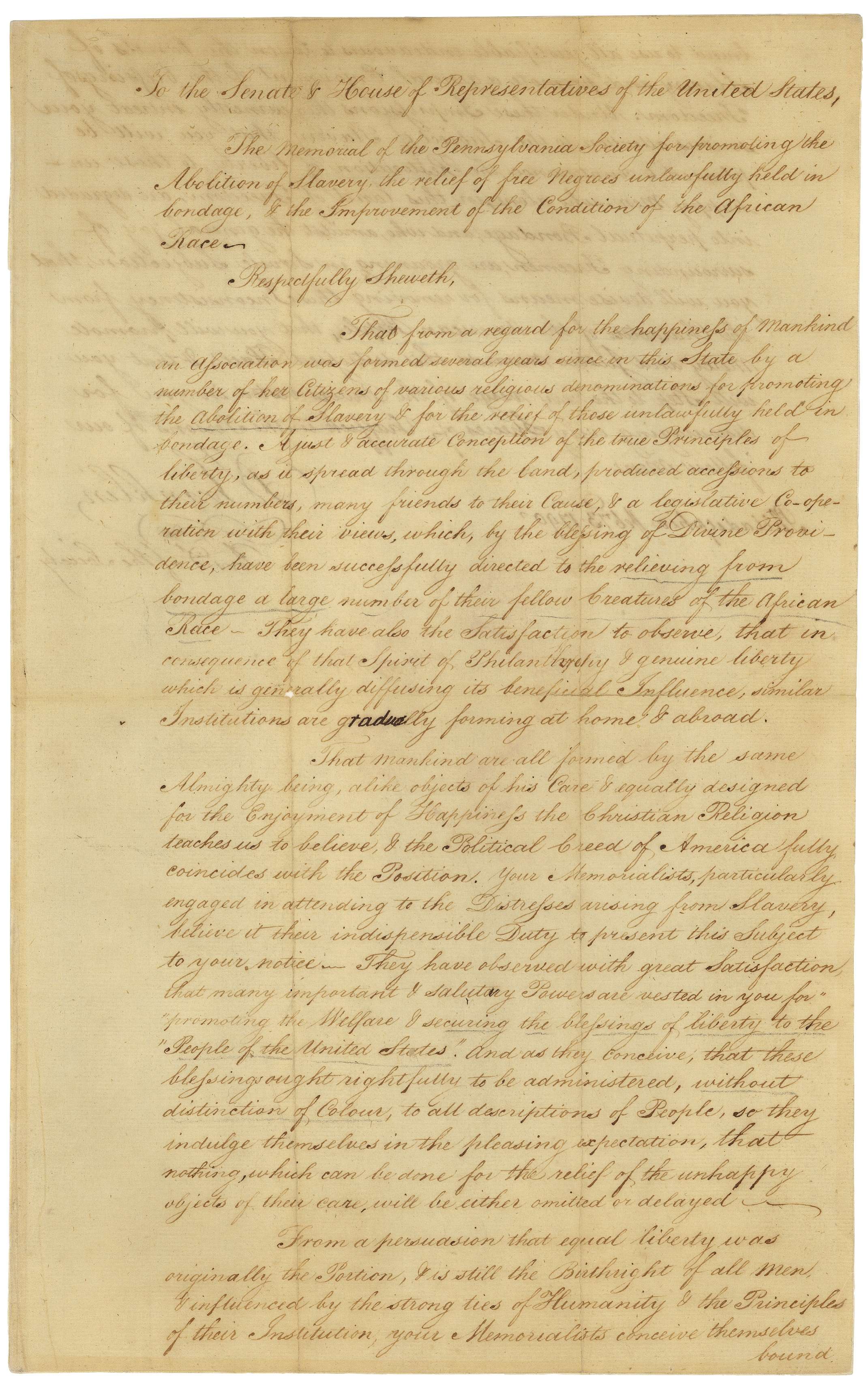
Letter from Benjamin Franklin Transmitting a Letter from James Pemberton and a Petition from the Pennsylvania Society for Promoting the Abolition of Slavery to Vice President John Adams
Page 2
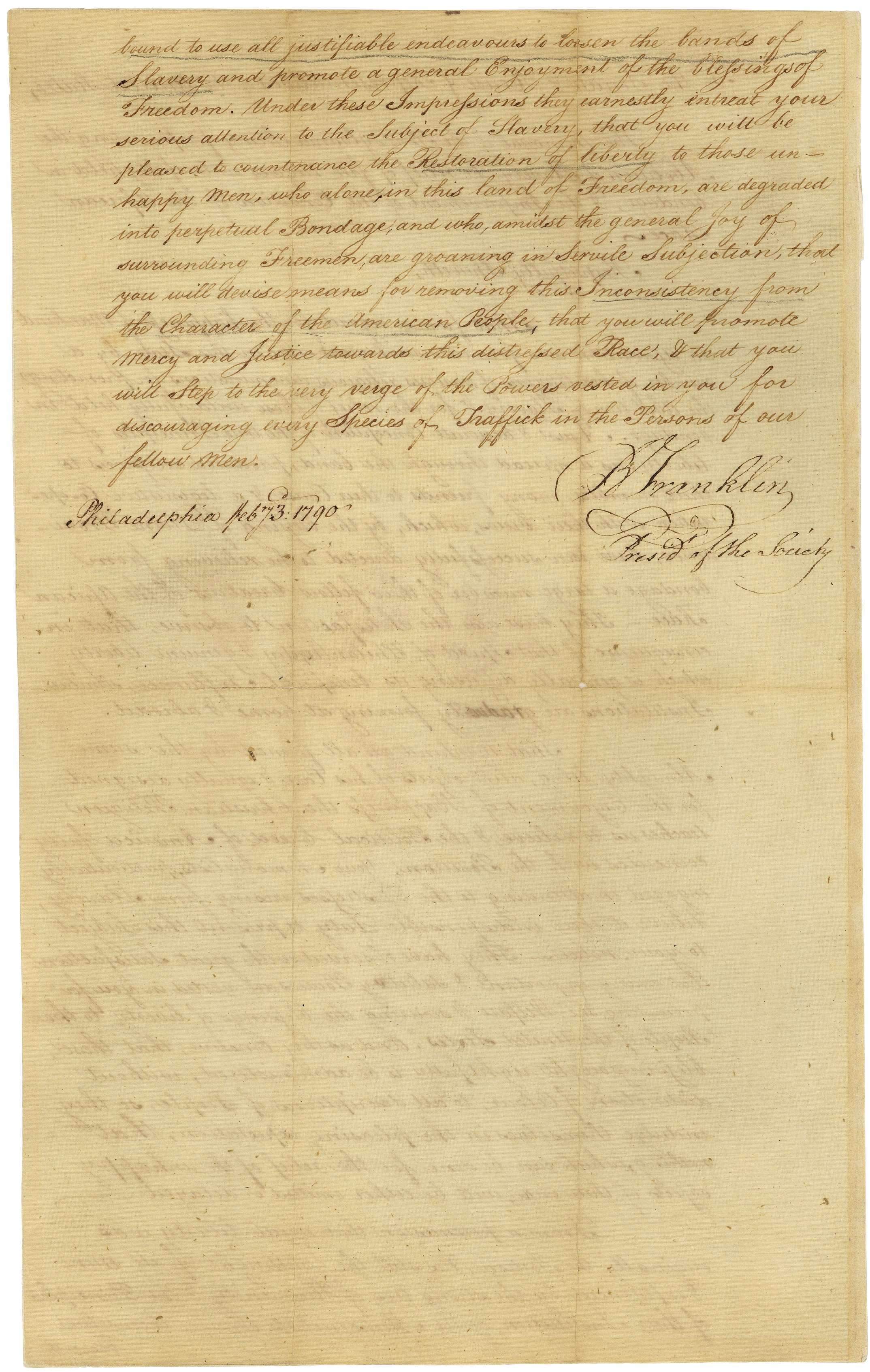
Letter from Benjamin Franklin Transmitting a Letter from James Pemberton and a Petition from the Pennsylvania Society for Promoting the Abolition of Slavery to Vice President John Adams
Page 3
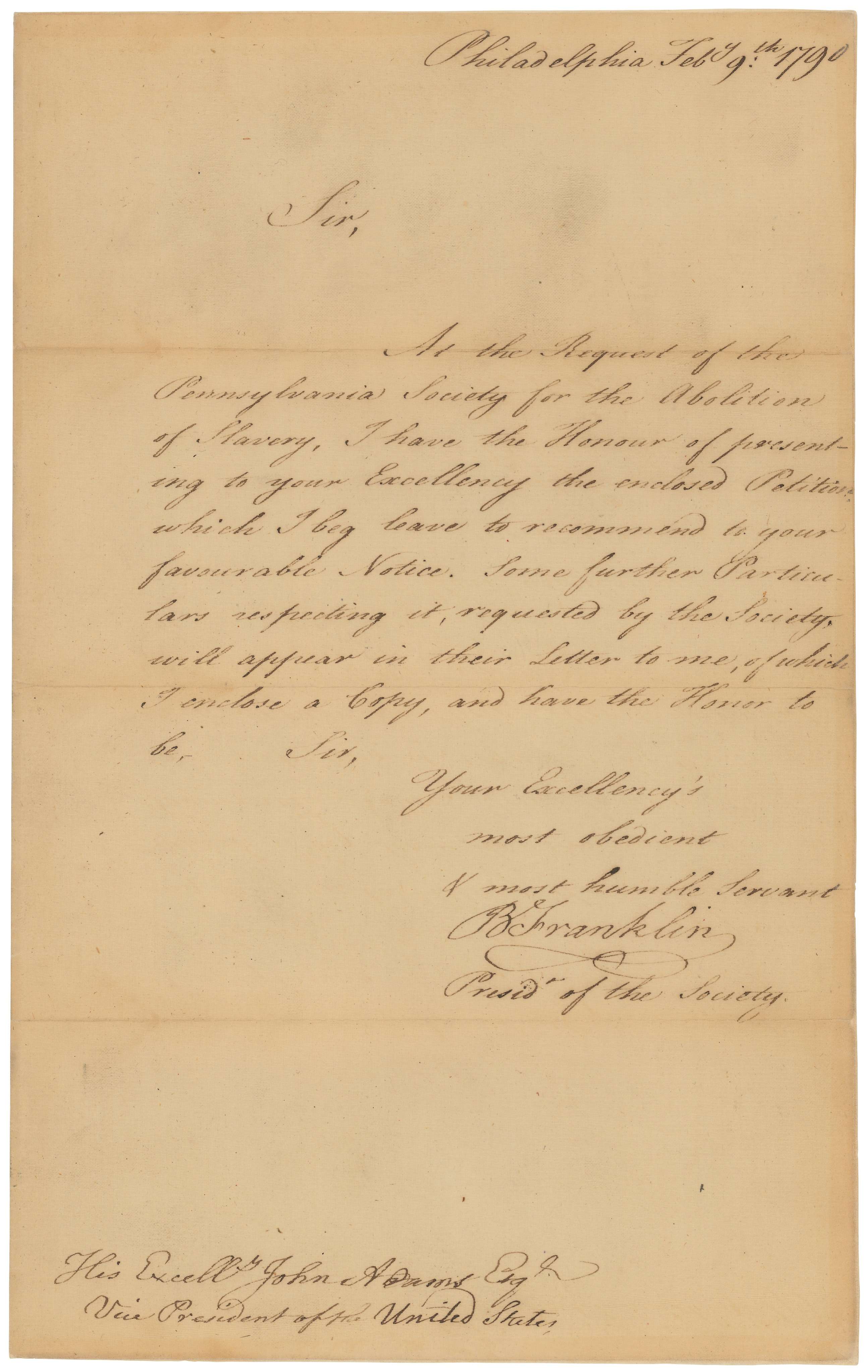
Letter from Benjamin Franklin Transmitting a Letter from James Pemberton and a Petition from the Pennsylvania Society for Promoting the Abolition of Slavery to Vice President John Adams
Page 4
